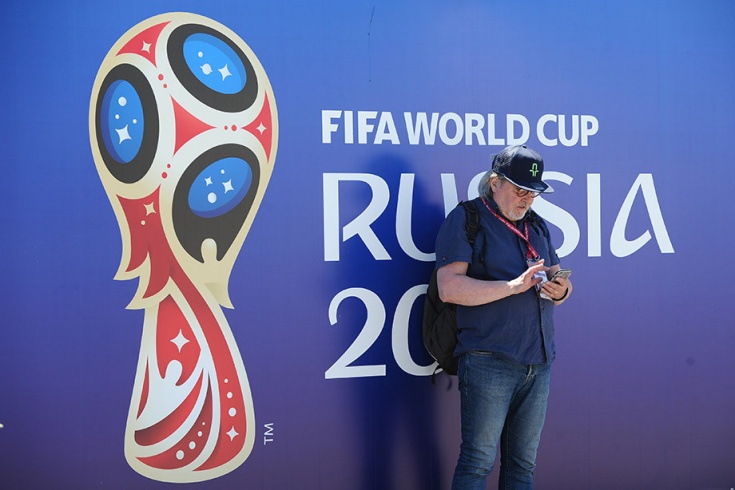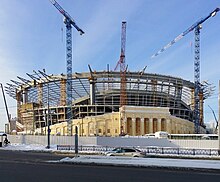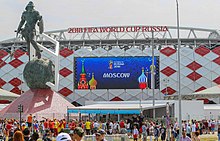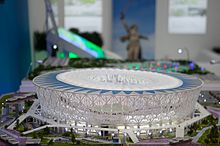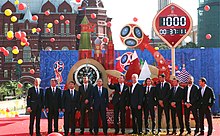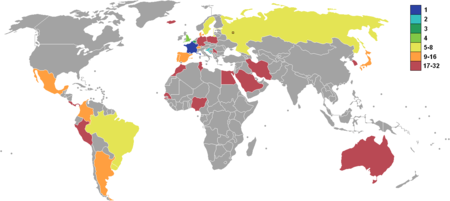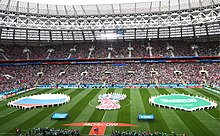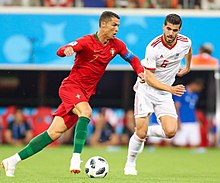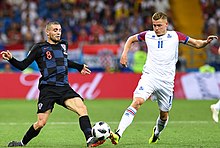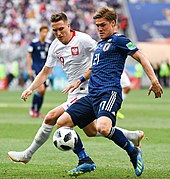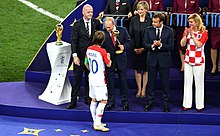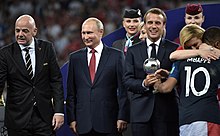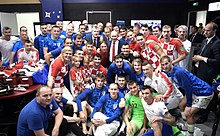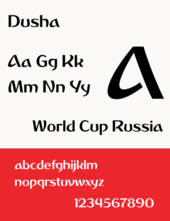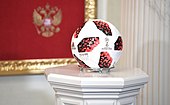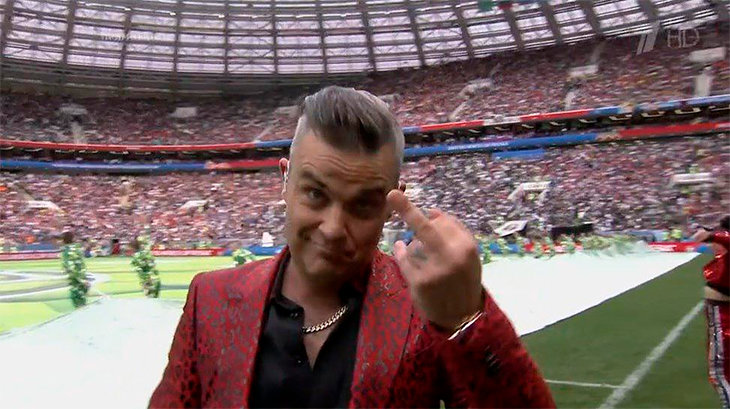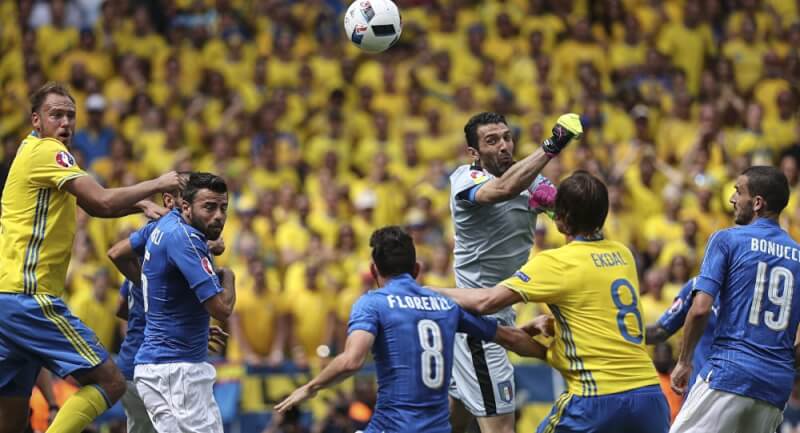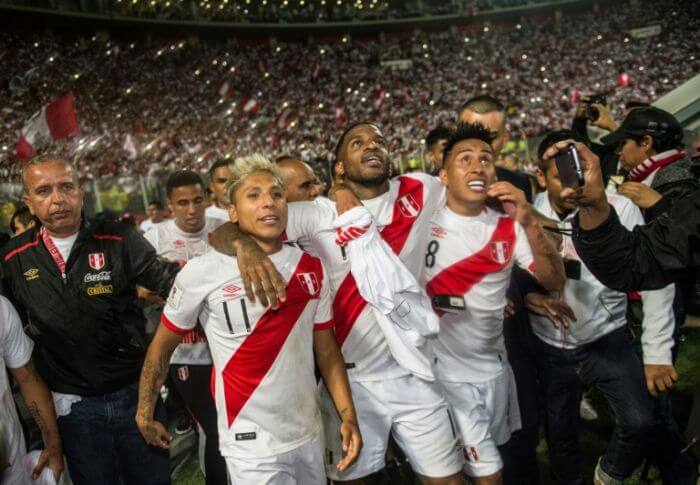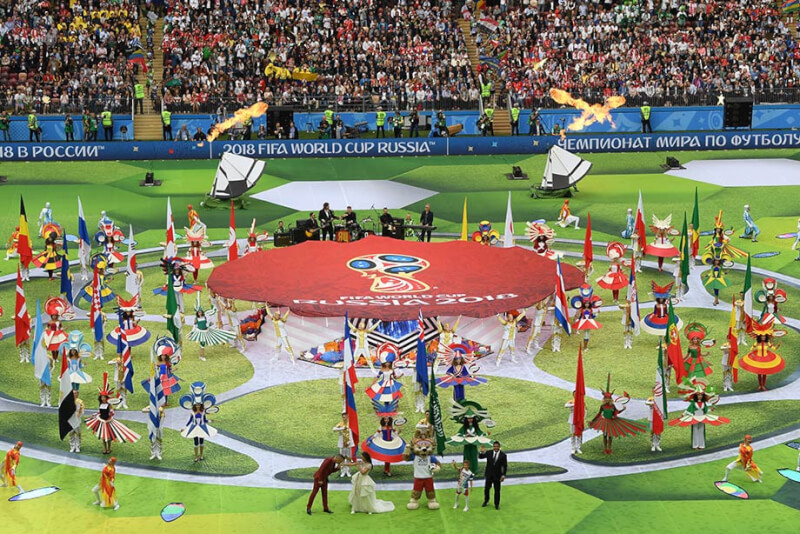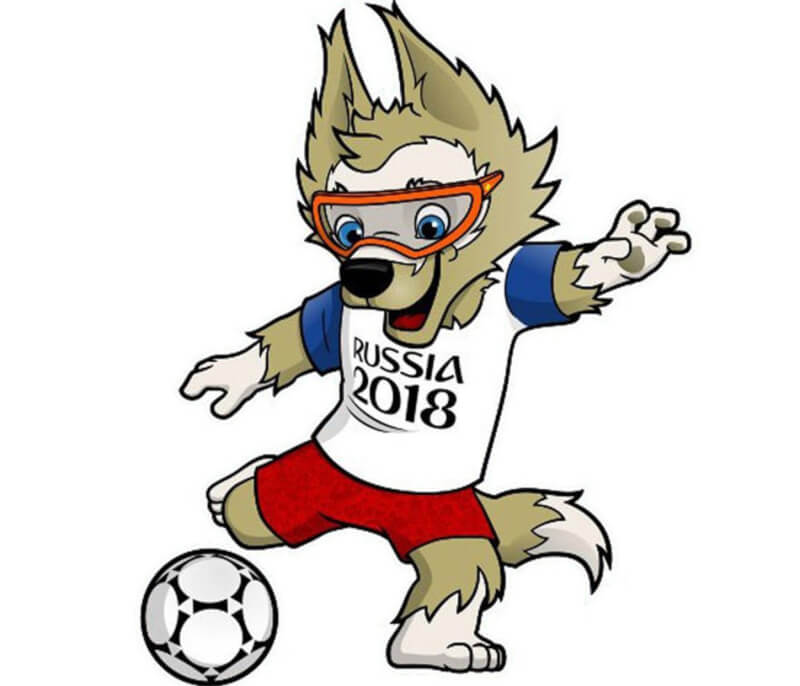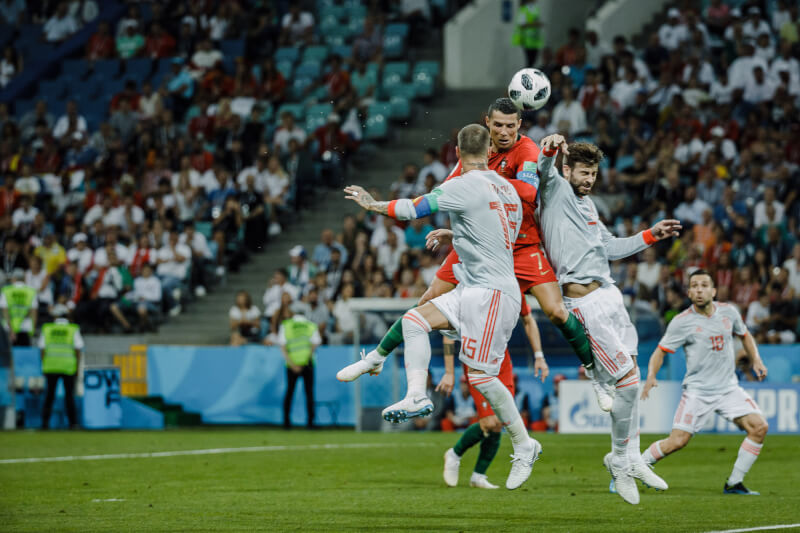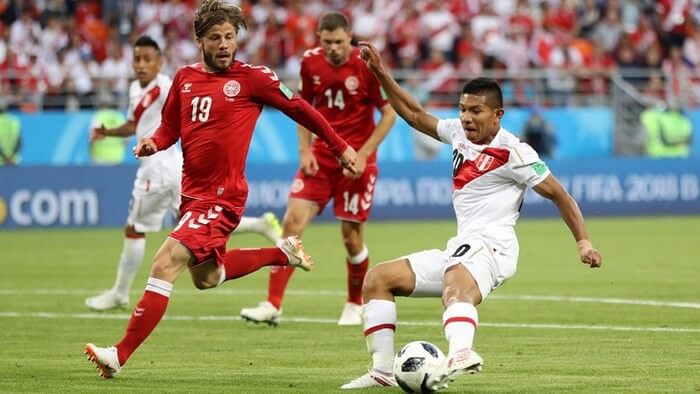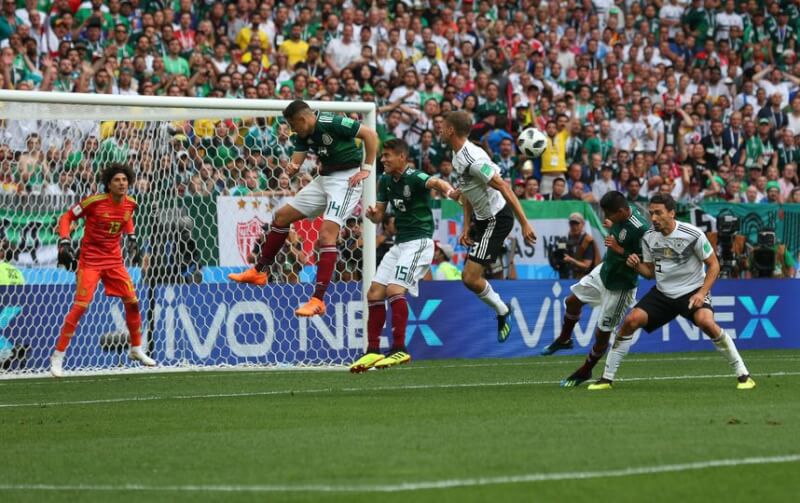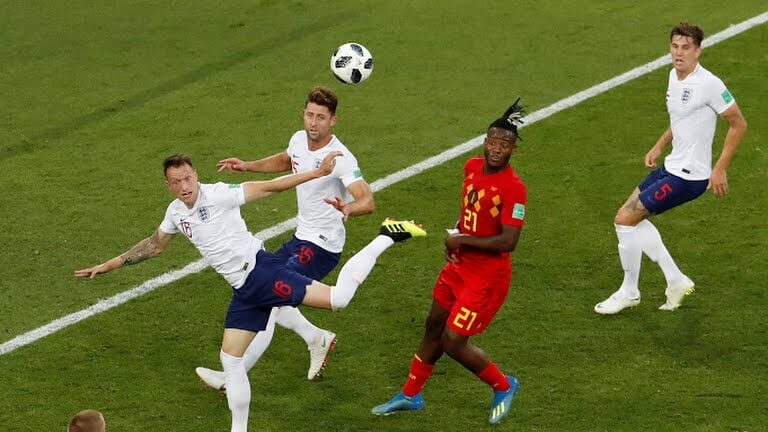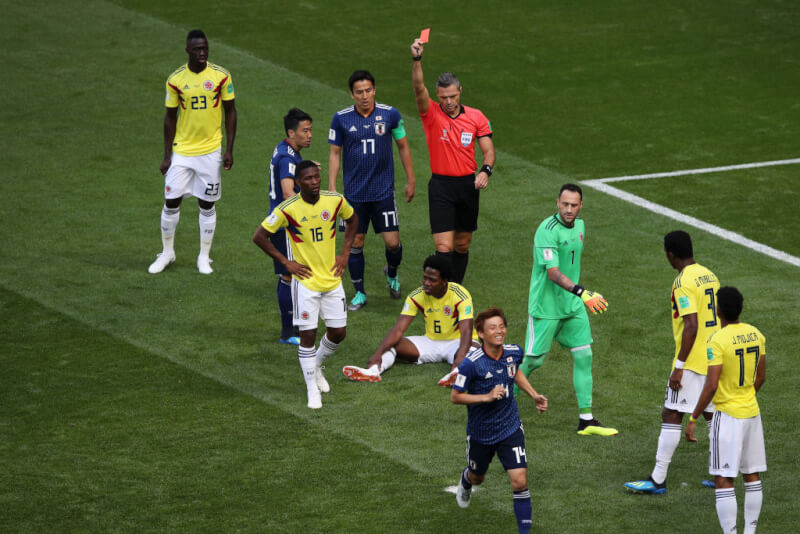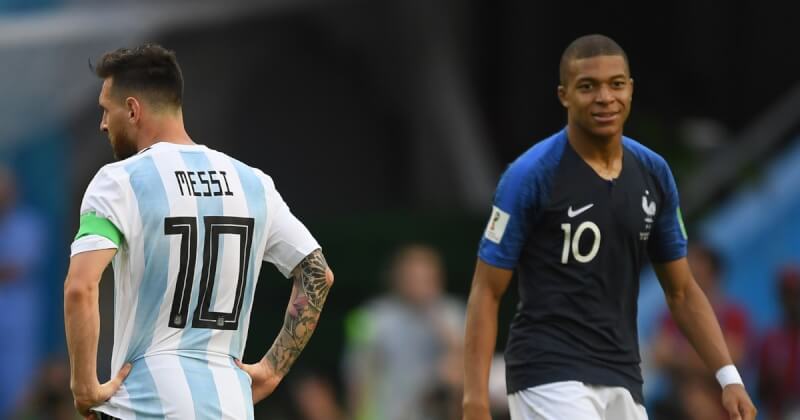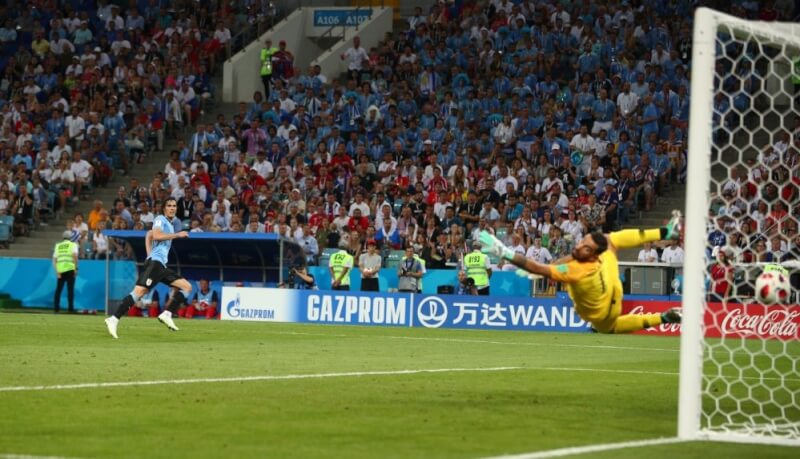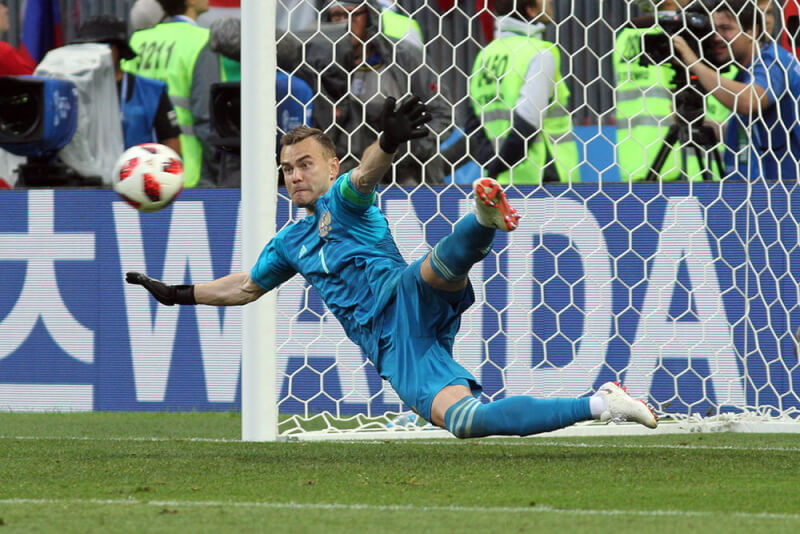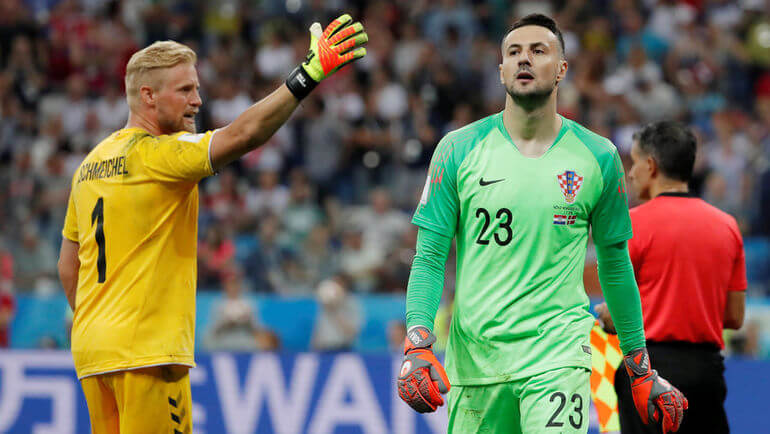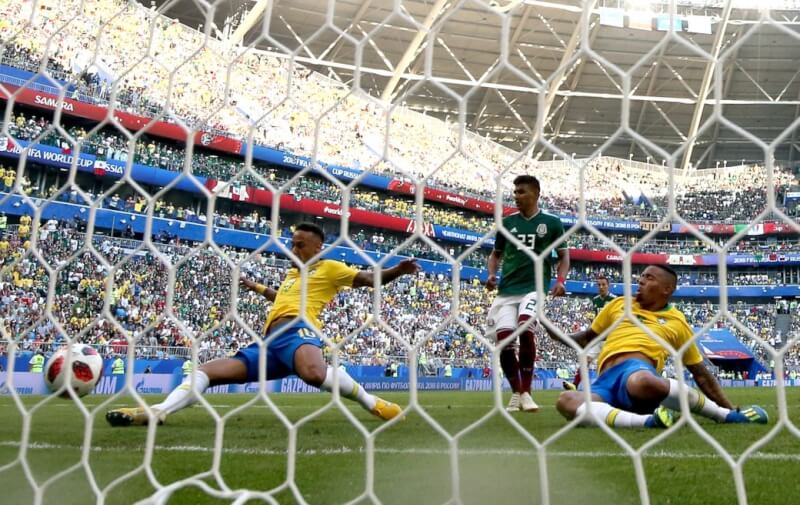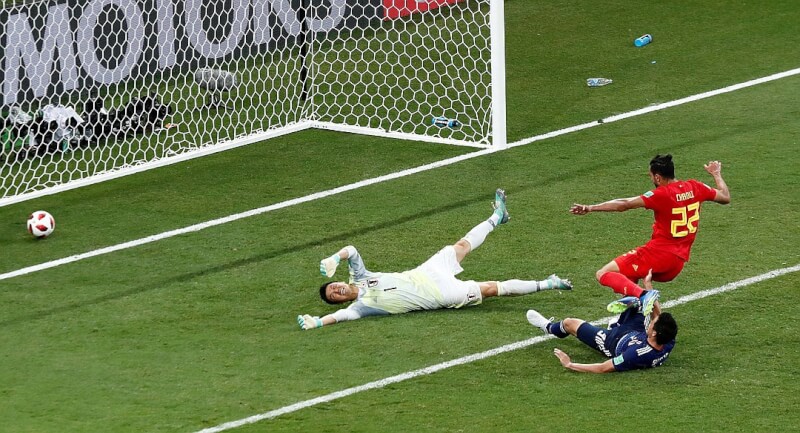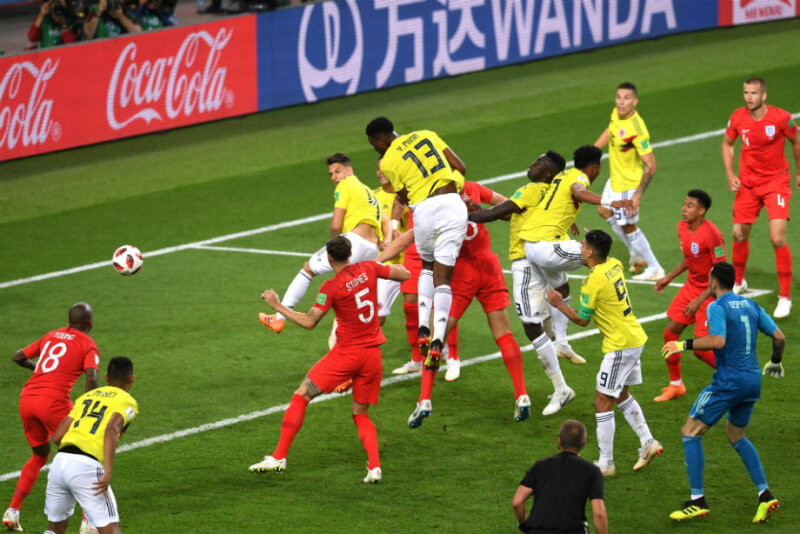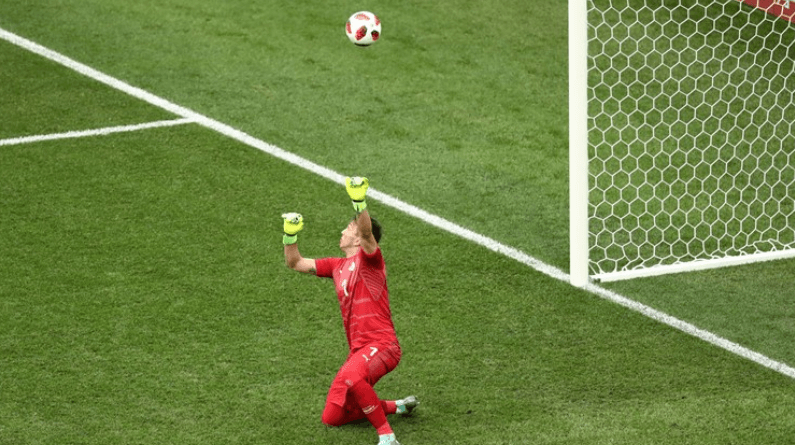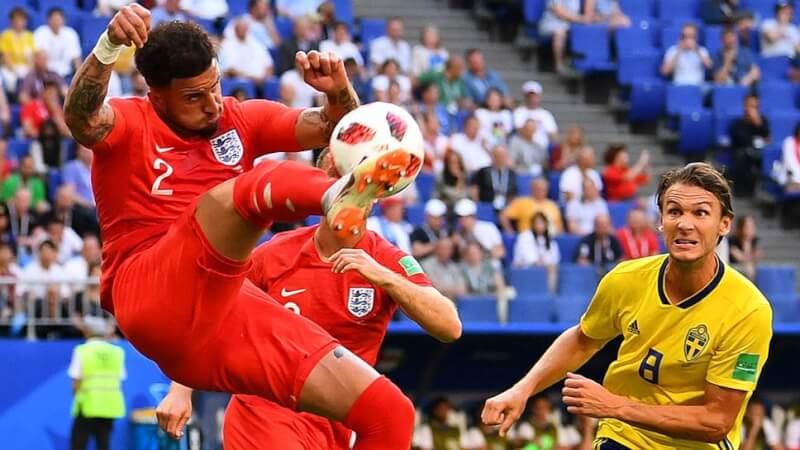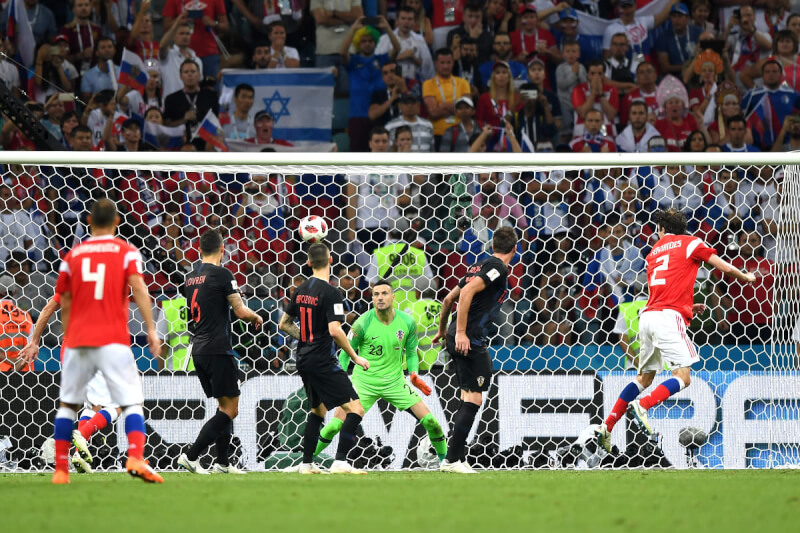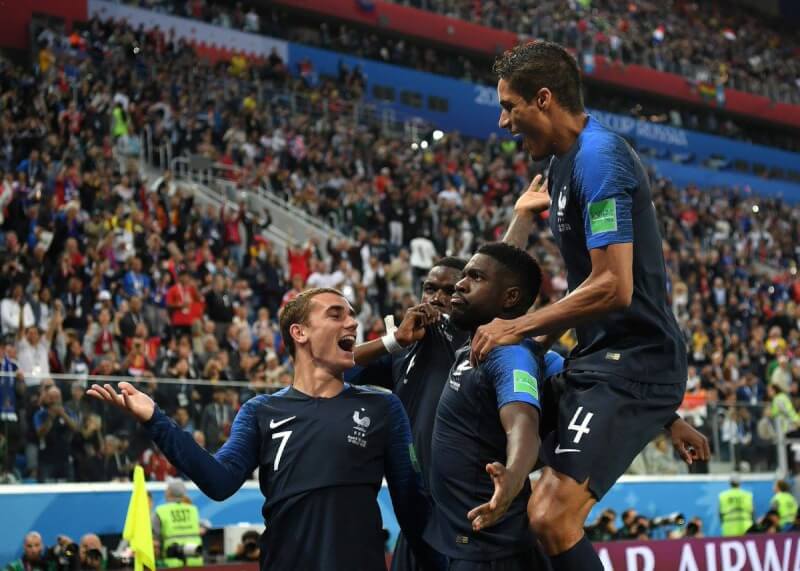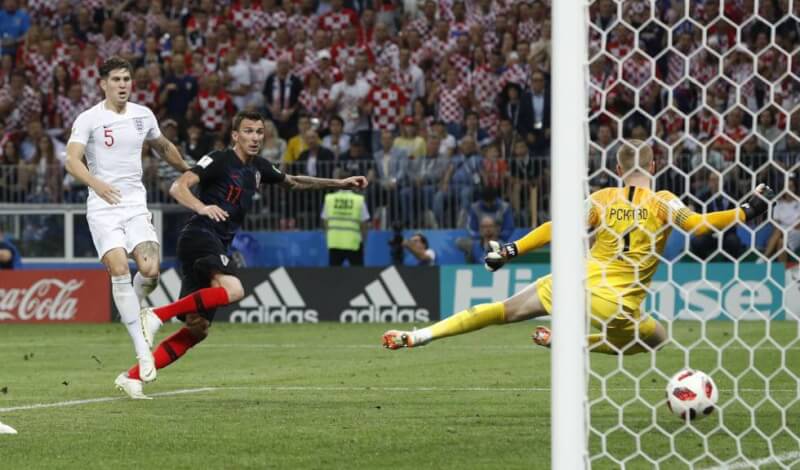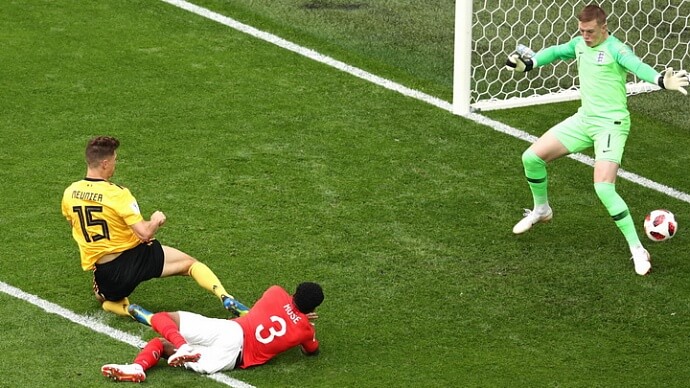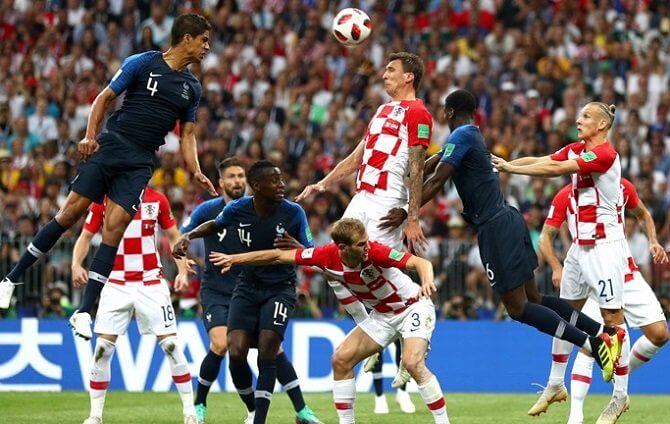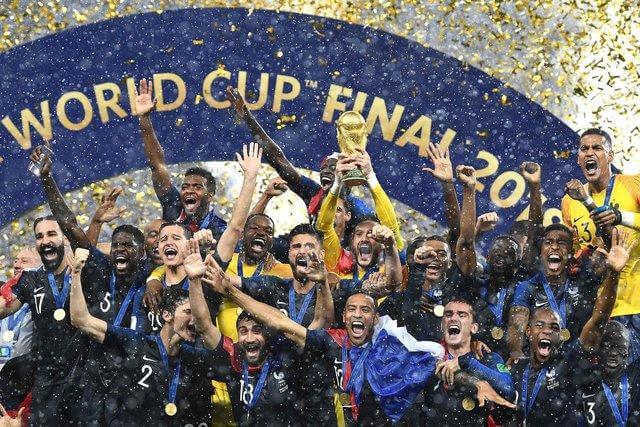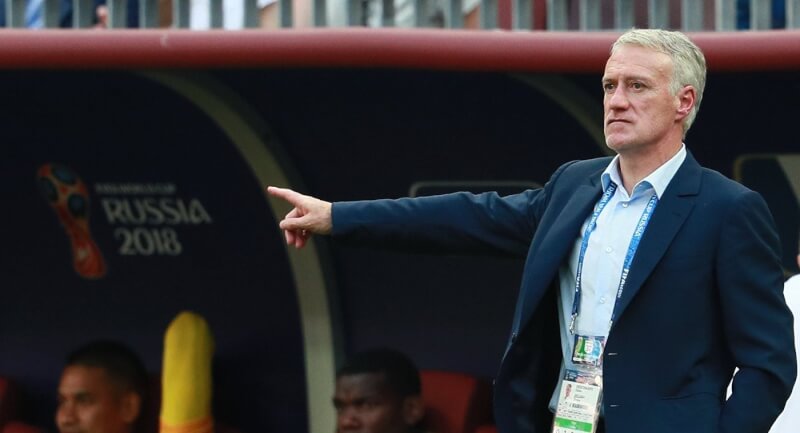18 марта 2009 года ФИФА заявила, что на проведение чемпионатов 2018/2022 годов было принято 9 заявок, которые подали: Австралия, Англия, Индонезия, Мексика, Россия, США, Япония, Также было подано две совместные заявки: от Португалии и Испании и вторая — от Бельгии и Нидерландов.
ФИФА, руководствуясь действующим положением о ротации континентов, из числа претендентов были исключены Австралия, Индонезия, Мексика, США и Япония. Таким образом, в голосовании приняли участие четыре заявки: от России, Англии и две совместные заявки: от Испании — Португалии и от Бельгии — Нидерландов.
2 декабря 2010 года в Цюрихе по результатам голосования было принято решение отдать России право проведения чемпионата мира 2018 года. Россия победила уже во втором туре, набрав более половины голосов:
| Страны-претенденты | Первый тур | Второй тур |
|
Россия |
9 | 13 |
|
Испания /
Португалия |
7 | 7 |
|
Нидерланды /
Бельгия |
4 | 2 |
|
Англия |
2 | — |
Выбор места проведения ЧМ 2026
На прошедшем 13 июня 2018 года в Москве 68-м Конгрессе ФИФА было принято решение о месте проведения финального турнира чемпионата мира по футболу 2026 года. Финальная часть турнира пройдет летом 2026 года сразу в трех странах — в США, Канаде и Мексике.
Матчи турнира состоятся в 23 городах:
— в 17 городах США (Нью-Йорк/Нью-Джерси, Филадельфия, Балтимор, Вашингтон, Бостон, Цинциннати, Нэшвилл, Атланта, Орландо, Майами, Хьюстон, Даллас, Лос-Анджелес, Сан-Франциско, Денвер, Канзас-Сити, Сиэтл),
— в 3-х городах Канады (Эдмонтон, Торонто, Монреаль),
— в 3-х городах Мексики (Мехико, Гвадалахара, Монтеррей).
Матчи чемпионата мира примут 11 городов Российской Федерации: Москва, Калининград, Санкт-Петербург, Волгоград, Казань, Нижний Новгород, Самара, Саранск, Ростов-на-Дону, Сочи и Екатеринбург. Матчи будут проводиться на 12 стадионах.
Стадионы
| № | Город | Название стадиона | Вместимость, в тыс. чел. |
| 1 | Москва | «Лужники» | 84 745 |
| 2 | Москва | «Открытие Арена» | 45 360 |
| 3 | Санкт-Петербург | «Санкт-Петербург» | 68 134 |
| 4 | Казань | «Казань Арена» | 45 105 |
| 5 | Екатеринбург | «Екатеринбург Арена» | 35 000 |
| 6 | Саранск | «Мордовия Арена» | 45 015 |
| 7 | Самара | «Самара Арена» | 44 918 |
| 8 | Сочи | «Фишт» | 47 659 |
| 9 | Ростов-на-Дону | «Ростов Арена» | 45 000 |
| 10 | Калининград | «Калининград» | 35 015 |
| 11 | Нижний Новгород | «Нижний Новгород» | 44 899 |
| 12 | Волгоград | «Волгоград Арена» | 45 015 |
Распределение матчей по стадионам
24 июня 2015 года ФИФА опубликовала предварительный календарь проведения финального турнира чемпионата мира по футболу 2018 года.
Матч открытия чемпионата мира 2018 года, в котором примет участие сборная России состоится 14 июня на московском стадионе «Лужники». Два других матча группового турнира россияне проведут в Санкт-Петербурге (19 июня) и в Самаре (25 июня).
В том случае, если наша сборная займет в группе А первое место, свой матч 1/8 финала против второй команды группы В она проведет 30 июня в Сочи. Если наша команда займет в своей группе второе место, то матч 1/8 финала она проведет 1 июля на стадионе «Лужники» против команды, занявшей в группе В первое место.
Остальные матчи 1/8 финала чемпионата мира пройдут в Москве на стадионах «Лужники» и «Открытие Арена», а также в Санкт-Петербурге, Казани, Сочи, Нижнем Новгороде, Ростове-на-Дону и Самаре.
Матчи 1/4 финала пройдут 6–7 июля в Казани, Нижнем Новгороде, Самаре и Сочи.
Полуфинальные матчи состоятся в Санкт-Петербурге — 10 июля и в Москве на стадионе «Лужники» — 11 июля.
Матч за третье место пройдет 14 июля в Санкт-Петербурге.
Финальный матч пройдет 15 июля в Москве на стадионе «Лужники».
«Волгоград Арена»
18 июня — Группа G. 1-й тур Тунис — Англия 1:2
22 июня — Группа D. 2-й тур Нигерия — Исландия 2:0
25 июня — Группа A. 3-й тур Саудовская Аравия — Египет 2:1
28 июня — Группа H. 3-й тур Япония — Польша 0:1
«Екатеринбург Арена»
15 июня — Группа A. 1-й тур Египет — Уругвай 0:1
21 июня — Группа C. 2-й тур Франция — Перу 1:0
24 июня — Группа H. 2-й тур Япония — Сенегал 2:2
27 июня — Группа F. 3-й тур Мексика — Швеция 0:3
«Казань Арена»
16 июня — Группа C. 1-й тур Франция — Австралия 2:1
20 июня — Группа B. 2-й тур Иран — Испания 0:1
24 июня — Группа H. 2-й тур Польша — Колумбия 0:3
27 июня — Группа F. 3-й тур Южная Корея — Германия 2:0
30 июня — 1/8 финала. Франция — Аргентина 4:3
6 июля — 1/4 финала Бразилия — Бельгия 1:2
«Калининград Арена»
16 июня — Группа D. 1-й тур Хорватия — Нигерия 2:0
22 июня — Группа E. 2-й тур Сербия — Швейцария 1:2
25 июня — Группа B. 3-й тур Испания — Марокко 2:2
28 июня — Группа G. 3-й тур Англия — Бельгия 0:1
«Лужники» (Москва)
14 июня — Группа A. 1-й тур Россия — Саудовская Аравия (матч открытия) 5:0
17 июня — Группа F. 1-й тур Германия — Мексика 0:1
20 июня — Группа B. 2-й тур Португалия — Марокко 1:0
26 июня — Группа C. 3-й тур Дания — Франция 0:0
1 июля — 1/8 финала. Испания — Россия 1:1 (3:4) П
11 июля — Полуфинал. Хорватия — Англия 2:1 ДВ
15 июля — Финал чемпионата. Франция — Хорватия 4:2
«Мордовия Арена»
16 июля — Группа C. 1-й тур Перу — Дания 0:1
19 июня — Группа H. 1-й тур Колумбия — Япония 1:2
25 июня — Группа B. 3-й тур Иран — Португалия 1:1
28 июня — Группа G. 3-й тур Панама — Тунис 1:2
«Нижний Новгород»
18 июня — Группа F. 1-й тур Швеция — Южная Корея 1:0
21 июня — Группа D. 2-й тур Аргентина — Хорватия 0:3
24 июня — Группа G. 2-й тур Англия — Панама 6:1
27 июня — Группа E. 3-й тур Швейцария — Коста-Рика 2:2
1 июля — 1/8 финала. Хорватия — Дания 1:1 (3:2) П
6 июля — 1/4 финала Уругвай — Франция 0:2
«Открытие Арена» (Москва)
16 июня — Группа D. 1-й тур Аргентина — Исландия 1:1
19 июня — Группа H. 1-й тур Польша — Сенегал 1:2
23 июня — Группа G. 2-й тур Бельгия — Тунис 5:2
27 июня — Группа E. 3-й тур Сербия — Бразилия 0:2
3 июля — 1/8 финала. Колумбия — Англия 1:1 (3:4) П
«Ростов Арена»
17 июня — Группа E. 1-й тур Бразилия — Швейцария 1:1
20 июня — Группа A. 2-й тур Уругвай — Саудовская Аравия 1:0
23 июня — Группа F. 2-й тур Южная Корея — Мексика 1:2
26 июня — Группа D. 3-й тур Исландия — Хорватия 1:2
2 июля — 1/8 финала Бельгия — Япония 3:2
«Самара Арена»
17 июня — Группа E. 1-й тур Коста-Рика — Сербия 0:1
21 июня — Группа C. 2-й тур Дания — Австралия 1:1
25 июня — Группа A. 3-й тур Уругвай — Россия 3:0
28 июня — Группа H. 3-й тур Сенегал — Колумбия 0:1
2 июля — 1/8 финала. Бразилия — Мексика 2:0
7 июля — 1/4 финала Швеция — Англия 0:2
«Санкт-Петербург»
15 июня — Группа B. 1-й тур Марокко — Иран 0:1
19 июня — Группа A. 2-й тур Россия — Египет 3:1
22 июня — Группа E. 2-й тур Бразилия — Коста-Рика 2:0
26 июня — Группа D. 3-й тур Нигерия — Аргентина 1:2
3 июля — 1/8 финала. Швеция — Швейцария 1:0
10 июля — Полуфинал. Франция — Бельгия 1:0
14 июля — Матч за 3-е место Бельгия — Англия 2:0
«Фишт» (Сочи)
15 июня — Группа B. 1-й тур Португалия — Испания 3:3
18 июня — Группа G. 1-й тур Бельгия — Панама 3:0
23 июня — Группа F. 2-й тур Германия — Швеция 2:1
26 июня — Группа C. 3-й тур Австралия — Перу 0:2
30 июня — 1/8 финала. Уругвай — Португалия 2:1
7 июля — 1/4 финала Россия — Хорватия 2:2 (3:4) П
Эмблема турнира
Эмблема чемпионата мира по футболу 2018
В октябре 2014 года в эфире Первого канала в программе «Вечерний Ургант» была представлена официальная эмблема чемпионата мира по футболу 2018 года. В мероприятии представления символики турнира приняли участие президент ФИФА Йозеф Блаттер, министр спорта России Виталий Мутко и лучший футболист мира 2006 года итальянец Фабио Каннаваро.
Как указано в пресс-релизе оргкомитета турнира в основу логотипа вошли три составляющих — покорение космоса, иконопись и любовь к футболу. Внеше логотип ЧМ 2018 года напоминает силуэт Кубка мира ФИФА.
Талисман чемпионата
В июне 2015 года оргкомитетом «Россия 2018» по результатам онлайн-опроса, проведенного с 1 по 31 мая были отобраны 10 самых популярных персонажей, которых жители России хотят видеть в качестве талисмана чемпионата мира по футболу 2018 года.
Выбор официального талисмана проходил в несколько этапов. На первом этапе были выбраны 10 вариантов талисмана — кот, амурский тигр, волк, богатырь, дальневосточный леопард, жар-птица, инопланетянин, космонавт, медведь и робот. После этого студенты 57 российских художественных вузов принимали участие в конкурсе и представили свои эскизы для дизайна талисмана.
Всероссийское голосование по выбору талисмана чемпионата мира стартовало 23 сентября 2016 года и продолжалось почти месяц. В голосовании приняли участие более миллиона человек.
- Кот — автор Софья Подлесных (Новогородский государственный университет имени Ярослава Мудрого)
- Тигр — автор Валерия Табуренко (Санкт-Петербургский университет промышленных технологий и дизайна)
- Волк — автор Екатерина Бочарова (Томский государственный университет).
По результатам голосования российских болельщиков официальным талисманом чемпионата мира по футболу 2018 года был выбран волк Забивака. В ходе голосования Волк Забивака 52, 8% голосов, Тигр — 26, 8%, Кот — 20, 4%.
Презентация талисмана ЧМ-2018 прошла 21 октября 2016 года в прямом эфире программы Первого канала «Вечерний Ургант».
1 июня 2018 года ФИФА представила официальную заставку чемпионата мира 2018 года (официальный канал ФИФА в YouTube).
25 июля 2015 года в Константиновском дворце Санкт-Петербурга состоялась жеребьевка отборочного турнира чемпионата мира по футболу 2018 года. Сборная России попала в группу «H», в которую также вошли Бельгия, Греция, Босния и Герцеговина, Эстония и Кипр.
Результаты нашей команды при определении победителя группы и распределении остальных мест учитываться не будут. Таким образом, наша команда проведет товарищеские матчи с европейскими командами, которые войдут в план подготовки сборной к финальному турниру.
Это второй случай в истории проведении отборочных игр, в которых принимает участие команда, которая является хозяйкой мирового первенства. Ранее, в 1934 году, в отборочном турнире участвовала сборная Италии, но тогда ее результаты учитывались при распределении мест.
Состав участников мирового первенства
15 ноября 2017 года после завершения всех стыковых матчей стали известны все 32 национальные сборные, получившие право принять участие в чемпионате мира 2018 года.
Все 32 сборные распределены по четырем корзинам в соответствии с рейтингом ФИФА. Сборная России оказалась худшей командой по рейтингу среди всех команд, которые примут участие в финальной стадии чемпионата мира 2018 года. По состоянию на ноябрь 2017 года российская сборная занимала в рейтинге 65-е место, однако попала в первую корзину на правах хозяйки турнира. Если бы чемпионат мира проводился не в России, то наша команда попала бы в четвертую корзину.
Распределение команд по корзинам перед жеребьевкой:
Корзина А: Россия, Германия, Бразилия, Португалия, Аргентина, Бельгия, Польша, Франция.
Корзина В: Испания, Перу, Швейцария, Англия, Колумбия, Хорватия, Мексика, Уругвай.
Корзина С: Дания, Швеция, Исландия, Коста-Рика, Тунис, Египет, Сенегал, Иран.
Корзина D: Сербия, Нигерия, Япония, Марокко, Панама, Южная Корея, Саудовская Аравия, Австралия.
Жеребьевка группового этапа мирового первенства состоялась в Москве в Кремлевском Дворце съездов 1 декабря 2017 года.
Девизы сборных команд-участниц турнира
24 мая 2018 года пресс-служба ФИФА объявила девизы всех 32 команд-участниц финального турнира чемпионата мира.
Слоган сборной России — «Играй с открытым сердцем».
Предварительный состав
11 мая 2018 года тренерский штаб сборной России обнародовал расширенный состав команды для подготовки к чемпионату мира по футболу 2018. В состав списка включено 35 футболистов для расширенной заявки по регламенту ФИФА. Из них 28 уже вызваны на учебно-тренировочный сбор на базе Новогорск.
Главный тренер сборной России Станислав Черчесов назначил капитаном сборной вратаря Игоря Акинфеева.
14 мая стало известно, что после полученной в последнем туре чемпионат России травмы, защитник «Рубина» Руслан Камболов не сможет выступить в составе сборной. Вместо него тренерский штаб вызвал в состав команды защитника ЦСКА Сергея Игнашевича..
|
Игроки, вызванные на сбор |
Резервный список |
|
Вратари: |
|
|
|
|
Защитники: |
|
|
|
|
Полузащитники: |
|
|
|
|
Нападающие: |
|
|
|
Примечания:
* Вместо Руслана Камболова, получившего травму, 14 мая в состав сборной был вызван Сергей Игнашевич.
Окончательный состав
3 июня 2018 года тренерский штаб национальной сборной России обнародовал окончательный состав команды для участия в чемпионате мира. В него вошли 23 футболиста.
Вратари: Игорь Акинфеев (ЦСКА Москва), Владимир Габулов («Брюгге» Бельгия), Андрей Лунёв («Зенит» Санкт-Петербург).
Защитники: Владимир Гранат («Рубин» Казань), Сергей Игнашевич (ЦСКА Москва), Фёдор Кудряшов («Рубин» Казань), Илья Кутепов («Спартак» Москва), Андрей Семёнов («Ахмат» Грозный), Игорь Смольников («Зенит» Санкт-Петербург), Марио Фернандес (ЦСКА Москва).
Полузащитники: Юрий Газинский («Краснодар»), Александр Головин (ЦСКА Москва), Алан Дзагоев (ЦСКА Москва), Александр Ерохин («Зенит» Санкт-Петербург), Юрий Жирков («Зенит» Санкт-Петербург), Роман Зобнин («Спартак» Москва), Далер Кузяев («Зенит» Санкт-Петербург), Антон Миранчук («Локомотив» Москва), Александр Самедов («Спартак» Москва), Денис Черышев («Вильярреал» Испания).
Нападающие: Артём Дзюба («Арсенал» Тула), Алексей Миранчук («Локомотив» Москва), Фёдор Смолов («Краснодар»).
Из предварительного расширенного списка в основной состав не вошли 5 футболистов: Сослан Джанаев («Рубин»), Роман Нойштедтер («Фенербахче»), Константин Рауш, Александр Ташаев (оба — «Динамо») и Федор Чалов (ЦСКА).
В 2018 году формат финального турнира вновь остается без изменений — 32 команды, получившие право выступить в финальном турнире, разделены на 8 групп, по 4 команды в каждой. В стадию плей-офф выходят 16 команд, из которых: 8 победителей групп и 8 команд, занявших второе место.
На стадии плей-офф соревнования будут традиционно проводиться по олимпийской системе (с выбыванием) — 1/8 финала, 1/4 финала, полуфиналы, матч за 3-е место и финал.
Система видеоповторов
На нынешнем турнире впервые в истории проведения чемпионатов мира будет использоваться система видеоповторов. Система видеопомощи арбитрам (VAR) впервые на высшем уровне была обкатана на Кубке Конфедераций, проходившем также в России летом 2017 года.
Справка:
Система видеопомощи арбитрам (VAR) может быть использована в четырех случаях:
1. При забитых голах (помогает определить — пересек ли мяч линию ворот, а также не был ли он забит рукой…).
2. При удалениях (подсказывает кому и за что стоит показать красную карточку, помогает правильно определить вину всех футболистов участвовавших в конфликте на поле).
3. При назначении пенальти (определение степени вины футболиста, а также не было ли провокации со стороны упавшего игрока — так называемого.«нырка»).
4. При определение офсайда.
Главный судья может воспользоваться одним из двух вариантов для использования системы. Первый вариант — обратиться к повтору самостоятельно и просмотреть повтор эпизода на компьютере. Второй — воспользоваться подсказкой видео-ассистента по беспроводной связи.
Группа A
| № | Команды | 1 | 2 | 3 | 4 | В | Н | П | мячи | очки |
| 1 |
Уругвай |
3:0 | 1:0 | 1:0 | 3 | 0 | 0 | 5-0 | 9 | |
| 2 |
Россия |
0:3 | 5:0 | 3:1 | 2 | 0 | 1 | 8-4 | 6 | |
| 3 |
Саудовская Аравия |
0:1 | 0:5 | 2:1 | 1 | 0 | 1 | 2-7 | 3 | |
| 4 |
Египет |
0:1 | 1:3 | 1:2 | 0 | 0 | 3 | 2-6 | 0 |
Все матчи группы A
| Дата | Место | Матч | Голы |
| 14.06.2018 | «Лужники», Москва | Россия – Саудовская Аравия 5:0 | Газинский (12′); Черышев (43′, 90+1′); Дзюба (71′); Головин (90+4′) |
| 15.06.2018 | «Екатеринбург Арена» | Египет – Уругвай 0:1 | Хименес (90′) |
| 19.06.2018 | Санкт-Петербург | Россия – Египет 3:1 | Фатхи (47′) А; Черышев (59′); Дзюба (62′) — Салах (73′) П |
| 20.06.2018 | «Ростов Арена» | Уругвай – Саудовская Аравия 1:0 | Суарес (23′) |
| 25.06.2018 | «Самара Арена», Самара | Уругвай – Россия 3:0 | Суарес (10′); Черышев (23′) А; Кавани (90′) |
| 25.06.2018 | «Волгоград Арена» | Саудовская Аравия – Египет 2:1 | Аль-Фаридж (45+6′) П; Аль-Доссари (90+5′) — Салах (22′) |
Группа B
| № | Команды | 1 | 2 | 3 | 4 | В | Н | П | мячи | очки |
| 1 |
Испания |
3:3 | 1:0 | 2:2 | 1 | 2 | 0 | 6-5 | 5 | |
| 2 |
Португалия |
3:3 | 1:1 | 1:0 | 1 | 2 | 0 | 5-4 | 5 | |
| 3 |
Иран |
0:1 | 1:1 | 1:0 | 1 | 1 | 1 | 2-2 | 4 | |
| 4 |
Марокко |
2:2 | 0:1 | 0:1 | 0 | 1 | 2 | 2-4 | 1 |
Все матчи группы B
| Дата | Место | Матч | Голы |
| 15.06.2018 | «Фишт», Сочи | Португалия – Испания 3:3 | Роналду (4′, 44′, 88′) — Коста (24′, 55′); Начо (58′) |
| 15.06.2018 | Санкт-Петербург | Марокко – Иран 0:1 | Бухаддуз (90+5′) А |
| 20.06.2018 | «Лужники», Москва | Португалия – Марокко 1:0 | Роналду (4′) |
| 20.06.2018 | «Казань Арена» | Иран – Испания 0:1 | Коста (54′) |
| 25.06.2018 | «Мордовия Арена» | Иран – Португалия 1:1 | Ансарифард (90+3′) — Куарежма (45′) |
| 25.06.2018 | «Калининград Арена» | Испания – Марокко | Иско (19′); Аспас (90+1′) — Бутаиб (14′); Эн-Несири (81′) |
Группа C
| № | Команды | 1 | 2 | 3 | 4 | В | Н | П | мячи | очки |
| 1 |
Франция |
0:0 | 1:0 | 2:1 | 2 | 1 | 0 | 3-1 | 7 | |
| 2 |
Дания |
0:0 | 1:0 | 1:1 | 1 | 2 | 0 | 2-1 | 5 | |
| 3 |
Перу |
0:1 | 0:1 | 2:0 | 1 | 0 | 2 | 2-2 | 3 | |
| 4 |
Австралия |
1:2 | 1:1 | 0:2 | 0 | 1 | 2 | 2-5 | 1 |
Все матчи группы C
| Дата | Место | Матч | Голы |
| 16.06.2018 | «Казань Арена» | Франция – Австралия 2:1 | Гризманн (58′) П; Бехич (80′) А — Единак (62′) П |
| 16.06.2018 | «Мордовия Арена» | Перу – Дания 0:1 | Поульсен (24′) |
| 21.06.2018 | «Екатеринбург Арена» | Франция – Перу 1:0 | Мбаппе (34′) |
| 21.06.2018 | «Самара Арена» | Дания – Австралия 1:1 | Эриксен (7′) — Единак (38′) П |
| 26.06.2018 | «Лужники», Москва | Дания – Франция 0:0 | |
| 26.06.2018 | «Фишт», Сочи | Австралия – Перу 0:2 | Каррильо (18′); Герреро (50′) |
Группа D
| № | Команды | 1 | 2 | 3 | 4 | В | Н | П | мячи | очки |
| 1 |
Хорватия |
3:0 | 2:0 | 2:1 | 3 | 0 | 0 | 7-1 | 9 | |
| 2 |
Аргентина |
0:3 | 2:1 | 1:1 | 1 | 1 | 1 | 3-5 | 4 | |
| 3 |
Нигерия |
0:2 | 1:2 | 2:0 | 1 | 0 | 2 | 3-4 | 3 | |
| 4 |
Исландия |
1:2 | 1:1 | 0:2 | 0 | 1 | 2 | 2-5 | 1 |
Все матчи группы D
| Дата | Место | Матч | Голы |
| 16.06.2018 | «Открытие Арена», Москва | Аргентина – Исландия 1:1 | Агуэро (19′),— Финнбогасон (23′) |
| 16.06.2018 | «Калининград Арена» | Хорватия – Нигерия 2:0 | Этебо (32′) А; Модрич (71′) П |
| 21.06.2018 | Нижний Новгород | Аргентина – Хорватия 0:3 | Ребич (53′); Модрич (80′); Ракитич (90+1′) |
| 22.06.2018 | «Волгоград Арена» | Нигерия – Исландия 2:0 | Муса (49′, 75′) |
| 26.06.2018 | Санкт-Петербург | Нигерия – Аргентина 1:2 | Мозес (51′) П — Месси (14′); Рохо (86′) |
| 26.06.2018 | «Ростов Арена» | Исландия – Хорватия 1:2 | Сигурдссон (76′) П — Бадель (53′); Перишич (90′) |
Группа E
| № | Команды | 1 | 2 | 3 | 4 | В | Н | П | мячи | очки |
| 1 |
Бразилия |
1:1 | 2:0 | 2:0 | 2 | 1 | 0 | 5-1 | 7 | |
| 2 |
Швейцария |
1:1 | 2:1 | 2:2 | 1 | 2 | 0 | 5-4 | 5 | |
| 3 |
Сербия |
0:2 | 1:2 | 1:0 | 1 | 0 | 2 | 2-4 | 3 | |
| 4 |
Коста-Рика |
0:2 | 2:2 | 0:1 | 0 | 1 | 2 | 2-5 | 1 |
Все матчи группы E
| Дата | Место | Матч | Голы |
| 17.06.2018 | «Ростов Арена» | Бразилия – Швейцария 1:1 | Коутиньо (20′) — Цубер (50′) |
| 17.06.2018 | «Самара Арена» | Коста-Рика – Сербия 0:1 | Коларов (56′) |
| 22.06.2018 | Санкт-Петербург | Бразилия – Коста-Рика 2:0 | Коутиньо (90+1′); Неймар (90+7′) |
| 22.06.2018 | «Калининград Арена» | Сербия – Швейцария 1:2 | Митрович (5′) — Джака (52′); Шакири (90′) |
| 27.06.2018 | «Открытие Арена» | Сербия – Бразилия 0:2 | Паулиньо (36′); Силва (68′) |
| 27.06.2018 | Нижний Новгород | Швейцария – Коста-Рика 2:2 | Джемаили (31′); Дрмич (88′) — Уостон (56′); Зоммер (90+3′) А |
Группа F
| № | Команды | 1 | 2 | 3 | 4 | В | Н | П | мячи | очки |
| 1 |
Швеция |
3:0 | 1:0 | 1:2 | 2 | 0 | 1 | 5-2 | 6 | |
| 2 |
Мексика |
0:3 | 2:1 | 1:0 | 2 | 0 | 1 | 3-4 | 6 | |
| 3 |
Южная Корея |
0:1 | 1:2 | 2:0 | 1 | 0 | 2 | 3-3 | 3 | |
| 4 |
Германия |
2:1 | 0:1 | 0:2 | 1 | 0 | 2 | 2-4 | 3 |
Все матчи группы F
| Дата | Место | Матч | Голы |
| 17.06.2018 | «Лужники», Москва | Германия – Мексика 0:1 | Лосано (35′) |
| 18.06.2018 | Нижний Новгород | Швеция – Южная Корея 1:0 | Гранквист (65′) П |
| 23.06.2018 | «Фишт», Сочи | Германия – Швеция 2:1 | Ройс (48′); Кроос (90+5′) — Тойвонен (32′) |
| 23.06.2018 | «Ростов Арена» | Южная Корея – Мексика 1:2 | Мин (90+3′) — Вела (26′) П; Эрнандес (66′) |
| 27.06.2018 | «Казань-Арена» | Южная Корея – Германия 2:0 | Квон (90+2′); Мин (90+6′) |
| 27.06.2018 | «Екатеринбург Арена» | Мексика – Швеция 0:3 | Аугустинсон (50′); Гранквист (62′) П; Альварес (74′) А |
Группа G
| № | Команды | 1 | 2 | 3 | 4 | В | Н | П | мячи | очки |
| 1 |
Бельгия |
1:0 | 5:2 | 3:0 | 3 | 0 | 0 | 9-2 | 9 | |
| 2 |
Англия |
0:1 | 2:1 | 6:1 | 2 | 0 | 1 | 8-3 | 6 | |
| 3 |
Тунис |
2:5 | 1:2 | 2:1 | 1 | 0 | 2 | 5-8 | 3 | |
| 4 |
Панама |
0:3 | 1:6 | 1:2 | 0 | 0 | 3 | 2-11 | 0 |
Все матчи группы G
| Дата | Место | Матч | Голы |
| 18.06.2018 | «Фишт», Сочи | Бельгия – Панама 3:0 | Мертенс (47′); Лукаку (69′, 75′) |
| 18.06.2018 | «Волгоград Арена» | Тунис – Англия 1:2 | Сасси (35′) П — Кейн (11′, 90+1′) |
| 23.06.2018 | «Открытие Арена», Москва | Бельгия – Тунис 5:2 | Азар (6′ П, 51); Лукаку (16′, 45+3′); Батшуайи (90′) — Бронн (18′); Хазри (90+3′) |
| 24.06.2018 | Нижний Новгород | Англия – Панама 6:1 | Стоунс (8′, 40′); Кейн (22′ П, 45+1′ П; 62′); Лингард (35′) — Балой (78′) |
| 28.06.2018 | «Калининград Арена» | Англия – Бельгия | Янузай (51′) |
| 28.06.2018 | «Мордовия Арена» | Панама – Тунис | Мерия (33′) А — Юссеф (51′); Хазри (66′) |
Группа H
| № | Команды | 1 | 2 | 3 | 4 | В | Н | П | мячи | очки |
| 1 |
Колумбия |
1:2 | 1:0 | 3:0 | 2 | 0 | 1 | 5:2 | 6 | |
| 2 |
Япония |
2:1 | 2:2 | 0:1 | 1 | 1 | 1 | 4:4 | 4 | |
| 3 |
Сенегал |
0:1 | 2:2 | 2:1 | 1 | 1 | 1 | 4:4 | 4 | |
| 4 |
Польша |
1:2 | 1:0 | 1:2 | 1 | 0 | 2 | 2:5 | 3 |
Все матчи группы H
| Дата | Место | Матч | Голы |
| 19.06.2018 | «Открытие Арена», Москва | Польша – Сенегал 1:2 | Крыховяк (86′) — Сионек (37′) А; Ньянг (60′) |
| 19.06.2018 | «Мордовия Арена» | Колумбия – Япония 1:2 | Кинтеро (39′) — Кагава (6′) П; Осако (73′) |
| 24.06.2018 | «Казань Арена» | Польша – Колумбия 0:3 | Мина (40′); Фалькао (70′); Куадрадо (75′) |
| 24.06.2018 | «Екатеринбург Арена» | Япония – Сенегал 2:2 | Инуи (34′);Хонда (78′) — Мане (11′); Ваг (71′) |
| 28.06.2018 | «Волгоград Арена» | Япония – Польша 0:1 | Беднарек (59′) |
| 28.06.2018 | «Самара Арена» | Сенегал – Колумбия 0:1 | Мина (74′) |
1/8 финала
Необходимо отметить, что команды, которые считаются фаворитами чемпионата, такие как Аргентина, Испания, смогли пройти в стадию плей-офф, только благодаря забитым голам на последних минутах матча.
Настоящей сенсацией стал невыход из группы действующих чемпионов мира — сборной Германии. Немцы сумели одержать только одну победу при двух поражениях и закончили турнир на последнем месте в группе, да еще и с отрицательной разницей забитых мячей (2-4).
Еще одной особенностью нынешнего чемпионата стало то, что в 1/8 финала впервые за 32 года не вышла ни одна сборная с африканского континента.
Впервые в истории мировых чемпионатов судьбу путевки в плей-офф решило количество полученных командой желтых карточек. В группе H cборные Японии и Сенегала набрали одинаковое количество очков — по четыре при одинаковой разнице мячей — 4:4. Результат личной встречи — 2:2 также не определил победителя. По последнему дополнительному показателю — коэффициенту фэйр-плей в 1/8 прошла сборная Японии, т.к. ее игроки получили четыре желтые карточки, а игроки сборной Сенегала шесть.
Сборная России в серии послематчевых пенальти повергла сборную Испанию — признанного фаворита турнира и впервые в своей истории вышла в 1/4 финала чемпионата мира.
| Дата | Стадион | Команды | Счет | Голы |
| 30 июня | «Фишт», Сочи |
Уругвай —
Португалия |
2:1 | Кавани (7′, 62′) — Пере (55′) |
| 30 июня | «Казань Арена» |
Франция —
Аргентина |
4:3 | Гризманн (13′) П; Павар (57′); Мбаппе (64′, 68′) — Ди Мария (41′); Меркадо (48′); Агуэро (90+3′) |
| 1 июля | «Лужники» |
Испания —
Россия |
1:1 (3:4) П | Игнашевич (13′) А — Дзюба (41′) П |
| 1 июля | «Нижний Новгород» |
Хорватия —
Дания |
1:1 (3:2) П | Манджукич (4′) — Йоргенсен (1′) |
| 2 июля | «Самара Арена» |
Бразилия —
Мексика |
2:0 | Неймар (51′); Фирмино (88′) |
| 2 июля | «Ростов Арена» |
Бельгия —
Япония |
3:2 | Вертонген (69′); Феллайни (74′); Шадли (90+4′) — Харагуси (48′); Инуи (52′) |
| 3 июля | «Санкт-Петербург» |
Швеция —
Швейцария |
1:0 | Форсберг (66′) |
| 3 июля | «Открытие Арена» |
Колумбия —
Англия |
1:1 (3:4) П | Мина (90+3′) — Кейн (57′) П |
1/4 финала
Матчи стадии 1/4 финала, в которых встречались победители матчей 1/8 финала состоялись 6 и 7 июля.
Сборная России в серии послематчевых пенальти проиграла сборной Хорватии и выбыла и дальнейшей борьбы за титул. Тем не менее результат выступления нашей национальной команды на турнире нужно признать очень успешным — наша команда впервые в своей истории играла в 1/4 финала чемпионата и была в одном шаге от выхода в поуфинал.
| Дата | Стадион | Команды | Счет | Голы |
| 6 июля | «Нижний Новгород» |
Уругвай —
Франция |
0:2 | Варан (40′); Гризманн (61′) |
| 6 июля | «Казань Арена» |
Бразилия —
Бельгия |
1:2 | Аугусто (76′) — Фернандиньо (13′) А; Де Брёйне (31′) |
| 7 июля | «Фишт», Сочи |
Россия —
Хорватия |
2:2 (3:4) П | Черышев (31′); Фернандес (115′) — Крамарич (39′); Вида (100′) |
| 7 июля | «Самара Арена» |
Швеция —
Англия |
0:2 | Магуайр (30′); Алли (58′) |
Полуфинал
В двух полуфиналах турнира встретятся победители четвертьфинальных пар. Полуфинальные матчи состоятся в Санкт-Петербурге — 10 июля и в Москве на стадионе «Лужники» — 11 июля.
Примечательно, что к полуфинальной стадии среди претендентов на титул остались только европейские команды.
| Дата | Стадион | Команды | Счет | Голы |
| 10 июля 21.00 |
«Нижний Новгород» |
Франция —
Бельгия |
1:0 | Юмтити (51′) |
| 11 июля 21.00 |
«Лужники» |
Хорватия —
Англия |
2:1 ДВ | Перишич (68′); Манджукич (109′) — Триппьер (5′) |
Матч за 3-е место
Матч за третье место между командами Бельгии и Англии состоялся 14 июля на арене «Санкт-Петербург». Примечательно, что этот матч стал уже вторым между командами на этом турнире — в групповом турнире эти команды выступали в одной группе. В первой игре бельгийцы победили со счетом 1:0. В матче за 3-е место сборная Бельгии одержала более уверенную победу со счетом 2:0 и впервые в своей футбольной истории завоевала бронзовые медали чемпионата мира. В сборной Бельгии на 4-й минуте отличился защитник Томас Менье, а на 82-й минуте Эден Азар довел счет до победного.
Финал
Финал чемпионата мира между командами Франции и Хорватии состоялся 15 июля на арене «Лужники». Для сборной Франции это был уже третий финал в ее футбольной истории. Первый раз французы играли в финале домашнего чемпионата 1998 года и стали чемпионами мира, уверенно переиграв сборную со счетом 3:0. Во второй раз сборная Франции играла в финале в 2006 году. В этом матче они встречались с итальянцами и уступили им в серии послематчевых пенальти.
Для сборной Хорватии это первый выход в финал чемпионата мира.
В красивом и драматичном финальном матче сборная Франции победила сборную Хорватии со счетом 4:2 и стал чемпионом мира по футболу 2018 года. Франция стала двукратными обладателем высшего футбольного титула. Серебряные медали чемпионата достались сборной Хорватии, которая добилась наивысшего результата в своей футбольной истории.
Редактировать
Бомбардиры чемпионатов мира по состоянию на 2018 год
Наибольшее количество мячей в финальных турнирах чемпионатов мира забили:
| Мячи | Бомбардир | Чемпионаты мира |
| 16 мячей |
Мирослав Клозе (Германия) |
2002, 2006, 2010, 2014 |
| 15 мячей |
Роналдо (Бразилия) |
1994, 1998, 2002, 2006 |
| 14 мячей |
Герд Мюллер (Германия) |
1970, 1974 |
| 13 мячей |
Жюст Фонтен (Франция) |
1958 |
| 12 мячей |
Пеле (Бразилия) |
1958, 1962, 1966, 1970 |
| 11 мячей |
Шандор Кочиш (Венгрия) |
1954 |
|
Юрген Клинсманн (Германия) |
1990, 1994, 1998 | |
| 10 мячей |
Хельмут Ран (Германия) |
1954, 1958 |
|
Теофило Кубильяс (Перу) |
1970, 1978, 1982 | |
|
Гжегож Лято (Польша) |
1974, 1978, 1982 | |
|
Гари Линекер (Англия) |
1986, 1990 | |
|
Габриэль Батистута (Аргентина) |
1994, 1998, 2002 | |
|
Томас Мюллер (Германия) |
2010, 2014 |
Лучшие бомбардиры ЧМ-2018
Гарри Кейн (Англия) — 6
Криштиану Роналду (Португалия) — 4
Ромелу Лукаку (Бельгия) — 4
Денис Черышев (Россия) — 4
Антуан Гризманн (Франция) — 4
Килиан Мбаппе (Франция) — 4
Артем Дзюба (Россия) — 3
Диего Коста (Испания) — 3
Эдинсон Кавани (Уругвай) — 3
Йерри Мина (Колумбия) — 3
Эден Адар (Бельгия) — 3
Иван Перишич (Хорватия) — 3
Марио Манджукич (Хорватия) — 3.
Более 15 футболистов забили по 2 мяча.
«Золотой мяч» (лучший игрок чемпионата) — Лука Модрич (Хорватия)
«Серебряный мяч» — Эден Азар (Бельгия)
«Бронзовый мяч» — Антуан Гризманн (Франция)
«Золотая бутса» (лучший бомбардир турнира) — Гарри Кейн (Англия)
«Золотая перчатка» (лучший вратарь чемпионата – приз им. Льва Яшина) — Тибо Куртуа (Бельгия)
Приз лучшего молодого игрока — Килиан Мбаппе (Франция)
Приз «За честную игру FIFA» — сборная Испании
Символическая сборная (по версии ФИФА)
Вратарь – Тибо Куртуа (Бельгия)
Защитники – Диего Годин (Уругвай), Марсело (Бразилия), Тиаго Силва (Бразилия), Рафаэль Варан (Франция)
Полузащитники – Филиппе Коутиньо (Бразилия), Кевин де Брёйне (Бельгия), Лука Модрич (Хорватия)
Нападающие – Харри Кейн (Англия), Килиан Мбаппе (Франция), Криштиану Роналду (Португалия).
Лучший гол чемпионата мира
В списке голосования участвовало 18 голов, среди которых также были голы игроков сборной России Дениса Черышева и Артема Дзюбы.
Лучшим голом на турнире признан гол защитника сборной Франции Бенжамена Павара в ворота сборной Аргентины (4:3) в матче 1/8 финала ЧМ-2018.
См. также статьи:
Чемпионаты мира по футболу:
- Впервые в истории проведения чемпионатов мира в турнире приняли участие все 210 национальных ассоциаций, входящих в состав ФИФА.
- В рейтинге ФИФА, опубликованном за неделю до начала чемпионата мира сборная России занимала рекордно низкое место — 70-е, пропустив вперед сборную Саудовской Аравии, с которой они играли в одной группе на предварительном этапе.
- Единственным футболистом на планете, который трижды становился чемпионом мира по футболу, до сих пор остается легендерный бразильский футболист Пеле.
- Нападающий сборной России Олег Саленко является единственным в мире футболистом, сумевшим забить пять голов в одном матче. Это произошло на ЧМ-1994, когда ему удался пента-трик в ворота сборной Камеруна.
- Самым возрастным футболистом, когда-либо игравшим в финальных стадиях чемпионатов мира является колумбийский голкипер Мондрагон. Он вышел на поле в матче с Японией на ЧМ-2014 в возрасте 43 лет и трех дней. Но этот рекорд был побит на этом чемпионате, т.к. в играх турнира принял участие голкипер сборной Египта Эссаму Эль-Хадари, которому уже исполнилось 45 лет и почти пять месяцев!
- Впервые в истории проведения чемпионатов мира на этом турнире была использована система видеопомощи арбитрам (VAR), которая впервые на высшем уровне была обкатана на Кубке Конфедераций, проходившем также в России летом 2017 года.
- На третьем подряд чемпионате мира действующий чемпион мира не смог преодолеть стадию группового этапа. На этом турнире сборная Германии, действующий чемпион мира не смогла пробиться в стадию плей-офф. На чемпионате мира 2014 года из группы не вышла сборная Испании, а на чемпионате мира 2010 года – сборная Италии.
- После победы в серии послематчевых пенальти над сборной Испании национальная сборная России впервые в своей футбольной истории пробилась в 1/4 финала чемпионата.
- Так как после окончания четвертьфинальных матчей среди команд, претендующих на победу остались только сборные, представляющие Европу, нынешний чемпионат стал четвертым подряд, в котором чемпионский титул завоевала европейская сборная.
- Получение Россией права на проведение ЧМ-2018 по футболу //РИА Новости
- Постановление Правительство Российской Федерации от 20 июня 2013 г. № 518 «О Программе подготовки к проведению в 2018 году в Российской Федерации чемпионата мира по футболу» // Правительство Российской Федерации. 20 июня 2013 г.
- Представлена официальная эмблема чемпионата мира 2018 в России. //championat.com 29.10.2014 г.
- Выбрано 10 персонажей для талисмана ЧМ-2018 //championat.com 1.07.2015 г.
- Состоялась жеребьёвка европейской квалификации чемпионата мира — 2018 //championat.com 25.07.2015 г.
- ФИФА назвала города проведения первых матчей сборной России на ЧМ-2018 //rbc.ru 24.07.2015 г.
- Волк по имени Забивака стал талисманом чемпионата мира 2018 года //www.championat.com 22 октября 2016 г.
- Волк выбран официальным талисманом чемпионата мира по футболу 2018 года и назван Забивака //fifa.com 22 октября 2016 г.
- Официальный сайт ФИФА представил биографию талисмана ЧМ-2018 //championat.com 22 октября 2016
- Все талисманы чемпионатов мира по футболу (фотогалерея) //rbc.ru 22 октября 2016 г.
- Центральный банк России выпустил посвященные чемпионату мира-2018 монеты //rbc.ru 21 декабря 2016 г.
- Стали известны все 32 участника чемпионата мира- 2018 в России //championat.com 16 ноября 2017 г.
- Сборная России – худшая команда по рейтингу среди всех участников ЧМ-2018 //championat.com 16 ноября 2017 г
- Итоги жеребьёвки ЧМ-2018 по футболу //championat.com 1 декабря 2017 г
- Полное расписание всех матчей группового этапа ЧМ-2018 //championat.com 1 декабря 2017 г.
- Черчесов назвал расширенный состав сборной России для подготовки к ЧМ-2018 //championat.com 11 мая 2018 г.
- Игнашевич вызван в сборную России вместо Камболова //championat.com 14 мая 2018 г.
- ФИФА объявила девизы сборных команд на чемпионате мира //sportrbc.ru 24 мая 2018 г.
- ФИФА представила официальную заставку чемпионата мира 2018 года //Официальный канал ФИФА в YouTube.1 июня 2018 г.
- Состав сборной России по футболу на чемпионат мира — 2018 //championat.com 3 июня 2018 г.
- Сборная России установила антирекорд в рейтинге ФИФА //sportrbc.ru 7 июня 2018 г
- Чемпионат мира по футболу 2026 пройдет в США, Канаде и Мексике //championat.com 13 июня 2018 г.
- Сборная России обыграла Испанию в серии пенальти и вышла в 1/4 финала ЧМ-2018 //championat.com 1 июля 2018 г.
- Чемпионом мира по футболу 2018 года стала сборная Франции //Российская газета 15 июля 2018 г.
- Гол Павара в ворота сборной Аргентины был признан лучшим на ЧМ-2018 //championat.com 25 июля 2018 г.
- ФИФА объявила символическую сборную чемпионата мира-2018 по версии болельщиков //championat.com 25 июля 2018 г.
- Официальный сайт FIFA (англ, фр, нем, исп, порт)
- Страница Чемпионата мира по футболу 2018 на сайте FIFA
ЧМ для «чайников». Всё, что нужно знать о грандиозном турнире в России
Если вы знаете, кто такие Месси и Роналду, — этот текст не для вас. Здесь ликбез для тех, кто слово футбол употребляет очень редко.
Прочитайте и сможете поддержать разговор о футболе в любое время и в любом месте. Потому что целый месяц говорить будут только о нём.
Первый чемпионат мира в России
Начнём с главного. Чемпионат мира по футболу – один из двух главных спортивных турниров во всём мире наряду с Олимпийскими играми. Суммарная аудитория чемпионатов мира в XXI веке стабильно переваливает за три миллиарда человек, а, например, финальный матч чемпионата мира 2014 года, в котором сыграли сборные Германии и Аргентины, посмотрело более миллиарда зрителей. То есть каждый восьмой человек на планете, включая младенцев и стариков!
Чемпионат мира традиционно проводится раз в четыре года начиная с 1930-го. В 1942 и 1946 годах соревнования не проводились из-за Второй мировой войны. Турнир 2018 года, таким образом, станет 21-м в истории. И первым, который пройдёт на территории нашей страны.
В 1930 году Международная федерация футбола (ФИФА) просто пригласила всех желающих принять участие в турнире. В Уругвай, где проходили соревнования, приехали лишь 13 сборных. Хозяева и стали победителями турнира, выиграв финальный матч у Аргентины – 4:2.
С 1934 года количество команд, готовых принять участие в турнире, возрастало. ФИФА приняла решение определить формат турнира и проводить отборочные матчи, чтобы определять команды, достойные принять участие в соревнованиях. В 1934 году, например, в отборе принимали участие 32 сборных, 16 из которых попадали в финальную стадию. 84 года спустя цифры несколько изменились: в оборочных соревнованиях, которые продолжались два года, участвовали 207 сборных, сражавшихся за 31 путёвку. 32-е место получила страна-хозяйка – Россия.
За всю историю проведения чемпионатов мира лишь восемь сборных выигрывали титул. Бразилия получала кубок пять раз, Германия и Италия – по четыре. Также чемпионами мира становились Аргентина, Уругвай, Франция, Испания и Англия. Высшее достижение футболистов из нашей страны – четвёртое место команды Советского Союза на турнире 1966 года.
Единственный трёхкратный чемпион мира по футболу в истории – великий бразилец Пеле, который вместе с командой побеждал на турнирах 1958, 1962 и 1970 годов. Ещё 20 футболистов (15 бразильцев, четыре итальянца и аргентинец) становились чемпионами дважды.
Россияне проведут три матча. Или больше?
От российской команды перед стартом чемпионата мира, как правило, не ждут многого, но тем приятнее могут быть сюрпризы, которая сборная России преподнесёт болельщикам. Что касается неумолимых цифр и исторических фактов, то они на оптимистичный лад не настраивают. Сборная России, выступавшая на трёх чемпионатах мира — в 1994, 2002 и 2014 годах – ни разу не выходила из группы, хотя с соперниками нашей команде при жеребьёвке, как правило, везло.
К чемпионату мира 2018 года сборная России подходит на 70-м месте в рейтинге ФИФА. Это худший показатель среди всех стран — участниц турнира. Правда, стоит помнить, что страна-хозяйка всегда проседает в табели о рангах, поскольку не выступает в отборочном турнире.
Главный тренер национальной сборной – Станислав Черчесов, работающий с российской командой с 2016 года. Капитан команды – вратарь Игорь Акинфеев. Средний возраст команды – 28,3 года. Это чуть меньше, чем было в 2016 году на чемпионате Европы, но всё равно немало. Для сравнения: средний возраст немцев – 25,7 лет, бразильцев – 27,8, испанцев – 28,0.
Самый возрастной и опытный игрок сборной России – 38-летний защитник Сергей Игнашевич. Когда он дебютировал за сборную, его нынешний партнёр по сборной 22-летний Александр Головин, играющий на позиции полузащитника, ещё не пошёл в школу.
В российской сборной больше всего футболистов из «Зенита» и ЦСКА – шестеро и пятеро соответственно. «Спартак», «Локомотив», «Краснодар», «Рубин» и «Ахмат» отправили в сборную трёх игроков или меньше. Также в составе есть два футболиста, выступающих за рубежом: Владимир Габулов из бельгийского «Брюгге» и Денис Черышев из испанского «Вильярреала».
Последние результаты сборной России вряд ли могут порадовать поклонников команды. Россияне не смогли выиграть в семи последних товарищеских матчах. Последняя победа была одержана в октябре 2017-го в матче со сборной Южной Кореи. Что касается официальных матчей, то летом прошлого года Россия выступала на домашнем Кубке конфедераций. Обыграла Новую Зеландию, но уступила Португалии и Мексике и не смогла выйти из группы.
На чемпионате мира сборной России предстоит провести как минимум три матча — 14 июня в Москве с Саудовской Аравией, 19 июня в Санкт-Петербурге с Египтом и 25 июня в Самаре с Уругваем. Если по итогам этих матчей Россия выйдет из группы, то следующий матч проведёт 30 июня или 1 июля с кем-то из группы В. Вероятно, Испанией или Португалией.
11 городов, 12 стадионов, 5 фаворитов
Формат чемпионата мира максимально прост и всем привычен, поскольку не менялся уже 20 лет. В соревнованиях принимают участие 32 команды. На первом этапе все они жребием разделены на восемь квартетов. В этих группах по четыре сборные сыграют друг с другом по разу. Команды, занявшие два первых места, выйдут в плей-офф. Регламент матчей на вылет максимально прост: в следующий раунд проходит только победитель матча. Если основное время игры завершается вничью, игра продолжается ещё два тайма по 15 минут. Если и в овертайме ни одна из команд не смогла вырвать победу, то судьбу встречи решит серия послематчевых пенальти.
Первый матч чемпионата мира в России будет проведён 14 июня – в Москве на стадионе «Лужники» российская команда сыграет со сборной Саудовской Аравии. Заключительные матчи группового этапа будут сыграны 28 июня. А уже через день, 30 июня, в Сочи и Казани стартуют встречи 1/8 финала чемпионата мира. Решающий матч турнира, который определит новых чемпионов мира, будет проведён 15 июля – также в московских «Лужниках».
Матчи чемпионата мира будут проходить на 12 стадионах, построенных или реконструированных в 11 городах России. Самый вместительный стадион – столичные «Лужники» (вмещает 80 тыс. зрителей). Самый дорогой – «Стадион Санкт-Петербург» в Северной столице, на строительство которого ушло около 43 млрд рублей. Также матчи пройдут в Екатеринбурге, Волгограде, Самаре, Нижнем Новгороде, Ростове-на-Дону, Калининграде, Сочи, Казани и Саранске.
Кто выиграет чемпионат мира, разумеется, заранее предсказать невозможно. Этот турнир всегда дарит зрителям целую россыпь неожиданных результатов и футбольных открытий. Однако пятёрку фаворитов назвать всё же можно: сборные Германии, Бразилии, Испании, Франции и Аргентины, по мнению экспертов, имеют наибольшие шансы на победу в турнире.
«FIFA 2018» redirects here. For the video game, see FIFA 18.
| Чемпионат мира по футболу FIFA 2018 Chempionat mira po futbolu FIFA 2018 |
|
|---|---|
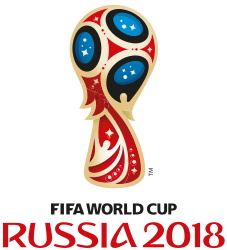
Играй с открытым сердцем |
|
| Tournament details | |
| Host country | Russia |
| Dates | 14 June – 15 July 2018 |
| Teams | 32 (from 5 confederations) |
| Venue(s) | 12 (in 11 host cities) |
| Final positions | |
| Champions | |
| Runners-up | |
| Third place | |
| Fourth place | |
| Tournament statistics | |
| Matches played | 64 |
| Goals scored | 169 (2.64 per match) |
| Attendance | 3,031,768 (47,371 per match) |
| Top scorer(s) | |
| Best player(s) | |
| Best young player | |
| Best goalkeeper | |
| Fair play award | |
|
← 2014 2022 → |
The 2018 FIFA World Cup was the 21st FIFA World Cup, the quadrennial world championship for national football teams organized by FIFA. It took place in Russia from 14 June to 15 July 2018, after the country was awarded the hosting rights in 2010. It was the eleventh time the championships had been held in Europe, and the first time they were held in Eastern Europe. At an estimated cost of over $14.2 billion, it was the most expensive World Cup ever held until it was surpassed by the 2022 World Cup in Qatar.[1][2]
The tournament phase involved 32 teams, of which 31 came through qualifying competitions, while as the host nation Russia qualified automatically. Of the 32, 20 had also appeared in the 2014 event, while Iceland and Panama each made their first appearance at the World Cup. 64 matches were played in 12 venues across 11 cities. Germany, the defending champions, were eliminated in the group stage for the first time since 1938. Host nation Russia was eliminated in the quarter-finals. In the final, France played Croatia on 15 July at the Luzhniki Stadium in Moscow. France won the match 4–2, claiming their second World Cup and becoming the fourth consecutive title won by a European team, after Italy in 2006, Spain in 2010, and Germany in 2014.
Croatian player Luka Modrić was voted the tournament’s best player, winning the Golden Ball. England’s Harry Kane won the Golden Boot as he scored the most goals during the tournament with six. Belgium’s Thibaut Courtois won the Golden Glove, awarded to the goalkeeper with the best performance. It has been estimated that more than 3 million people attended games during the tournament.
Host selection[edit]
Russian bid personnel celebrate the awarding of the 2018 World Cup to Russia on 2 December 2010.
The 100-ruble commemorative banknote celebrates the 2018 FIFA World Cup. It features an image of Soviet goalkeeper Lev Yashin.
The bidding procedure to host the 2018 and 2022 FIFA World Cup tournaments began in January 2009, and national associations had until 2 February 2009 to register their interest.[3] Initially, nine countries placed bids for the 2018 FIFA World Cup, but Mexico later withdrew from the proceedings,[4] and Indonesia’s bid was rejected by FIFA in February 2010 after the Indonesian government failed to submit a letter to support the bid.[5] During the bidding process, the three remaining non-UEFA nations (Australia, Japan, and the United States) gradually withdrew from the 2018 bids, and thus were ruled out of the 2022 bid. As such, there were eventually four bids for the 2018 FIFA World Cup, two of which were joint bids: England, Russia, Netherlands/Belgium, and Portugal/Spain.[6]
The 22-member FIFA Executive Committee convened in Zürich on 2 December 2010 to vote to select the hosts of both tournaments.[7] Russia won the right to be the 2018 host in the second round of voting. The Portugal/Spain bid came second, and that from Belgium/Netherlands third. England, which was bidding to host its second tournament, was eliminated in the first round.[8]
The voting results were:[6]
| Bidders | Votes | |
|---|---|---|
| Round 1 | Round 2 | |
| Russia | 9 | 13 |
| Portugal / Spain | 7 | 7 |
| Belgium / Netherlands | 4 | 2 |
| England | 2 | Eliminated |
Host selection criticism[edit]
The choice of Russia as host was controversial. Issues included the level of racism in Russian football,[9][10][11] human rights abuses by Russian authorities,[12][13] and discrimination against LGBT people in wider Russian society.[14][15] Russia’s involvement in the ongoing conflict in Ukraine had also prompted calls for the tournament to be moved, particularly following the annexation of Crimea.[16][17] In 2014, FIFA president Sepp Blatter stated that «the World Cup has been given and voted to Russia and we are going forward with our work».[18]
Russia was criticised for alleged abuse of migrant labourers in the construction of World Cup venues,[19] with Human Rights Watch reporting cases where workers were left unpaid, made to work in dangerously cold conditions, or suffering reprisals for raising concerns.[20][21] A few pundits claimed it was slave labour.[22][23][24] In May 2017, FIFA president Gianni Infantino admitted there had been human rights abuses of North Korean workers involved in the construction of Saint Petersburg’s Zenit Arena.[25] By June 2017, at least 17 workers had died on World Cup construction sites, according to Building and Wood Workers’ International.[26][27] In August, a group of eight US senators called on FIFA to consider dismissing Russia as the World Cup host if an independent investigation verified allegations of North Koreans being subjected to forced labor.[28]
Racism and Neo-nazi symbols displayed in the past by some Russian football fans drew criticism,[29] with documented incidents of racial chants, banners spewing hate-filled messages, and sometimes assaults on people from the Caucasus and Central Asia.[30][31] In March 2015, FIFA’s then Vice President Jeffrey Webb said that Russia posed a huge challenge from a racism standpoint, and that a World Cup could not be held there under the current conditions.[32] On July, United Nations anti-discrimination official Yuri Boychenko said that Russian soccer authorities had failed to fully grasp what racism was and needed to do more to combat it.[33] To address this as well as concerns of hooliganism in general, Russian intelligence services blacklisted over 400 fans from entering the stadiums by June 2018, with 32 other countries also sending officers to help local police screen attendees for valid ID cards.[34]
Allegations of corruption in the bidding processes and concerns over bribery on the part of the Russian team and corruption by FIFA members for the 2018 and 2022 World Cups led to threats from England’s FA to boycott the tournament.[35] They claimed that four members of the executive committee had requested bribes to vote for England, and Sepp Blatter had said it had already been arranged before the vote that Russia would win.[36] FIFA appointed Michael J. Garcia, a US attorney, to investigate and produce a report on the corruption allegations. Although the report was never published, FIFA released a 42-page summary of its findings as determined by German judge Hans-Joachim Eckert. Eckert’s summary cleared Russia and Qatar of any wrongdoing, but was denounced by critics as a whitewash.[37] Because of the controversy, the FA refused to accept Eckert’s absolving Russia from blame. Greg Dyke called for a re-examination of the affair and David Bernstein called for a boycott of the World Cup.[38][39] Garcia criticised the summary as being «materially incomplete» with «erroneous representations of the facts and conclusions», and appealed to FIFA’s Appeal Committee.[40][41] The committee declined to hear his appeal, so Garcia resigned to protest of FIFA’s conduct, citing a «lack of leadership» and lack of confidence in Eckert’s independence.[42]
On 3 June 2015, the FBI confirmed that federal authorities were investigating the bidding and awarding processes for the 2018 and 2022 World Cups.[43][44] In an interview published on 7 June 2015, Domenico Scala, the head of FIFA’s Audit And Compliance Committee, stated that «should there be evidence that the awards to Qatar and Russia came only because of bought votes, then the awards could be cancelled».[45][46] Prince William of Wales and former British Prime Minister David Cameron attended a meeting with FIFA vice-president Chung Mong-joon in which a vote-trading deal for the right to host the 2018 World Cup in England was discussed.[47][48]
Teams[edit]
Qualification[edit]
For the first time in the history of the FIFA World Cup, all eligible nations—the 209 FIFA member associations except automatically qualified hosts Russia—applied to enter the qualifying process.[49] Zimbabwe and Indonesia were later disqualified before playing their first matches,[50][51] while Gibraltar and Kosovo, who joined FIFA on 13 May 2016 after the qualifying draw but before European qualifying had begun, also entered the competition.[citation needed] Places in the tournament were allocated to continental confederations, with the allocation unchanged from the 2014 World Cup.[52][53] The first qualification game, between Timor-Leste and Mongolia, began in Dili on 12 March 2015 as part of the AFC’s qualification,[54][55][56] and the main qualifying draw took place at the Konstantinovsky Palace in Strelna, Saint Petersburg, on 25 July 2015.[57][58]
Of the 32 nations qualified to play at the 2018 FIFA World Cup, 20 countries competed at the previous tournament in 2014. Both Iceland and Panama qualified for the first time, with the former becoming the smallest country in terms of population to reach the World Cup.[59] Other teams returning after absences of at least three tournaments included: Egypt, returning to the finals after their last appearance in 1990; Morocco, who last competed in 1998; Peru, who last appeared in 1982; and Senegal, competing for the second time after reaching the quarter-finals in 2002. It was the first time three Nordic countries (Denmark, Iceland and Sweden) and four Arab nations (Egypt, Morocco, Saudi Arabia and Tunisia) qualified for the World Cup.[60]
Notable teams that failed to qualify included: four-time champions Italy (for the first time since 1958), who were knocked out in a qualification play-off by quarter-finalists Sweden and were the highest-ranked team to not qualify; and the Netherlands, who were three-time runners-up and had finished in third place in 2014, and had qualified for the last three World Cups. Four reigning continental champions: 2017 Africa Cup of Nations winners Cameroon; two-time Copa América champions and 2017 Confederations Cup runners-up Chile; 2016 OFC Nations Cup winners New Zealand; and 2017 CONCACAF Gold Cup champions the United States (for the first time since 1986) also failed to qualify. The other notable qualifying streaks broken were for Ghana and Ivory Coast, both of which had qualified for the three previous tournaments.[61] The lowest-ranked team to qualify was the host nation, Russia.
Note: Numbers in parentheses indicate positions in the FIFA World Rankings at the time of the tournament.[62]
Draw[edit]
The draw was held on 1 December 2017 at 18:00 MSK at the State Kremlin Palace in Moscow.[63][64] The 32 teams were drawn into eight groups of four, by selecting one team from each of the four ranked pots.
For the draw, the teams were allocated to four pots based on the FIFA World Rankings of October 2017. Pot one contained the hosts Russia (who were automatically assigned to position A1) and the best seven teams. Pot two contained the next best eight teams, and so on for pots three and four.[65] This was different from previous draws, when only pot one was based on FIFA rankings while the remaining pots were based on geographical considerations. However, teams from the same confederation still were not drawn against each other for the group stage, except that two UEFA teams could be in each group. The pots for the draw are shown below.[66]
| Pot 1 | Pot 2 | Pot 3 | Pot 4 |
|---|---|---|---|
|
|
|
|
|
Squads[edit]
Initially, each team had to name a preliminary squad of 30 players, but in February 2018 this was increased to 35.[67] From the preliminary squad, the team had to name a final squad of 23 players (three of whom had to be goalkeepers) by 4 June. Players in the final squad could be replaced for serious injury up to 24 hours prior to kickoff of the team’s first match. These replacements did not need to have been named in the preliminary squad.[68]
For players named in the 35-player preliminary squad, there was a mandatory rest period between 21 and 27 May 2018, except for those involved in the 2018 UEFA Champions League Final played on 26 May.[69]
Officiating[edit]
On 29 March 2018, FIFA released the list of 36 referees and 63 assistant referees selected to oversee matches.[70] On 30 April 2018, FIFA released the list of 13 video assistant referees, who acted solely in this capacity in the tournament.[71]
Referee Fahad Al-Mirdasi of Saudi Arabia was removed on 30 May 2018 over a match-fixing attempt,[72] along with his two assistant referees, compatriots Mohammed Al-Abakry and Abdulah Al-Shalwai. A new referee was not appointed, but two assistant referees, Hasan Al Mahri of the United Arab Emirates and Hiroshi Yamauchi of Japan, were added to the list.[73][74] Assistant referee Marwa Range of Kenya also withdrew after the BBC released an investigation conducted by a Ghanaian journalist which implicated him in a bribery scandal.[75]
| List of officials | |||
|---|---|---|---|
| Confederation | Referee | Assistant referees | Video assistant referees |
| AFC | Alireza Faghani (Iran) | Reza Sokhandan (Iran) Mohammadreza Mansouri (Iran) |
Abdulrahman Al-Jassim (Qatar) |
| Ravshan Irmatov (Uzbekistan) | Abdukhamidullo Rasulov (Uzbekistan) Jakhongir Saidov (Uzbekistan) |
||
| Mohammed Abdulla Hassan Mohamed (United Arab Emirates) | Mohamed Al Hammadi (United Arab Emirates) Hasan Al Mahri (United Arab Emirates) |
||
| Ryuji Sato (Japan) | Toru Sagara (Japan) Hiroshi Yamauchi (Japan) |
||
| Nawaf Shukralla (Bahrain) | Yaser Tulefat (Bahrain) Taleb Al Maari (Qatar) |
||
| CAF | Mehdi Abid Charef (Algeria) | Anouar Hmila (Tunisia) | |
| Malang Diedhiou (Senegal) | Djibril Camara (Senegal) El Hadji Samba (Senegal) |
||
| Bakary Gassama (Gambia) | Jean Claude Birumushahu (Burundi) Abdelhak Etchiali (Algeria) |
||
| Gehad Grisha (Egypt) | Redouane Achik (Morocco) Waleed Ahmed (Sudan) |
||
| Janny Sikazwe (Zambia) | Jerson Dos Santos (Angola) Zakhele Siwela (South Africa) |
||
| Bamlak Tessema Weyesa (Ethiopia) | |||
| CONCACAF | Joel Aguilar (El Salvador) | Juan Zumba (El Salvador) Juan Carlos Mora (Costa Rica) |
|
| Mark Geiger (United States) | Frank Anderson (United States) Joe Fletcher (Canada) |
||
| Jair Marrufo (United States) | Corey Rockwell (United States) | ||
| Ricardo Montero (Costa Rica) | |||
| John Pitti (Panama) | Gabriel Victoria (Panama) | ||
| César Arturo Ramos (Mexico) | Marvin Torrentera (Mexico) Miguel Hernández (Mexico) |
||
| CONMEBOL | Julio Bascuñán (Chile) | Carlos Astroza (Chile) Christian Schiemann (Chile) |
Wilton Sampaio (Brazil) Gery Vargas (Bolivia) Mauro Vigliano (Argentina) |
| Enrique Cáceres (Paraguay) | Eduardo Cardozo (Paraguay) Juan Zorrilla (Paraguay) |
||
| Andrés Cunha (Uruguay) | Nicolás Taran (Uruguay) Mauricio Espinosa (Uruguay) |
||
| Néstor Pitana (Argentina) | Hernán Maidana (Argentina) Juan Pablo Belatti (Argentina) |
||
| Sandro Ricci (Brazil) | Emerson de Carvalho (Brazil) Marcelo Van Gasse (Brazil) |
||
| Wilmar Roldán (Colombia) | Alexander Guzmán (Colombia) Cristian de la Cruz (Colombia) |
||
| OFC | Matthew Conger (New Zealand) | Simon Lount (New Zealand) Tevita Makasini (Tonga) |
|
| Norbert Hauata (Tahiti) | Bertrand Brial (New Caledonia) | ||
| UEFA | Felix Brych (Germany) | Mark Borsch (Germany) Stefan Lupp (Germany) |
Bastian Dankert (Germany) Artur Soares Dias (Portugal) Paweł Gil (Poland) Massimiliano Irrati (Italy) Tiago Martins (Portugal) Danny Makkelie (Netherlands) Daniele Orsato (Italy) Paolo Valeri (Italy) Felix Zwayer (Germany) |
| Cüneyt Çakır (Turkey) | Bahattin Duran (Turkey) Tarık Ongun (Turkey) |
||
| Sergei Karasev (Russia) | Anton Averianov (Russia) Tikhon Kalugin (Russia) |
||
| Björn Kuipers (Netherlands) | Sander van Roekel (Netherlands) Erwin Zeinstra (Netherlands) |
||
| Szymon Marciniak (Poland) | Paweł Sokolnicki (Poland) Tomasz Listkiewicz (Poland) |
||
| Antonio Mateu Lahoz (Spain) | Pau Cebrián Devís (Spain) Roberto Díaz Pérez (Spain) |
||
| Milorad Mažić (Serbia) | Milovan Ristić (Serbia) Dalibor Đurđević (Serbia) |
||
| Gianluca Rocchi (Italy) | Elenito Di Liberatore (Italy) Mauro Tonolini (Italy) |
||
| Damir Skomina (Slovenia) | Jure Praprotnik (Slovenia) Robert Vukan (Slovenia) |
||
| Clément Turpin (France) | Cyril Gringore (France) Nicolas Danos (France) |
Video assistant referees[edit]
Shortly after the International Football Association Board’s decision to incorporate video assistant referees (VARs) into the Laws of the game (LOTG) on 16 March 2018, the FIFA Council took the much-anticipated step of approving the use of VAR for the first time in a FIFA World Cup tournament.[76][77]
VAR operations for all games were operated from a single headquarters in Moscow, which received live video of the games and were in radio contact with the on-field referees.[78] Systems were in place for communicating VAR-related information to broadcasters and visuals on stadiums’ large screens were used for the fans in attendance.[78]
VAR had a significant impact on several games.[79] On 15 June 2018, Diego Costa’s first goal against Portugal became the first World Cup goal based on a VAR decision;[80] the first penalty as a result of a VAR decision was awarded to France in their match against Australia on 16 June and resulted in a goal by Antoine Griezmann.[81] A record number of penalties were awarded in the tournament, a phenomenon partially attributed to VAR.[82] Overall, the new technology was both praised and criticised by commentators.[83] FIFA declared the implementation of VAR a success after the first week of competition.[84]
Venues[edit]
Russia proposed the following host cities: Kaliningrad, Kazan, Krasnodar, Moscow, Nizhny Novgorod, Rostov-on-Don, Saint Petersburg, Samara, Saransk, Sochi, Volgograd, Yaroslavl, and Yekaterinburg.[85] Each chosen city was located in European Russia (except Yekaterinburg,[86] which lies very close to the Europe-Asia border) in order to reduce travel time for the teams in the huge country. The bid evaluation report stated: «The Russian bid proposes 13 host cities and 16 stadiums, thus exceeding FIFA’s minimum requirement. Three of the 16 stadiums would be renovated, and 13 would be newly constructed.»[87]
In October 2011, Russia reduced the number of stadiums from 16 to 14. Construction of the proposed Podolsk stadium in the Moscow Oblast was cancelled by the regional government. Also, in the capital, Otkritie Arena was competing with Dynamo Stadium over which would be constructed first.[88][dead link]
The final choice of host cities was announced on 29 September 2012. The number of cities was reduced further to 11 and the number of stadiums to 12 as Krasnodar and Yaroslavl were dropped from the final list. Of the 12 stadiums used for the tournament, three (Luzhniki, Yekaterinburg and Sochi) had been extensively renovated and the other nine were brand new; $11.8 billion was spent on hosting the tournament.[89]
Sepp Blatter had said in July 2014 that, given the concerns over the completion of venues in Russia, the number of venues for the tournament may be reduced from 12 to 10.[90] He also said, «We are not going to be in a situation, as is the case of one, two or even three stadiums in South Africa, where it is a problem of what you do with these stadiums».[91]
Reconstruction of the Yekaterinburg Central Stadium in January 2017
In October 2014, on their first official visit to Russia, FIFA’s inspection committee and its head, Chris Unger, visited St. Petersburg, Sochi, Kazan and both Moscow venues. They were satisfied with the progress.[92] On 8 October 2015, FIFA and the local organising committee agreed on the official names of the stadiums to be used during the tournament.[93] Of the twelve venues, the Luzhniki Stadium in Moscow and the Saint Petersburg Stadium—the two largest stadiums in Russia—were used most; both hosted seven matches. Sochi, Kazan, Nizhny Novgorod and Samara each hosted six matches, including one quarter-final match each, while the Otkritie Stadium in Moscow and the Rostov Stadium hosted five matches, including one round-of-16 match each. Volgograd, Kaliningrad, Yekaterinburg and Saransk each hosted four matches, but did not host any knockout stage games.
Stadiums[edit]
Exterior of Otkrytie Arena
in Moscow
Twelve stadiums in eleven Russian cities were built or renovated for the FIFA World Cup. Between 2010 (when Russia were announced as hosts) and 2018, nine of the twelve stadiums were built (some in place of older, outdated venues) and the other three were renovated for the tournament.[94]
- Kaliningrad: Kaliningrad Stadium (new). The first piles were driven into the ground in September 2015. On 11 April 2018 it hosted its first match.
- Kazan: Kazan Arena (new). The stadium was built for the 2013 Summer Universiade. It has since hosted the 2015 World Aquatics Championships and the 2017 FIFA Confederations Cup. It serves as a home arena for FC Rubin Kazan.
- Moscow: Luzhniki Stadium (heavily renovated). The largest stadium in the country, it was closed for renovation in 2013. It was commissioned in November 2017.
- Moscow: Spartak Stadium (new). This stadium is the home arena to its namesake FC Spartak Moscow. In accordance with FIFA requirements, during the 2018 World Cup, it was called Spartak Stadium instead of its usual name Otkritie Arena. It hosted its first match on 5 September 2014.
- Nizhny Novgorod: Nizhny Novgorod Stadium (new). Construction of this stadium commenced in 2015 and was completed in December 2017.[95]
- Rostov-on-Don: Rostov Arena (new). The stadium is located on the left bank of the Don. Construction was completed on 22 December 2017.
- Saint Petersburg: Saint Petersburg Stadium (new). Construction commenced in 2007 after the site, formerly occupied by Kirov Stadium, was cleared. The project was officially completed on 29 December 2016.[96] It has hosted 2017 FIFA Confederations Cup games and served as a venue for UEFA Euro 2020.
- Samara: Samara Arena (new). Construction officially started on 21 July 2014 and was completed on 21 April 2018.
- Saransk: Mordovia Arena (new). The stadium in Saransk was scheduled to be commissioned in 2012 in time for the opening of the all-Russian Spartakiad, but the plan was revised. The opening was rescheduled to 2017. The arena hosted its first match on 21 April 2018.
- Sochi: Fisht Stadium (slightly renovated). This stadium hosted the opening and closing ceremonies of the 2014 Winter Olympics. Afterwards, it was renovated in preparation for the 2017 FIFA Confederations Cup and the 2018 World Cup.
- Volgograd: Volgograd Arena (new). The main Volgograd arena was built on the demolished Central Stadium site, at the foot of the Mamayev Kurgan memorial complex. It was commissioned on 3 April 2018.[97]
- Yekaterinburg: Ekaterinburg Arena (heavily renovated). The Central Stadium of Yekaterinburg had been renovated for the FIFA World Cup. Its stands have a capacity of 35,000 spectators. The renovation project was completed in December 2017.
| Moscow | Saint Petersburg | Sochi | |
|---|---|---|---|
| Luzhniki Stadium | Otkritie Arena (Spartak Stadium) |
Krestovsky Stadium (Saint Petersburg Stadium) |
Fisht Olympic Stadium (Fisht Stadium) |
| Capacity: 78,011[98] | Capacity: 44,190[99] | Capacity: 64,468[100] | Capacity: 44,287[101] |
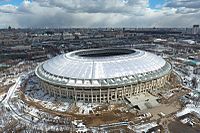
|
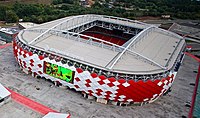
|
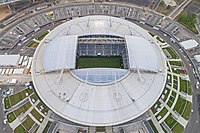
|

|
| Volgograd |
Moscow Saint Petersburg Kaliningrad Nizhny Novgorod Kazan Samara Volgograd Saransk Sochi Rostov-on-Don Yekaterinburg |
Rostov-on-Don | |
| Volgograd Arena | Rostov Arena | ||
| Capacity: 43,713[102] | Capacity: 43,472[103] | ||

|

|
||
| Nizhny Novgorod | Kazan | ||
| Nizhny Novgorod Stadium | Kazan Arena | ||
| Capacity: 43,319[104] | Capacity: 42,873[105] | ||
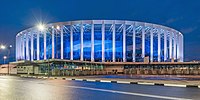
|
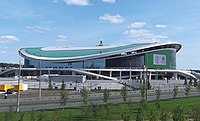
|
||
| Samara | Saransk | Kaliningrad | Yekaterinburg |
| Samara Arena | Mordovia Arena | Kaliningrad Stadium | Central Stadium (Ekaterinburg Arena) |
| Capacity: 41,970[106] | Capacity: 41,685[107] | Capacity: 33,973[108] | Capacity: 33,061[109] |
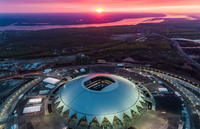
|
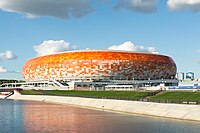
|
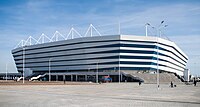
|
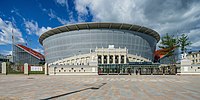
|
Team base camps[edit]
Base camps were used by the 32 national squads to stay and train before and during the World Cup tournament. On 9 February 2018, FIFA announced the base camps for each participating team.[110]
- Argentina: Bronnitsy, Moscow Oblast
- Australia: Kazan, Tatarstan
- Belgium: Krasnogorsky, Moscow Oblast
- Brazil: Sochi, Krasnodar Krai
- Colombia: Verkhneuslonsky, Tatarstan
- Costa Rica: Saint Petersburg
- Croatia: Roshchino, Leningrad Oblast[111]
- Denmark: Anapa, Krasnodar Krai
- Egypt: Grozny, Chechnya
- England: Repino, Saint Petersburg[112]
- France: Istra, Moscow Oblast
- Germany: Vatutinki, Moscow[113]
- Iceland: Gelendzhik, Krasnodar Krai
- Iran: Bakovka, Moscow Oblast
- Japan: Kazan, Tatarstan
- Mexico: Khimki, Moscow Oblast
- Morocco: Voronezh, Voronezh Oblast
- Nigeria: Yessentuki, Stavropol Krai
- Panama: Saransk, Mordovia
- Peru: Moscow
- Poland: Sochi, Krasnodar Krai
- Portugal: Ramenskoye, Moscow Oblast
- Russia: Khimki, Moscow Oblast
- Saudi Arabia: Saint Petersburg
- Senegal: Kaluga, Kaluga Oblast
- Serbia: Svetlogorsk, Kaliningrad Oblast
- South Korea: Saint Petersburg
- Spain: Krasnodar, Krasnodar Krai
- Sweden: Gelendzhik, Krasnodar Krai
- Switzerland: Togliatti, Samara Oblast
- Tunisia: Pervomayskoye, Moscow Oblast
- Uruguay: Bor, Nizhny Novgorod Oblast
Preparation and costs[edit]
Budget[edit]
At an estimated cost of over $14.2 billion as of June 2018,[114] the 2018 FIFA event was the most expensive World Cup in history, surpassing the $11.6 billion cost of the 2014 FIFA World Cup in Brazil.[114][115]
The Russian government had originally earmarked a budget of around $20 billion,[116] which was later slashed to $10 billion, for World Cup preparations. Half was spent on transportation infrastructure.[117] As part of the program to prepare for the 2018 FIFA World Cup, a federal sub-program—»Construction and Renovation of Transport Infrastructure»—was implemented with a total budget of ₽352.5 billion (rubles), with ₽170.3 billion coming from the federal budget, ₽35.1 billion from regional budgets, and ₽147.1 billion from investors.[118] The biggest item of federal spending was the aviation infrastructure costing ₽117.8 billion.[119] Construction of new hotels was a crucial area of infrastructure development in World Cup host cities. Costs continued to mount as preparations were underway.[115]
Infrastructure spending[edit]
Platov International Airport in Rostov-on-Don was upgraded with automated air traffic control systems. Modern surveillance, navigation, communication, control, and meteorological support systems were also installed.[120] Koltsovo Airport in Yekaterinburg was upgraded with radio-engineering tools for flight operation and received a second runway. Saransk Airport received a new navigation system; two new hotels were constructed in the city—the Mercure Saransk Centre (Accor Hotels) and Four Points by Sheraton Saransk as well as few other smaller accommodation facilities.[121] In Samara, new tram lines were laid.[122] Khrabrovo Airport in Kaliningrad was upgraded with radio navigation and weather equipment.[123] Renovation and upgraded radio-engineering tools for flight operations was completed in the Moscow, Saint Petersburg, Volgograd, Samara, Yekaterinburg, Kazan and Sochi airports.[120] On 27 March, the Russian Ministry of Construction Industry, Housing and Utilities Sector of reported that all communications within its area of responsibility had been commissioned. The last facility commissioned was a waste treatment station in Volgograd. In Yekaterinburg, where four matches were hosted, hosting costs increased to over ₽7.4 billion, exceeding the ₽5.6 billion rubles originally allocated from the state and regional budget.[124]
Volunteers[edit]
Volunteer flag bearers on the field prior to Belgium’s (flag depicted) group stage match against Tunisia
Volunteer applications to the 2018 Russia Local Organising Committee opened on 1 June 2016. The 2018 FIFA World Cup Russia Volunteer Program received about 177,000 applications,[125] and engaged a total of 35,000 volunteers.[126] They received training at 15 Volunteer Centres of the local organising committee based in 15 universities, and in volunteer centres in the host cities. Preference, especially in key areas, was given to those with knowledge of a foreign language and volunteering experience, but not necessarily to Russian nationals.[127]
Transport[edit]
Free public transport services were offered for ticketholders during the World Cup, including additional trains linking host cities, as well as services such as bus services within them.[128][129][130]
Schedule[edit]
Launching of a 1,000 days countdown in Moscow
The full schedule was announced by FIFA on 24 July 2015 without kick-off times, which were confirmed later.[131][132] On 1 December 2017, following the final draw, FIFA adjusted six kick-off times.[133][134]
Russia was placed in position A1 in the group stage and played in the opening match at the Luzhniki Stadium in Moscow on 14 June against Saudi Arabia, the two lowest-ranked teams of the tournament at the time of the final draw.[135] The Luzhniki Stadium also hosted the second semi-final on 11 July and the final on 15 July. The Krestovsky Stadium in Saint Petersburg hosted the first semi-final on 10 July and the third place play-off on 14 July.[136][52]
Opening ceremony[edit]
The opening ceremony took place on Thursday, 14 June 2018, at the Luzhniki Stadium in Moscow, preceding the opening match of the tournament between hosts Russia and Saudi Arabia.[137][138]
At the start of the ceremony, Russian president Vladimir Putin gave a speech, welcoming the countries of the world to Russia and calling football a uniting force.[139] Brazilian World Cup-winning striker Ronaldo entered the stadium with a child in a Russia jersey.[139] Pop singer Robbie Williams then sang two of his songs solo before he and Russian soprano Aida Garifullina performed a duet.[139] Dancers dressed in the flags of the 32 competing teams appeared carrying a sign with the name of each nation.[139] At the end of the ceremony Ronaldo reappeared with the official match ball which had returned from the International Space Station in early June.[139]
Young participants of the international children’s social programme Football for Friendship from 211 countries and regions took part in the opening ceremony of the FIFA World Cup at the Luzhniki stadium.[140]
Group stage[edit]
Competing countries were divided into eight groups of four teams (groups A to H). Teams in each group played one another in a round-robin, with the top two teams advancing to the knockout stage. Ten European teams and four South American teams progressed to the knockout stage, together with Japan and Mexico.
For the first time since 1938, Germany, the reigning champions, were eliminated in the first round. This was the third consecutive tournament in which the holders were eliminated in the first round, after Italy in 2010 and Spain in 2014. No African team progressed to the second round for the first time since 1982. The fair play criteria came into use for the first time when Japan qualified over Senegal because the team had received fewer yellow cards. Only one match, France versus Denmark, was goalless. Until then there were a record 36 straight games in which at least one goal was scored.[141] All times listed below are local time.[133]
| Tie-breaking criteria for group play |
|---|
The ranking of teams in the group stage was determined as follows:[68][142]
|
Group A[edit]
| Pos | Team
|
Pld | W | D | L | GF | GA | GD | Pts | Qualification |
|---|---|---|---|---|---|---|---|---|---|---|
| 1 | 3 | 3 | 0 | 0 | 5 | 0 | +5 | 9 | Advance to knockout stage | |
| 2 | 3 | 2 | 0 | 1 | 8 | 4 | +4 | 6 | ||
| 3 | 3 | 1 | 0 | 2 | 2 | 7 | −5 | 3 | ||
| 4 | 3 | 0 | 0 | 3 | 2 | 6 | −4 | 0 |
Group B[edit]
| Pos | Team
|
Pld | W | D | L | GF | GA | GD | Pts | Qualification |
|---|---|---|---|---|---|---|---|---|---|---|
| 1 | 3 | 1 | 2 | 0 | 6 | 5 | +1 | 5 | Advance to knockout stage | |
| 2 | 3 | 1 | 2 | 0 | 5 | 4 | +1 | 5 | ||
| 3 | 3 | 1 | 1 | 1 | 2 | 2 | 0 | 4 | ||
| 4 | 3 | 0 | 1 | 2 | 2 | 4 | −2 | 1 |
Group C[edit]
| Pos | Team
|
Pld | W | D | L | GF | GA | GD | Pts | Qualification |
|---|---|---|---|---|---|---|---|---|---|---|
| 1 | 3 | 2 | 1 | 0 | 3 | 1 | +2 | 7 | Advance to knockout stage | |
| 2 | 3 | 1 | 2 | 0 | 2 | 1 | +1 | 5 | ||
| 3 | 3 | 1 | 0 | 2 | 2 | 2 | 0 | 3 | ||
| 4 | 3 | 0 | 1 | 2 | 2 | 5 | −3 | 1 |
Group D[edit]
| Pos | Team
|
Pld | W | D | L | GF | GA | GD | Pts | Qualification |
|---|---|---|---|---|---|---|---|---|---|---|
| 1 | 3 | 3 | 0 | 0 | 7 | 1 | +6 | 9 | Advance to knockout stage | |
| 2 | 3 | 1 | 1 | 1 | 3 | 5 | −2 | 4 | ||
| 3 | 3 | 1 | 0 | 2 | 3 | 4 | −1 | 3 | ||
| 4 | 3 | 0 | 1 | 2 | 2 | 5 | −3 | 1 |
Group E[edit]
| Pos | Team
|
Pld | W | D | L | GF | GA | GD | Pts | Qualification |
|---|---|---|---|---|---|---|---|---|---|---|
| 1 | 3 | 2 | 1 | 0 | 5 | 1 | +4 | 7 | Advance to knockout stage | |
| 2 | 3 | 1 | 2 | 0 | 5 | 4 | +1 | 5 | ||
| 3 | 3 | 1 | 0 | 2 | 2 | 4 | −2 | 3 | ||
| 4 | 3 | 0 | 1 | 2 | 2 | 5 | −3 | 1 |
Group F[edit]
| Pos | Team
|
Pld | W | D | L | GF | GA | GD | Pts | Qualification |
|---|---|---|---|---|---|---|---|---|---|---|
| 1 | 3 | 2 | 0 | 1 | 5 | 2 | +3 | 6 | Advance to knockout stage | |
| 2 | 3 | 2 | 0 | 1 | 3 | 4 | −1 | 6 | ||
| 3 | 3 | 1 | 0 | 2 | 3 | 3 | 0 | 3 | ||
| 4 | 3 | 1 | 0 | 2 | 2 | 4 | −2 | 3 |
Group G[edit]
| Pos | Team
|
Pld | W | D | L | GF | GA | GD | Pts | Qualification |
|---|---|---|---|---|---|---|---|---|---|---|
| 1 | 3 | 3 | 0 | 0 | 9 | 2 | +7 | 9 | Advance to knockout stage | |
| 2 | 3 | 2 | 0 | 1 | 8 | 3 | +5 | 6 | ||
| 3 | 3 | 1 | 0 | 2 | 5 | 8 | −3 | 3 | ||
| 4 | 3 | 0 | 0 | 3 | 2 | 11 | −9 | 0 |
Group H[edit]
| Pos | Team
|
Pld | W | D | L | GF | GA | GD | Pts | Qualification |
|---|---|---|---|---|---|---|---|---|---|---|
| 1 | 3 | 2 | 0 | 1 | 5 | 2 | +3 | 6 | Advance to knockout stage | |
| 2 | 3 | 1 | 1 | 1 | 4 | 4 | 0 | 4[a] | ||
| 3 | 3 | 1 | 1 | 1 | 4 | 4 | 0 | 4[a] | ||
| 4 | 3 | 1 | 0 | 2 | 2 | 5 | −3 | 3 |
- ^ a b Fair play points: Japan −4, Senegal −6.
Knockout stage[edit]
In the knockout stages, if a match was level at the end of normal playing time, extra time was played (two periods of 15 minutes each) and followed, if necessary, by a penalty shoot-out to determine the winners.[68] If a match went into extra time, each team was allowed to make a fourth substitution, the first time this had been allowed in a FIFA World Cup tournament.[76] Below is the bracket for the knockout round of the tournament, teams in bold denote match winners.[76]
Bracket[edit]
| Round of 16 | Quarter-finals | Semi-finals | Final | |||||||||||
| 30 June – Sochi | ||||||||||||||
| 2 | ||||||||||||||
| 6 July – Nizhny Novgorod | ||||||||||||||
| 1 | ||||||||||||||
| 0 | ||||||||||||||
| 30 June – Kazan | ||||||||||||||
| 2 |
||||||||||||||
| 4 | ||||||||||||||
| 10 July – Saint Petersburg | ||||||||||||||
| 3 | ||||||||||||||
| 1 | ||||||||||||||
| 2 July – Samara | ||||||||||||||
| 0 | ||||||||||||||
| 2 | ||||||||||||||
| 6 July – Kazan | ||||||||||||||
| 0 | ||||||||||||||
| 1 | ||||||||||||||
| 2 July – Rostov-on-Don | ||||||||||||||
| 2 |
||||||||||||||
| 3 | ||||||||||||||
| 15 July – Moscow (Luzhniki) | ||||||||||||||
| 2 | ||||||||||||||
| 4 | ||||||||||||||
| 1 July – Moscow (Luzhniki) | ||||||||||||||
| 2 | ||||||||||||||
| 1 (3) | ||||||||||||||
| 7 July – Sochi | ||||||||||||||
| 1 (4) |
||||||||||||||
| 2 (3) | ||||||||||||||
| 1 July – Nizhny Novgorod | ||||||||||||||
| 2 (4) |
||||||||||||||
| 1 (3) | ||||||||||||||
| 11 July – Moscow (Luzhniki) | ||||||||||||||
| 1 (2) | ||||||||||||||
| 2 | ||||||||||||||
| 3 July – Saint Petersburg | ||||||||||||||
| 1 | Third place play-off | |||||||||||||
| 1 | ||||||||||||||
| 7 July – Samara | 14 July – Saint Petersburg | |||||||||||||
| 0 | ||||||||||||||
| 0 | 2 | |||||||||||||
| 30 July – Moscow (Otkritie) | ||||||||||||||
| 2 |
0 | |||||||||||||
| 1 (3) | ||||||||||||||
| 1 (4) |
||||||||||||||
Round of 16[edit]
Quarter-finals[edit]
Semi-finals[edit]
Third place play-off[edit]
Final[edit]
Statistics[edit]
Goalscorers[edit]
There were 169 goals scored in 64 matches, for an average of 2.64 goals per match.
Twelve own goals were scored during the tournament, doubling the record of six set in 1998.[206]
Goals scored from penalty shoot-outs are not counted towards an individual player’s goal count.[207]
6 goals
Harry Kane
4 goals
3 goals
2 goals
1 goal
1 own goal
Source: FIFA[208]
Discipline[edit]
In total, only four players were sent off in the entire tournament, the fewest since 1978.[209] International Football Association Board technical director David Elleray stated a belief that this was due to the introduction of VAR, since players would know that they would not be able to get away with anything under the new system.[210]
A player is automatically suspended for the next match for the following offences:[68]
- Receiving a red card (red card suspensions may be extended for serious offences)
- Receiving two yellow cards in two matches; yellow cards expire after the completion of the quarter-finals (yellow card suspensions are not carried forward to any other future international matches)
The following suspensions were served during the tournament:
Awards[edit]
The following awards were given at the conclusion of the tournament. The Golden Boot (top scorer), Golden Ball (best overall player) and Golden Glove (best goalkeeper) awards were all sponsored by Adidas.[211]
| Golden Ball | Silver Ball | Bronze Ball |
|---|---|---|
| Golden Boot | Silver Boot | Bronze Boot |
(6 goals, 0 assists) |
(4 goals, 2 assists) |
(4 goals, 1 assist) |
| Golden Glove | ||
| FIFA Young Player Award | ||
| FIFA Fair Play Trophy | ||
Additionally, FIFA.com shortlisted 18 goals for users to vote on as the tournament’s best.[212] The poll closed on 23 July. The award was sponsored by Hyundai.[213]
| Goal of the Tournament | |||
|---|---|---|---|
| Goalscorer | Opponent | Score | Round |
| 2–2 | Round of 16 |
All-Star Team[edit]
FIFA published an All-Star Team, this year called the Fantasy Team, based on player performances evaluated through statistical data.[214]
| Goalkeeper | Defenders | Midfielders | Forwards |
|---|---|---|---|
Dream Team[edit]
The users of FIFA.com elected their Fan Dream Team.[215][216]
| Goalkeeper | Defenders | Midfielders | Forwards |
|---|---|---|---|
Prize money[edit]
Prize money amounts were announced in October 2017.[217]
| Position | Amount (million USD) | |
|---|---|---|
| Per team | Total | |
| Champions | 38 | 38 |
| Runners-up | 28 | 28 |
| Third place | 24 | 24 |
| Fourth place | 22 | 22 |
| 5th–8th place (quarter-finals) | 16 | 64 |
| 9th–16th place (round of 16) | 12 | 96 |
| 17th–32nd place (group stage) | 8 | 128 |
| Total | 400 |
Marketing[edit]
The typeface «Dusha» used for branding
Branding[edit]
The tournament logo was unveiled on 28 October 2014 by cosmonauts at the International Space Station and then projected onto Moscow’s Bolshoi Theatre during an evening television programme. Russian Sports Minister Vitaly Mutko said the logo was inspired by «Russia’s rich artistic tradition and its history of bold achievement and innovation», and FIFA president Sepp Blatter stated that it reflected the «heart and soul» of the country.[citation needed] For branding, Portuguese design agency Brandia Central created materials in 2014, with a typeface called Dusha (from душа, Russian for ‘soul’) designed by Brandia Central and edited by Adotbelow of the DSType Foundry in Portugal.[218]
Ticketing[edit]
The first phase of ticket sales started on 14 September 2017, 12:00 Moscow Time, and lasted until 12 October 2017.[219]
The general visa policy of Russia did not apply to participants and spectators, who were able to visit Russia without a visa right before and during the competition regardless of their citizenship.[220] Spectators were nonetheless required to register for a «Fan-ID», a special photo identification pass. A Fan-ID was required to enter the country visa-free, while a ticket, Fan-ID and a valid passport were required to enter stadiums for matches. Fan-IDs also granted World Cup attendees free access to public transport services, including buses, and train service between host cities. Fan-ID was administered by the Ministry of Digital Development, Communications and Mass Media, which could revoke this accreditation at any time to «ensure the defence capability or security of the state or public order».[128][129][130]
Merchandise[edit]
On 29 May 2018, Electronic Arts released a free update to their video game FIFA 18 that added content related to the 2018 FIFA World Cup. The expansion included a World Cup tournament mode with all teams and stadiums from the event, official television presentation elements, and World Cup-related content for the Ultimate Team mode.[221][222]
Panini continued their partnership with FIFA by producing stickers for their World Cup sticker album.[223] Panini also developed an app for the 2018 World Cup where fans could collect and swap virtual stickers, with 5 million fans gathering digital stickers for the tournament.[224][225]
Symbols[edit]
Mascot[edit]
Tournament mascot, wolf Zabivaka
The tournament’s official mascot was unveiled on 21 October 2016, and selected through a design competition among university students. A public vote was used to select the mascot from three finalists—a cat, a tiger, and a wolf. The winner, with 53% or approximately 1 million votes, was Zabivaka—an anthropomorphic wolf dressed in the colours of the Russian national team. Zabivaka’s name is a portmanteau of the Russian words забияка («hothead») and забивать («to score»), and his official backstory states that he is an aspiring football player who is «charming, confident and social».[226]
Match ball[edit]
Match ball for the knockout stage, «Telstar Mechta»
The official match ball, the «Telstar 18», was unveiled on 9 November 2017. It was based on the name and design of the first Adidas World Cup ball from 1970.[227] A special red-coloured variation, «Telstar Mechta», was used for the knockout stage of the tournament. The word mechta (Russian: мечта) means «dream» or «ambition».[228]
Goalkeepers noted that the ball was slippery and prone to having unpredictable trajectory.[229][230] In addition, two Telstar 18 balls popped in the midst of a first-round match between France and Australia, leading to further discussions over the ball’s performance.[231][232]
Music[edit]
The official song of the tournament was «Live It Up», with vocals by Will Smith, Nicky Jam and Era Istrefi, released on 25 May 2018. Its music video was released on 8 June 2018.[233]
Other controversies[edit]
Thirty-three footballers who were alleged to be part of the Russian steroid programme are listed in the McLaren Report.[234] On 22 December 2017, it was reported that FIFA had fired a doctor who had been investigating doping in Russian football.[235] On 22 May 2018 FIFA confirmed that the investigations concerning all Russian players named for the provisional squad of the FIFA World Cup in Russia had been completed, with the result that insufficient evidence was found to support anti-doping rule violations.[236] FIFA’s medical committee also decided that Russian personnel would not be involved in performing drug testing procedures at the tournament, an action taken to reassure teams that samples would not be tampered with.[237]
Russia relaxed its visa rules during the World Cup, allowing Fan ID holders to enter and exit Russia without a visa through 31 December 2018. Traffickers exploited this system to bring foreign sex trafficking victims into the country, especially from Nigeria.[238] Reuters had raised concerns about the victims’ conditions, who had allegedly been forced into prostitution, with some of them enduring violent abuse.[239][240] Russian authorities were accused of doing little to fix to the issue, allegedly because many locals blamed the victims for falling into prostitution.[241][242]
Response to Skripal poisoning[edit]
In response to the March 2018 poisoning of Sergei and Yulia Skripal, British prime minister Theresa May announced that no British ministers or members of the royal family would attend the World Cup, and issued a warning to any travelling England fans.[243] Russia responded to the comments from the UK Parliament claiming that the West are trying to «take the World Cup out of Russia».[244] The Russian Foreign Ministry denounced Boris Johnson’s statements that compared the event to the 1936 Olympics held in Nazi Germany as «poisoned with venom of hate, unprofessionalism and boorishness» and «unacceptable and unworthy» parallel towards Russia, a «nation that lost millions of lives in fighting Nazism».[245]
Critical reception[edit]
Facilities—such as the refurbished Luzhniki Stadium (pictured)—were one aspect of Russia’s perceived success.
At the close of the World Cup, Russia was widely praised for its success in hosting the tournament, with Steve Rosenberg of the BBC deeming it «a resounding public relations success» for Putin, adding: «The stunning new stadiums, free train travel to venues and the absence of crowd violence has impressed visiting supporters. Russia has come across as friendly and hospitable: a stark contrast with the country’s authoritarian image. All the foreign fans I have spoken to are pleasantly surprised.»[246]
Despite the British Foreign Office and MPs repeatedly warning English football fans travelling to Russia of «racist or homophobic intimidation, hooligan violence and anti-British hostility»,[247][248] fans who did travel said they received a warm welcome from ordinary citizens after arriving in Russia.[249][250]
FIFA president Gianni Infantino stated: «Everyone discovered a beautiful country, a welcoming country, that is keen to show the world that everything that has been said before might not be true. A lot of preconceived ideas have been changed because people have seen the true nature of Russia.»[251] Infantino has proclaimed Russia 2018 to be «the best World Cup ever», as 98 per cent of the stadiums were sold out, there were 3 billion viewers on TV around the world and 7 million fans visited the fan fests.[252] It was the most viewed World Cup to date, and the third most viewed television broadcast, surpassing the Beijing Olympics in 2008.[citation needed]
However, some Western media outlets called the tournament a distraction from the international isolation and economic difficulties Russia has been facing.[253][254][255]
Broadcasting rights[edit]
FIFA, through several companies, sold the broadcasting rights for the 2018 FIFA World Cup to various local broadcasters. After having tested the technology at limited matches of the 2013 FIFA Confederations Cup,[256] and the 2014 FIFA World Cup (via private tests and public viewings in the host city of Rio de Janeiro),[257] the 2018 World Cup was the first World Cup in which all matches were produced in 4K ultra high definition. Host Broadcast Services (HBS) stated that at least 75% of the broadcast cut of each match would come from 4K cameras (covering the majority of main angles), with instant replays and some camera angles being converted up from 1080p high definition sources with limited degradation in quality. These broadcasts were made available from selected rightsholders and television providers.[258][259][260]
In February 2018, Ukrainian rightsholder UA:PBC stated that it would not broadcast the World Cup. This came in the wake of growing boycotts of the tournament among the Football Federation of Ukraine and sports minister Ihor Zhdanov.[261][262] Additionally, the Football Federation of Ukraine refused to accredit journalists for the World Cup and waived their quota of tickets.[263] However, the Ukrainian state TV still broadcast the World Cup, and more than 4 million Ukrainians watched the opening match.[264]
Broadcast rights to the tournament in the Middle East were hampered by an ongoing diplomatic crisis in Qatar, which saw Bahrain, Egypt, Saudi Arabia, and the United Arab Emirates cut diplomatic ties with Qatar—the home country of FIFA’s Middle East and Africa rightsholder beIN Sports—in June 2017, over its alleged state support of terrorist groups. On 2 June 2018, beIN pulled its channels from Du and Etisalat, but with service to the latter restored later that day. Etisalat subsequently announced that it would air the World Cup in the UAE, and continue to offer beIN normally and without interruptions.[265][266][267] In Saudi Arabia, beIN was banned from doing business; as a result, its channels and other content have been widely and illegally repackaged by a broadcaster identifying itself as «beoutQ». While FIFA attempted to negotiate the sale of a package consisting of Saudi matches and the final indirectly, they were unable to do so. On 12 July 2018, FIFA stated that it had «engaged counsel to take legal action in Saudi Arabia and is working alongside other sports rights owners that have also been affected to protect its interests.»[268][269]
In the United States, the 2018 World Cup was the first men’s World Cup whose English rights were held by Fox Sports, and Spanish rights held by Telemundo. The elimination of the United States in qualifying led to concerns that US interest and viewership of this World Cup would be reduced, noting that «casual» viewers of U.S. matches caused them to peak at 16.5 million viewers in 2014, and determined how much Fox paid for the rights. During a launch event prior to the elimination, Fox stated that it had planned to place a secondary focus on the Mexican team in its coverage to take advantage of their popularity among Hispanic and Latino Americans. Fox stated that it was still committed to broadcasting a significant amount of tournament coverage.[270][271][272] Viewership was down overall over 2014; match scheduling was not as favourable to viewers in the Americas as it was in 2014. Many matches aired in the morning hours, although Telemundo’s broadcast of the Mexico-Sweden Group F match was announced as being its most-watched weekday daytime program in network history.[273][274]
Unlike previous tournaments, where the rights were bundled with those of South Korea, Korean Central Television acquired rights to the 2018 World Cup within North Korea. Broadcasts only began with the round of 16, and matches were tape delayed and edited for time. In addition, matches involving Japan were excluded from the broadcasts, due to strained relations and campaigns against the country.[275]
[edit]
| FIFA partners | FIFA World Cup sponsors | African supporters | Asian supporters | European supporters | ||||
|---|---|---|---|---|---|---|---|---|
|
|
|
|
|
Audience[edit]
A combined 3.572 billion unique viewers (live global 1-minute reach) – more than half of the global population aged four and over – tuned in to world football’s ultimate competition, according to audience data for official broadcast coverage of the 2018 FIFA World Cup.[295]
The average global live audience for every game of the tournament was 191 million viewers (for a cumulative live audience of 12.224 billion viewers), a 2.1% increase over the 2014 tournament average of 187 million viewers, including that average audience in the early stages (group stage and round of 16) were bigger than in 2014. However, in 2018, the audience was 15 percent smaller for the semi-finals, 17 percent for the third place play-off, and 5.1 percent for the final, which was watched by 517 million people on average (only in-home TV viewers), compared to 545 million in 2014. Presumably, the reason for that is the smaller countries involved in the top four games compared to those in 2014, and only one global region (Europe) being represented in 2018 (compared to South America and Europe in 2014). However the live global 1-minute reach of the final was 1.12 billion people (884.37 in-home TV viewers and 231.82 million out-of-home and (or) digital-only viewers).[296]
See also[edit]
- FIFA World Cup
- FIFA World Cup hosts
- 2017 FIFA Confederations Cup
- 2019 FIFA Women’s World Cup
References[edit]
- ^ Ellyatt, Holly (14 June 2018). «The World Cup will give Russia’s economy a boost — just don’t expect it to last». CNBC. Retrieved 5 July 2021.
- ^ «The Games That Cost Russia $14 Billion: 9 Wild World Cup Money Stats». The Motley Fool. Retrieved 5 July 2021.
- ^ Goff, Steve (16 January 2009). «Future World Cups». The Washington Post. Archived from the original on 30 April 2011. Retrieved 16 January 2009.
- ^ «Mexico withdraws FIFA World Cup bid». FIFA.com. Fédération Internationale de Football Association. 29 September 2009. Archived from the original on 30 April 2011. Retrieved 10 February 2011.
- ^ «Indonesia’s bid to host the 2022 World Cup bid ends». BBC News. 19 March 2010. Archived from the original on 20 March 2010. Retrieved 19 March 2010.
- ^ a b Doyle, Paul; Busfield, Steve (2 December 2010). «World Cup 2018 and 2022 decision day – live!». The Guardian. London. Archived from the original on 26 December 2016.
- ^ «Combined bidding confirmed». FIFA.com. Fédération Internationale de Football Association. 20 December 2008. Archived from the original on 22 January 2009. Retrieved 20 December 2008.
- ^ «England miss out to Russia in 2018 World Cup Vote». BBC News. 2 December 2010. Archived from the original on 3 December 2010. Retrieved 2 December 2010.
- ^ Syal, Rajeev (3 December 2010). «World Cup 2018 win raises Russian racism fears». The Guardian. Archived from the original on 20 September 2013. Retrieved 20 August 2011.
- ^ «Yaya Toure: Black players may boycott 2018 Russia World Cup». BBC Sport. 25 October 2013. Archived from the original on 18 January 2016.
- ^ Munro, Kelsey (11 June 2018). «Racism in Russia and FIFA’s 3-step plan to tackle it». Sbs.com.au. Archived from the original on 12 June 2018.
- ^ Krivosheev, Denis (16 June 2017). «FIFA must challenge Russia’s human rights record». CNN. Retrieved 6 December 2022.
- ^ «Keeping Score 2018: Shrinking Space for Freedom of Expression in Russia». PEN International. 25 May 2018. Archived from the original on 26 April 2019. Retrieved 15 March 2020.
- ^ McCormick, Joseph Patrick (25 March 2014). «Campaigns demand FIFA bans Russia from hosting 2018 World Cup due to anti-gay law». Pink News. Archived from the original on 6 October 2014.
- ^ Lavin, James (28 February 2014). «Why FIFA Needs to Move the World Cup». The Advocate. Archived from the original on 6 October 2014.
- ^ «Fifa urged to rethink staging 2018 World Cup in Russia». BBC News. 21 March 2014. Archived from the original on 7 April 2014. Retrieved 17 April 2014.
- ^ Winter, Stuart (23 March 2014). «US calls for Fifa to drop Russia from hosting World Cup in 2018». Daily Express. Archived from the original on 16 April 2014. Retrieved 17 April 2014.
- ^ «Sepp Blatter: Russia will host 2018 World Cup despite Crimea». BBC Sport. 21 March 2014. Archived from the original on 28 April 2014. Retrieved 17 April 2014.
- ^ Patrick Jennings (16 June 2017). «Confederations Cup: World Cup host Russia set to come under spotlight». BBC Sport.
- ^ Reuters (14 June 2017). «Workers exploited at Russia’s 2018 World Cup venues, reveals Human Rights Watch». India Today. Retrieved 6 December 2022.
- ^ Editorial Board (15 June 2017). «FIFA has a human rights problem of its own making». Washington Post. ISSN 0190-8286. Archived from the original on 4 May 2019.
- ^ Russia accused of exploiting World Cup stadium workers. TRT World. 23 June 2017. Archived from the original on 8 December 2022. Retrieved 20 December 2022 – via YouTube.
- ^ ANNE M. PETERSON (25 June 2022). «Group asks for living wages, labor rights for 2026 World Cup». Taiwan News. Associated Press. Retrieved 6 December 2022.
- ^ Martyn Ziegler (1 March 2017). «Russia and Fifa face ‘slave labour’ claims». The Times. ISSN 0140-0460. Archived from the original on 8 December 2022. Retrieved 8 December 2022.
- ^ Dan Roan (9 November 2017). «World Cup: Fifa urged to strengthen workers’ rights in Russia & Qatar». BBC Sport. Retrieved 6 December 2022.
- ^ Associated Press (14 June 2017). «Workers on 2018 World Cup construction sites face abuse: Report». The Indian Express. Retrieved 6 December 2022.
- ^ With reporting by AFP, AP, and Reuters (14 June 2017). «HRW ‘Red Cards’ Russia, FIFA For Alleged Abuse Of World Cup Venue Builders». Radio Free Europe/Radio Liberty.
{{cite web}}: CS1 maint: multiple names: authors list (link) - ^ Min-joo, Kim (3 August 2017). «US senators urge FIFA to dismiss Russia as World Cup host over use of NK labor». The Korea Herald. Yonhap. Retrieved 6 December 2022.
- ^ «Study finds pervasive racism in Russian soccer ahead of 2018 World Cup». The Washington Post. 27 February 2015. Archived from the original on 6 November 2015.
- ^ Alec Luhn (4 June 2015). «Racism in Russia laid bare: more than 100 incidents in just two seasons». The Guardian. Archived from the original on 7 December 2022.
- ^ Tony Wesolowsky (6 August 2015). «Ahead Of World Cup, Racism Still Kicking In Russian Soccer». Radio Free Europe/Radio Liberty.
- ^ Olivia Becker (14 March 2015). «FIFA Questions 2018 Russian World Cup Due To Racism». Vice.com.
- ^ «Russian Authorities Fail to Understand Racism — U.N Official». The Moscow Times. 23 July 2015. Retrieved 8 December 2022.
- ^ World Cup 2018: Can Russia prevent hooliganism, racism & clashes as it happened during the Euro2016?. FRANCE 24 English. 14 June 2018. Archived from the original on 8 December 2022. Retrieved 20 December 2022 – via YouTube.
- ^ Ornstein, David (17 November 2014). «World Cup: Former FA chief David Bernstein calls for boycott». BBC Sport. Archived from the original on 17 November 2014. Retrieved 17 November 2014.
- ^ Gordon, Aaron (27 June 2017). «What We Know About Corruption in the 2018 And 2022 World Cup Bids». vice.com. Archived from the original on 15 January 2018. Retrieved 31 May 2018.
- ^ Dunbar, Graham. «FIFA under fire after report on Qatar, Russia». Associated Press. Archived from the original on 16 November 2014. Retrieved 14 November 2014.
- ^ «Former FA chairman David Bernstein calls for 2018 World Cup boycott». The Guardian. 17 November 2014. Archived from the original on 26 April 2018. Retrieved 31 May 2018.
- ^ «Qatar World Cup organizers ready to fight for 2022». Reuters. 3 June 2015. Archived from the original on 26 April 2018. Retrieved 31 May 2018.
- ^ Roan, Dan (17 November 2014). «Greg Dyke: FA demands full report findings into World Cup corruption». BBC Sport. Archived from the original on 17 November 2014. Retrieved 17 November 2014.
- ^ Conway, Richard. «FIFA corruption report: Who is to blame and what happens now?». BBC Sport. Archived from the original on 14 November 2014. Retrieved 14 November 2014.
- ^ «Michael Garcia: FIFA investigator resigns in World Cup report row». BBC. 17 December 2014. Archived from the original on 15 January 2016.
- ^ Rumsby, Ben (4 June 2015). «Fifa in crisis: FBI extends investigation to Russia 2018 and Qatar 2022 World Cup bids». The Telegraph. Archived from the original on 4 June 2015. Retrieved 4 June 2015.
- ^ Riach, James (3 June 2015). «FBI investigating Fifa’s awarding of 2018 and 2022 World Cups – report». The Guardian. Archived from the original on 4 June 2015. Retrieved 4 June 2015.
- ^ «‘Russia & Qatar may lose World Cups’ – Fifa official». BBC News. 7 June 2015. Archived from the original on 2 August 2015.
- ^ Gibson, Owen (7 June 2015). «Russia and Qatar may lose World Cups if evidence of bribery is found». The Guardian. Archived from the original on 26 December 2016.
- ^ Mendick, Robert; Rumsby, Ben (27 June 2017). «Prince William and David Cameron caught up in Fifa corruption scandal». The Daily Telegraph. Archived from the original on 20 January 2018.
- ^ «Video: David Cameron and Prince William implicated in FIFA corruption probe». The Belfast Telegraph. 28 June 2017. Archived from the original on 5 January 2019. Retrieved 20 May 2018.
- ^ «Road to Russia with new milestone». FIFA.com. Fédération Internationale de Football Association. 15 January 2015. Archived from the original on 21 March 2015.
- ^ «Zimbabwe expelled from the preliminary competition of the 2018 FIFA World Cup Russia». FIFA.com. Fédération Internationale de Football Association. 12 March 2015. Archived from the original on 16 November 2017.
- ^ «Indonesia excluded from 2018 World Cup qualifiers». Reuters. 3 June 2015. Archived from the original on 1 March 2016.
- ^ a b «2022 FIFA World Cup to be played in November/December». FIFA.com. Fédération Internationale de Football Association. 20 March 2015. Archived from the original on 12 November 2017.
- ^ «Current allocation of FIFA World Cup confederation slots maintained». FIFA.com. Fédération Internationale de Football Association. 30 May 2015. Archived from the original on 16 November 2017.
- ^ «Long road to Russia begins in Dili». FIFA.com. Fédération Internationale de Football Association. 11 March 2015. Archived from the original on 16 November 2017.
- ^ «FIFA World Cup Preliminary Draw: 1 week to go». FIFA.com. Fédération Internationale de Football Association. 18 July 2015. Archived from the original on 16 November 2017.
- ^ «Organising Committee for the FIFA World Cup extends its responsibilities to cover 2018 and 2022». FIFA.com. Fédération Internationale de Football Association. 19 March 2013. Archived from the original on 18 October 2014.
- ^ «Konstantinovsky Palace to stage Preliminary Draw of the 2018 FIFA World Cup». FIFA.com. Fédération Internationale de Football Association. 10 October 2014. Archived from the original on 31 December 2014.
- ^ «Ethics: Executive Committee unanimously supports recommendation to publish report on 2018/2022 FIFA World Cup bidding process». FIFA.com (Press release). Fédération Internationale de Football Association. 19 December 2014. Archived from the original on 29 March 2015.
- ^ T.A.W. (12 November 2017). «How Iceland (population: 330,000) qualified for the World Cup». The Economist. Archived from the original on 13 November 2017. Retrieved 13 November 2017.
- ^ «In first, 4 Arab countries qualify for FIFA World Cup Finals». The Times of Israel. 12 November 2017. Archived from the original on 13 November 2017. Retrieved 13 November 2017.
- ^ Reineking, Jim (12 June 2018). «FIFA World Cup 2018: Notable teams that failed to qualify». USA Today. Archived from the original on 14 June 2018. Retrieved 27 June 2018.
- ^ ««FIFA/Coca-Cola World Ranking»«. FIFA.com. Fédération Internationale de Football Association. 7 June 2018. Archived from the original on 23 June 2021. Retrieved 23 June 2021.
- ^ «Final Draw to take place in State Kremlin Palace». FIFA.com. Fédération Internationale de Football Association. 24 January 2017. Archived from the original on 16 November 2017.
- ^ «Final Draw to take place at 18:00». The Daily Telegraph. 24 November 2017. Archived from the original on 25 November 2017.
- ^ «OC for FIFA Competitions approves procedures for the Final Draw of the 2018 FIFA World Cup». FIFA.com. Fédération Internationale de Football Association. 14 September 2017. Archived from the original on 10 November 2017.
- ^ «2018 FIFA World Cup™ — News — The Final Draw: How it works». FIFA.com. Fédération Internationale de Football Association. Retrieved 6 April 2020.
- ^ «Organising Committee for FIFA Competitions: Updates on the FIFA World Cup and women’s tournaments». FIFA.com. Fédération Internationale de Football Association. 8 February 2018. Archived from the original on 9 February 2018. Retrieved 9 February 2018.
- ^ a b c d «Regulations – 2018 FIFA World Cup Russia» (PDF). FIFA. Archived (PDF) from the original on 12 July 2017.
- ^ «Rest periods for the players on the provisional list for the 2018 FIFA World Cup Russia» (PDF). FIFA.com. Fédération Internationale de Football Association. 30 March 2017. Archived from the original (PDF) on 18 April 2017.
- ^ «2018 FIFA World Cup – Statistical Kit – Referees» (PDF). FIFA.com. Fédération Internationale de Football Association. Archived (PDF) from the original on 24 June 2018. Retrieved 11 July 2018.
- ^ «World Cup 2018 List of video match officials» (PDF). FIFA.com. Fédération Internationale de Football Association. Archived (PDF) from the original on 30 April 2018.
- ^ «World Cup 2018: Referee Fahad Al Mirdasi ‘banned over match-fixing attempt in Saudi Arabia’«. BBC. 16 May 2018. Archived from the original on 25 May 2018.
- ^ «FIFA statement on the situation of the Saudi Arabian referee Fahad AL MIRDASI». FIFA.com. Fédération Internationale de Football Association. 30 May 2018. Archived from the original on 1 June 2018.
- ^ «Updated: List of FIFA match officials for the 2018 FIFA World Cup» (PDF). FIFA.com. Fédération Internationale de Football Association. Archived from the original (PDF) on 1 June 2018.
- ^ «Betraying the Game: African officials filmed taking cash». BBC. 7 June 2018. Archived from the original on 10 June 2018. Retrieved 20 June 2018.
- ^ a b c «FIFA Council decides on key steps for the future of international competitions». FIFA.com. Fédération Internationale de Football Association. 16 March 2018. Archived from the original on 31 March 2018.
- ^ «VAR: Video assistant referees set to be used at 2018 World Cup in Russia». BBC Sport. 3 March 2018. Archived from the original on 18 June 2018. Retrieved 27 June 2018.
- ^ a b MacInnes, Paul (12 June 2018). «How will VAR work at the World Cup and how much is riding on it?». The Guardian. Archived from the original on 18 June 2018. Retrieved 27 June 2018.
- ^ Belam, Martin (22 June 2018). «VAR at the World Cup: the big decisions, game by game». The Guardian. Archived from the original on 28 June 2018. Retrieved 27 June 2018.
- ^ Austin, Jack (15 June 2018). «Why Diego Costa’s goal against Portugal made World Cup history». The Independent. Archived from the original on 16 June 2018. Retrieved 16 June 2018.
- ^ «World Cup 2018: History made with first penalty awarded by VAR during France vs Australia». The Independent. 16 June 2018. Archived from the original on 16 June 2018. Retrieved 18 June 2018.
- ^ «Ronaldo penalty sets new World Cup record». ESPN. 26 June 2018. Archived from the original on 27 June 2018. Retrieved 27 June 2018.
- ^ McLean, Max (16 June 2018). «12 very different opinions on VAR at the World Cup to help you make your mind up». The Irish Independent. Archived from the original on 27 June 2018. Retrieved 27 June 2018.
- ^ «FIFA ‘satisfied’ with World Cup refereeing, VAR». ESPN. 20 June 2018. Archived from the original on 27 June 2018. Retrieved 27 June 2018.
- ^ «2018 FIFA World Cup Bid Evaluation Report: Russia» (PDF). FIFA.com. Fédération Internationale de Football Association. Archived from the original (PDF) on 14 December 2010. Retrieved 10 December 2002.
- ^ «The border between Europe and Asia». welcome2018.com. Archived from the original on 23 June 2018. Retrieved 23 June 2018.
- ^ Marikar, Hafiz. «Russia to host next FIFA World Cup». Dailynews.lk. The Associated Newspapers of Ceylon Ltd. Archived from the original on 9 August 2014. Retrieved 23 July 2014.
- ^ «Почему у России осталось только 14 стадионов к ЧМ-2018 – Известия (Why are there only 14 stadiums for the Russia 2018 World Cup)». Izvestia (in Russian). 7 October 2011. Archived from the original on 8 October 2011. Retrieved 8 October 2011.
- ^ «2018 FIFA World Cup to be played in 11 Host Cities». FIFA.com. Fédération Internationale de Football Association. 29 September 2012. Archived from the original on 8 July 2014. Retrieved 29 September 2012.
- ^ «Russia united for 2018 FIFA World Cup Host Cities announcement». FIFA.com. Fédération Internationale de Football Association. 29 September 2012. Archived from the original on 13 November 2013. Retrieved 13 November 2013.
- ^ Saakov, Rafael (22 July 2014). «Russia 2018: Major challenges for next World Cup hosts». BBC News. Archived from the original on 28 July 2014. Retrieved 29 July 2014.
- ^ Rogovitskiy, Dmitriy (21 October 2014). «Russia on track for World Cup 2018, say FIFA inspectors». Reuters. Archived from the original on 29 October 2014. Retrieved 29 October 2014.
- ^ «Stadium names for the 2018 FIFA World Cup Russia confirmed». FIFA.com. Fédération Internationale de Football Association. 8 October 2015. Archived from the original on 11 November 2017.
- ^ «World Cup 2018 stadiums: A guide to the venues of this summer’s tournament». The Telegraph. 30 May 2018. Archived from the original on 14 June 2018. Retrieved 14 June 2018.
- ^ «Стадион на 45000 зрительских мест к Чемпионату мира по футболу в Нижнем Новгороде» [Stadium for 45,000 spectators for the World Cup in Nizhny Novgorod]. stroytransgaz.ru (in Russian). Archived from the original on 30 September 2017. Retrieved 31 May 2018.
- ^ «Стадион на Крестовском ввели в эксплуатацию». fontanka.ru (in Russian). 29 December 2016. Archived from the original on 20 February 2017. Retrieved 31 May 2018.
- ^ Chizhenok, Alexander (2017). Construction of the stadium «Volgograd Arena». Openwork roof. [1]. Volgograd: Boris Yeltsin Presidential Library.
- ^ «Luzhniki Stadium». FIFA.com. Fédération Internationale de Football Association. Archived from the original on 16 November 2017. Retrieved 15 June 2018.
- ^ «Spartak Stadium». FIFA.com. Fédération Internationale de Football Association. Archived from the original on 14 June 2018. Retrieved 15 June 2018.
- ^ «Saint Petersburg Stadium». FIFA.com. Fédération Internationale de Football Association. Archived from the original on 6 December 2017. Retrieved 15 June 2018.
- ^ «Fisht Stadium». FIFA.com. Fédération Internationale de Football Association. Archived from the original on 15 June 2018. Retrieved 15 June 2018.
- ^ «Volgograd Arena». FIFA.com. Fédération Internationale de Football Association. Archived from the original on 15 October 2017. Retrieved 15 June 2018.
- ^ «Rostov Arena». FIFA.com. Fédération Internationale de Football Association. Archived from the original on 15 June 2018. Retrieved 15 June 2018.
- ^ «Nizhny Novgorod Stadium». FIFA.com. Fédération Internationale de Football Association. Archived from the original on 15 June 2018. Retrieved 15 June 2018.
- ^ «Kazan Arena». FIFA.com. Fédération Internationale de Football Association. Archived from the original on 15 June 2018. Retrieved 15 June 2018.
- ^ «Samara Arena». FIFA.com. Fédération Internationale de Football Association. Archived from the original on 12 June 2018. Retrieved 15 June 2018.
- ^ «Mordovia Arena». FIFA.com. Fédération Internationale de Football Association. Archived from the original on 14 May 2018. Retrieved 15 June 2018.
- ^ «Kaliningrad Stadium». FIFA.com. Fédération Internationale de Football Association. Archived from the original on 8 October 2017. Retrieved 15 June 2018.
- ^ «Ekaterinburg Arena». FIFA.com. Fédération Internationale de Football Association. Archived from the original on 31 March 2018. Retrieved 15 June 2018.
- ^ «Team Base Camps for 2018 FIFA World Cup confirmed». FIFA.com. Fédération Internationale de Football Association. 9 February 2018. Archived from the original on 10 February 2018.
- ^ «Croatia defender Pivaric says he has ‘excellent’ 1st impression of training base». fourfourtwo.com.au. 12 June 2018. Archived from the original on 15 June 2018. Retrieved 15 June 2018.
- ^ McNulty, Phil (12 June 2018). «World Cup 2018: Life inside the England bubble – what they can expect in Repino». BBC. Archived from the original on 15 June 2018. Retrieved 15 June 2018.
- ^ Grohmann, Karolos (14 June 2018). «Soccer: No tropical paradise? No problem for Germany, says midfielder Kroos». Reuters. Archived from the original on 7 July 2018. Retrieved 7 July 2018.
- ^ a b «Непредвиденные расходы: как менялась смета ЧМ-2018». rbc.ru (in Russian). 8 June 2018. Archived from the original on 13 June 2018. Retrieved 16 June 2018.
- ^ a b «Russia’s 2018 World Cup costs grow by $600 million». USA Today. 24 October 2017. Archived from the original on 1 May 2018.
- ^ «Russian Prime Minister Dmitry Medvedev says 2018 FIFA World Cup to cost 20 billion dollars». NDTV. 13 June 2013. Archived from the original on 2 March 2018.
- ^ «2018 World Cup: Russia to spend $5 billion on transport, despite cuts». Russia Beyond. 7 January 2016. Archived from the original on 2 March 2018.
- ^ «Бюджет чемпионата мира 2018 года – около €1 млрд» [The budget for the 2018 World Cup is about €1 billion]. Чемпионат (in Russian). 18 September 2015. Archived from the original on 5 January 2016. Retrieved 31 May 2018.
- ^ «На подготовку транспортной инфраструктуры ЧМ-2018 в России потрачено 228 млрд» [228 billion spent on preparation of the transport infrastructure of the World Cup 2018]. sport24.ru (in Russian). 3 May 2018. Archived from the original on 1 June 2018. Retrieved 31 May 2018.
- ^ a b «Алмазная радиосвязь». Газета.Ru (in Russian). 30 March 2018. Archived from the original on 1 June 2018. Retrieved 31 May 2018.
- ^ «В Мордовии к ЧМ-2018 прошли классификацию два хостела и мотель». info-rm.com. 16 January 2018. Archived from the original on 14 March 2018.
- ^ «Трамвайная линия до стадиона для ЧМ в Самаре готова на 89%». samru.ru. 22 February 2018. Archived from the original on 2 March 2018.
- ^ «Kaliningrad airport’s new terminal put in operation». Russian Aviation Insider. 26 July 2017. Archived from the original on 22 May 2018. Retrieved 4 June 2018.
- ^ «В Екатеринбурге увеличились расходы на подготовку к проведению ЧМ-2018». regnum.ru (in Russian). 14 June 2018. Archived from the original on 16 June 2018. Retrieved 16 June 2018.
- ^ «Новый рекорд волонтерской программы ЧМ-2018» [New record of the Volunteer program of the World Cup 2018]. welcome2018.com (in Russian). 17 January 2017. Archived from the original on 22 August 2017. Retrieved 31 May 2018.
- ^ «Набор волонтеров на ЧМ-2018 установил новый рекорд Чемпионатов мира» [A set of volunteers at the World Cup 2018 set a new World Cup record]. FIFA.com (in Russian). Fédération Internationale de Football Association. 17 January 2017. Archived from the original on 1 June 2018. Retrieved 31 May 2018.
- ^ «Чемпионат мира по футболу FIFA 2018 в России – Волонтерская программа: F.A.Q.» [FIFA 2018 World Cup in Russia – Volunteer program: F.A.Q.]. FIFA.com (in Russian). Fédération Internationale de Football Association. Archived from the original on 10 October 2016. Retrieved 31 May 2018.
- ^ a b Ames, Nick (27 March 2018). «World Cup 2018: what is a Fan ID and do I need one to watch games in Russia?». The Guardian. Archived from the original on 31 March 2018. Retrieved 10 June 2018.
- ^ a b Wildie, Tom (8 June 2018). «Aussie soccer fan’s World Cup dream crushed by new Russian visa rejection». ABC News. Archived from the original on 9 June 2018. Retrieved 10 June 2018.
- ^ a b «What World Cup fans going to Russia should know». BBC News. 6 June 2018. Archived from the original on 10 June 2018. Retrieved 10 June 2018.
- ^ «Match schedules for FIFA Confederations Cup 2017 and 2018 FIFA World Cup unveiled». FIFA.com. Fédération Internationale de Football Association. 24 July 2015. Archived from the original on 5 October 2017.
- ^ «FIFA World Cup Russia 2018 – Match Schedule» (PDF). FIFA.com. Fédération Internationale de Football Association. Archived from the original (PDF) on 11 September 2017.
- ^ a b «FIFA World Cup Russia 2018 – Match Schedule» (PDF). FIFA.com. Fédération Internationale de Football Association. 20 December 2017. Archived from the original (PDF) on 24 June 2018. Retrieved 20 December 2017.
- ^ Morrin, Siobhan (13 June 2018). «Your Ultimate Guide to Watching the 2018 World Cup». Time. Archived from the original on 14 June 2018. Retrieved 20 June 2018.
- ^ «The FIFA/Coca-Cola World Ranking – October 2017». FIFA.com. Fédération Internationale de Football Association. Archived from the original on 16 October 2017. Retrieved 16 October 2017.
- ^ «World Cup 2018 fixtures: full schedule, results and match dates». The Telegraph. 14 June 2018. Archived from the original on 14 June 2018. Retrieved 14 June 2018.
- ^ «World Cup 2018 Opening Ceremony: What time will it start and when will Robbie Williams feature?». The Telegraph. 13 June 2018. Archived from the original on 13 June 2018. Retrieved 14 June 2018.
- ^ «Robbie Williams show at World Cup opening ceremony is too short to ever be dull». The Guardian. 14 June 2018. Archived from the original on 14 June 2018. Retrieved 14 June 2018.
- ^ a b c d e «World Cup 2018: Ronaldo and Robbie Williams star in opening ceremony». BBC Sport. 14 June 2018. Archived from the original on 15 June 2018. Retrieved 15 June 2018.
- ^ «211 countries and regions take part in the Sixth International Football for Friendship Children’s Forum». FIFA.com. Fédération Internationale de Football Association. Retrieved 15 November 2020.
- ^ White, Adam (27 June 2018). «What does Didier Deschamps want from his France team? If only he knew». The Guardian. Archived from the original on 28 June 2018. Retrieved 28 June 2018.
- ^ «Tie-breakers for Russia 2018 groups». FIFA.com. Fédération Internationale de Football Association. 20 June 2018. Archived from the original on 25 June 2018. Retrieved 26 June 2018.
- ^ «Match report – Group A – Russia v Saudi Arabia» (PDF). FIFA.com. Fédération Internationale de Football Association. 14 June 2018. Retrieved 14 June 2018.
- ^ «Match report – Group A – Egypt v Uruguay» (PDF). FIFA.com. Fédération Internationale de Football Association. 15 June 2018. Retrieved 15 June 2018.
- ^ «Match report – Group A – Russia v Egypt» (PDF). FIFA.com. Fédération Internationale de Football Association. 19 June 2018. Retrieved 19 June 2018.
- ^ «Match report – Group A – Uruguay v Saudi Arabia» (PDF). FIFA.com. Fédération Internationale de Football Association. 20 June 2018. Retrieved 20 June 2018.
- ^ «Match report – Group A – Uruguay v Russia» (PDF). FIFA.com. Fédération Internationale de Football Association. 25 June 2018. Retrieved 25 June 2018.
- ^ «Match report – Group A – Saudi Arabia v Egypt» (PDF). FIFA.com. Fédération Internationale de Football Association. 25 June 2018. Retrieved 25 June 2018.
- ^ «Match report – Group B – Morocco v IR Iran» (PDF). FIFA.com. Fédération Internationale de Football Association. 15 June 2018. Retrieved 15 June 2018.
- ^ «Match report – Group B – Portugal v Spain» (PDF). FIFA.com. Fédération Internationale de Football Association. 15 June 2018. Retrieved 15 June 2018.
- ^ «Match report – Group B – Portugal v Morocco» (PDF). FIFA.com. Fédération Internationale de Football Association. 20 June 2018. Retrieved 20 June 2018.
- ^ «Match report – Group B – IR Iran v Spain» (PDF). FIFA.com. Fédération Internationale de Football Association. 20 June 2018. Retrieved 20 June 2018.
- ^ «Match report – Group B – IR Iran v Portugal» (PDF). FIFA.com. Fédération Internationale de Football Association. 25 June 2018. Retrieved 25 June 2018.
- ^ «Match report – Group B – Spain v Morocco» (PDF). FIFA.com. Fédération Internationale de Football Association. 25 June 2018. Retrieved 25 June 2018.
- ^ «Match report – Group C – France v Australia» (PDF). FIFA.com. Fédération Internationale de Football Association. 16 June 2018. Retrieved 16 June 2018.
- ^ «Match report – Group C – Peru v Denmark» (PDF). FIFA.com. Fédération Internationale de Football Association. 16 June 2018. Retrieved 16 June 2018.
- ^ «Match report – Group C – Denmark v Australia» (PDF). FIFA.com. Fédération Internationale de Football Association. 21 June 2018. Retrieved 21 June 2018.
- ^ «Match report – Group C – France v Peru» (PDF). FIFA.com. Fédération Internationale de Football Association. 21 June 2018. Retrieved 21 June 2018.
- ^ «Match report – Group C – Denmark v France» (PDF). FIFA.com. Fédération Internationale de Football Association. 26 June 2018. Retrieved 26 June 2018.
- ^ «Match report – Group C – Australia v Peru» (PDF). FIFA.com. Fédération Internationale de Football Association. 26 June 2018. Retrieved 26 June 2018.
- ^ «Match report – Group D – Argentina v Iceland» (PDF). FIFA.com. Fédération Internationale de Football Association. 16 June 2018. Retrieved 16 June 2018.
- ^ «Match report – Group D – Croatia v Nigeria» (PDF). FIFA.com. Fédération Internationale de Football Association. 16 June 2018. Retrieved 16 June 2018.
- ^ «Match report – Group D – Argentina v Croatia» (PDF). FIFA.com. Fédération Internationale de Football Association. 21 June 2018. Retrieved 21 June 2018.
- ^ «Match report – Group D – Nigeria v Iceland» (PDF). FIFA.com. Fédération Internationale de Football Association. 22 June 2018. Retrieved 22 June 2018.
- ^ «Match report – Group D – Nigeria v Argentina» (PDF). FIFA.com. Fédération Internationale de Football Association. 26 June 2018. Retrieved 26 June 2018.
- ^ «Match report – Group D – Iceland v Croatia» (PDF). FIFA.com. Fédération Internationale de Football Association. 26 June 2018. Retrieved 26 June 2018.
- ^ «Match report – Group E – Costa Rica v Serbia» (PDF). FIFA.com. Fédération Internationale de Football Association. 17 June 2018. Retrieved 17 June 2018.
- ^ «Match report – Group E – Brazil v Switzerland» (PDF). FIFA.com. Fédération Internationale de Football Association. 17 June 2018. Retrieved 17 June 2018.
- ^ «Match report – Group E – Brazil v Costa Rica» (PDF). FIFA.com. Fédération Internationale de Football Association. 22 June 2018. Retrieved 22 June 2018.
- ^ «Match report – Group E – Serbia v Switzerland» (PDF). FIFA.com. Fédération Internationale de Football Association. 22 June 2018. Retrieved 22 June 2018.
- ^ «Match report – Group E – Serbia v Brazil» (PDF). FIFA.com. Fédération Internationale de Football Association. 27 June 2018. Retrieved 27 June 2018.
- ^ «Match report – Group E – Switzerland v Costa Rica» (PDF). FIFA.com. Fédération Internationale de Football Association. 27 June 2018. Retrieved 27 June 2018.
- ^ «Match report – Group F – Germany v Mexico» (PDF). FIFA.com. Fédération Internationale de Football Association. 17 June 2018. Retrieved 17 June 2018.
- ^ «Match report – Group F – Sweden v Korea Republic» (PDF). FIFA.com. Fédération Internationale de Football Association. 18 June 2018. Retrieved 18 June 2018.
- ^ «Match report – Group F – Korea Republic v Mexico» (PDF). FIFA.com. Fédération Internationale de Football Association. 23 June 2018. Retrieved 23 June 2018.
- ^ «Match report – Group F – Germany v Sweden» (PDF). FIFA.com. Fédération Internationale de Football Association. 23 June 2018. Retrieved 23 June 2018.
- ^ «Match report – Group F – Korea Republic v Germany» (PDF). FIFA.com. Fédération Internationale de Football Association. 27 June 2018. Retrieved 27 June 2018.
- ^ «Match report – Group F – Mexico v Sweden» (PDF). FIFA.com. Fédération Internationale de Football Association. 27 June 2018. Retrieved 27 June 2018.
- ^ «Match report – Group G – Belgium v Panama» (PDF). FIFA.com. Fédération Internationale de Football Association. 18 June 2018. Archived (PDF) from the original on 18 June 2018. Retrieved 18 June 2018.
- ^ «Match report – Group G – Tunisia v England» (PDF). FIFA.com. Fédération Internationale de Football Association. 18 June 2018. Archived (PDF) from the original on 24 June 2018. Retrieved 18 June 2018.
- ^ «Match report – Group G – Belgium v Tunisia» (PDF). FIFA.com. Fédération Internationale de Football Association. 23 June 2018. Archived (PDF) from the original on 23 June 2018. Retrieved 23 June 2018.
- ^ «Match report – Group G – England v Panama» (PDF). FIFA.com. Fédération Internationale de Football Association. 24 June 2018. Archived (PDF) from the original on 24 June 2018. Retrieved 24 June 2018.
- ^ «Match report – Group G – England v Belgium» (PDF). FIFA.com. Fédération Internationale de Football Association. 28 June 2018. Retrieved 28 June 2018.
- ^ «Match report – Group G – Panama v Tunisia» (PDF). FIFA.com. Fédération Internationale de Football Association. 28 June 2018. Retrieved 28 June 2018.
- ^ «Match report – Group H – Colombia v Japan» (PDF). FIFA.com. Fédération Internationale de Football Association. 19 June 2018. Retrieved 19 June 2018.
- ^ «Match report – Group H – Poland v Senegal» (PDF). FIFA.com. Fédération Internationale de Football Association. 19 June 2018. Retrieved 19 June 2018.
- ^ «Match report – Group H – Japan v Senegal» (PDF). FIFA.com. Fédération Internationale de Football Association. 24 June 2018. Retrieved 24 June 2018.
- ^ «Match report – Group H – Poland v Colombia» (PDF). FIFA.com. Fédération Internationale de Football Association. 24 June 2018. Retrieved 24 June 2018.
- ^ «Match report – Group H – Japan v Poland» (PDF). FIFA.com. Fédération Internationale de Football Association. 28 June 2018. Retrieved 28 June 2018.
- ^ «Match report – Group H – Senegal v Colombia» (PDF). FIFA.com. Fédération Internationale de Football Association. 28 June 2018. Retrieved 28 June 2018.
- ^ «Match report – Round of 16 – France v Argentina» (PDF). FIFA.com. Fédération Internationale de Football Association. 30 June 2018. Archived (PDF) from the original on 8 July 2018. Retrieved 30 June 2018.
- ^ «Match report – Round of 16 – Uruguay v Portugal» (PDF). FIFA.com. Fédération Internationale de Football Association. 30 June 2018. Archived (PDF) from the original on 30 June 2018. Retrieved 30 June 2018.
- ^ «Match report – Round of 16 – Spain v Russia» (PDF). FIFA.com. Fédération Internationale de Football Association. 1 July 2018. Archived (PDF) from the original on 8 July 2018. Retrieved 1 July 2018.
- ^ «Match report – Round of 16 – Croatia v Denmark» (PDF). FIFA.com. Fédération Internationale de Football Association. 1 July 2018. Archived (PDF) from the original on 8 July 2018. Retrieved 1 July 2018.
- ^ «Match report – Round of 16 – Brazil v Mexico» (PDF). FIFA.com. Fédération Internationale de Football Association. 2 July 2018. Archived (PDF) from the original on 2 July 2018. Retrieved 2 July 2018.
- ^ «Match report – Round of 16 – Belgium v Japan» (PDF). FIFA.com. Fédération Internationale de Football Association. 2 July 2018. Archived (PDF) from the original on 8 July 2018. Retrieved 2 July 2018.
- ^ «Match report – Round of 16 – Sweden v Switzerland» (PDF). FIFA.com. Fédération Internationale de Football Association. 3 July 2018. Archived (PDF) from the original on 3 July 2018. Retrieved 3 July 2018.
- ^ «Match report – Round of 16 – Colombia v England» (PDF). FIFA.com. Fédération Internationale de Football Association. 3 July 2018. Archived (PDF) from the original on 4 July 2018. Retrieved 3 July 2018.
- ^ «Match report – Quarter-final – Uruguay v France» (PDF). FIFA.com. Fédération Internationale de Football Association. 6 July 2018. Archived (PDF) from the original on 6 July 2018. Retrieved 6 July 2018.
- ^ «Match report – Quarter-final – Brazil v Belgium» (PDF). FIFA.com. Fédération Internationale de Football Association. 6 July 2018. Archived (PDF) from the original on 6 July 2018. Retrieved 6 July 2018.
- ^ «Match report – Quarter-final – Sweden v England» (PDF). FIFA.com. Fédération Internationale de Football Association. 7 July 2018. Archived (PDF) from the original on 7 July 2018. Retrieved 7 July 2018.
- ^ «Match report – Quarter-final – Russia v Croatia» (PDF). FIFA.com. Fédération Internationale de Football Association. 7 July 2018. Archived (PDF) from the original on 7 July 2018. Retrieved 7 July 2018.
- ^ «Match report – Semi-final – France v Belgium» (PDF). FIFA.com. Fédération Internationale de Football Association. 10 July 2018. Retrieved 10 July 2018.
- ^ «Match report – Semi-final – Croatia v England» (PDF). FIFA.com. Fédération Internationale de Football Association. 11 July 2018. Retrieved 11 July 2018.
- ^ «Match report – Play-off for third place – Belgium v England» (PDF). FIFA.com. Fédération Internationale de Football Association. 14 July 2018. Retrieved 14 July 2018.
- ^ Kelly, Ryan (15 July 2018). «Mandzukic makes World Cup history with own goal against France in Russia 2018 final». Goal.com. Retrieved 16 July 2018.
- ^ «When Own Goals Don’t Really Count». FIFA.com. Fédération Internationale de Football Association. Archived from the original on 8 June 2019. Retrieved 16 April 2021.
- ^ «Players: Goals scored». FIFA.com. Fédération Internationale de Football Association. Archived from the original on 24 February 2020. Retrieved 24 June 2018.
- ^ «World Cup by the numbers — 169 goals, 29 penalties, 10 late winners, 4 red cards». ESPN. 16 July 2018. Archived from the original on 17 July 2018. Retrieved 17 July 2018.
- ^ «VAR effect results in cleanest World Cup since 1986 after no red cards are issued in opening 11 games». The Telegraph. 17 June 2018. Archived from the original on 18 June 2018. Retrieved 17 July 2018.
- ^ «Golden consolation for magical Modric». FIFA.com. Fédération Internationale de Football Association. 15 July 2018. Archived from the original on 16 July 2018. Retrieved 16 July 2018.
- ^ «Vote for Goal of the Tournament». FIFA.com. Fédération Internationale de Football Association. 15 July 2018. Archived from the original on 26 July 2018. Retrieved 25 July 2018.
- ^ «Pavard’s stunner voted Hyundai Goal of the Tournament». FIFA.com. Fédération Internationale de Football Association. 25 July 2018. Archived from the original on 25 July 2018. Retrieved 25 July 2018.
- ^ «Kane crowned King, Mina the PPG VIP». FIFA.com. Fédération Internationale de Football Association. 17 July 2018. Archived from the original on 18 July 2018. Retrieved 25 July 2018.
- ^ «FIFA World Cup Fan Dream Team». FIFA.com. Fédération Internationale de Football Association. 18 July 2018. Archived from the original on 26 June 2018. Retrieved 18 July 2018.
- ^ «Fan Dream Team and prize winners revealed!». FIFA.com. Fédération Internationale de Football Association. 23 July 2018. Archived from the original on 28 August 2018. Retrieved 25 July 2018.
- ^ «FIFA World Cup Prize Money» (PDF). FIFA.com. Fédération Internationale de Football Association. 27 October 2017. Archived from the original (PDF) on 29 October 2017. Retrieved 28 October 2017.
- ^ «Font scandal at FIFA World Cup». Archived from the original on 23 July 2018. Retrieved 22 July 2018.
- ^ «Ticket sales for 2018 FIFA World Cup to start on 14 September 2017». FIFA.com. Fédération Internationale de Football Association. 12 September 2017. Archived from the original on 13 November 2017.
- ^ «Russia to ease visa regime for World Cup fans in 2018». Voice of Russia. 11 July 2014. Archived from the original on 21 October 2014. Retrieved 6 June 2015.
- ^ Yin-Poole, Wesley (30 April 2018). «FIFA 18 gets free World Cup mode in May». Eurogamer. Archived from the original on 1 May 2018. Retrieved 14 May 2018.
- ^ Dayus, Oscar (30 May 2018). «FIFA 18 World Cup Update Out Now For Free, Here’s What It Adds». GameSpot. Archived from the original on 14 June 2018. Retrieved 14 March 2019.
- ^ «Brand collaborations». FIFA.com. Fédération Internationale de Football Association. Archived from the original on 9 September 2018. Retrieved 7 October 2018.
- ^ «Panini World Cup sticker album: Inside story behind the craze». Sports Illustrated. Archived from the original on 12 August 2018. Retrieved 7 October 2018.
- ^ «12 Years Running: Panini’s FIFA World Cup™ Digital Sticker Album is More Popular Than Ever». Coca-Cola Company. Archived from the original on 5 October 2018. Retrieved 7 October 2018.
- ^ «Russia 2018: World Cup mascot Zabivaka the wolf unveiled in Moscow». The Guardian. 21 October 2016. Archived from the original on 25 March 2017. Retrieved 10 June 2018.
- ^ Bate, Adam (16 July 2014). «World Cup Final: Was Lionel Messi Really a Disappointment in Brazil or Have We Just Become Numb to His Genius?». Sky Sports. Archived from the original on 22 March 2019. Retrieved 14 March 2019.
- ^ «World Cup 2018: New ball to be used for knockout stage». BBC Sport. 6 June 2018. Archived from the original on 29 June 2018. Retrieved 14 March 2019.
- ^ Teather, Jamie (16 June 2018). «World Cup ball: Adidas Telstar 18 ‘a problem for goalkeepers’«. London Evening Standard. Archived from the original on 17 June 2018. Retrieved 17 June 2018.
- ^ Price, Steve (28 March 2018). «Why Nike Contract Could Hurt England’s Preparations For Russia 2018 World Cup». Forbes. Archived from the original on 18 June 2018. Retrieved 17 June 2018.
- ^ «World Cup 2018: Adidas has a problem with the Telstar 18, is Messi the GOAT?». News.com.au — Australia’s Leading News Site. 21 June 2018. Archived from the original on 26 June 2019. Retrieved 14 March 2019.
- ^ «Telstar 18 balls burst during France». AS.com. 16 June 2018. Archived from the original on 19 June 2019. Retrieved 14 March 2019.
- ^ «2018 FIFA World Cup Russia Official Song ‘Live It Up’ to be performed by all-star line-up». FIFA.com. Fédération Internationale de Football Association. 23 May 2018. Archived from the original on 29 May 2018.
- ^ «Fifa contacts McLaren over doping claims in football». BBC Sport. 21 November 2017. Archived from the original on 16 December 2017.
- ^ Conn, David (20 December 2017). «Doctor sacked by Fifa was investigating alleged Russian football doping». The Guardian. Archived from the original on 22 December 2017. Retrieved 22 December 2017.
- ^ «Update on the investigations following the McLaren reports». FIFA.com. Fédération Internationale de Football Association. 22 May 2018. Archived from the original on 22 May 2018.
- ^ «Russians to take no part in World Cup drug testing: FIFA». Reuters. 24 May 2018. Archived from the original on 28 May 2018.
- ^ «2021 Trafficking in Persons Report: Russia». United States Department of State. in the section titled TRAFFICKING PROFILE. Retrieved 10 December 2022.
- ^ Maria Vasilyeva (6 March 2019). «Traffickers Used Russia’s World Cup To Enslave Us, Say Nigerian Women». The Moscow Times. Reuters.
- ^ «Traffickers farmed Russia’s World Cup for sex slaves». Bangkok Post. Reuters. 7 March 2019.
- ^ Gershkovich, Evan (13 June 2018). «Russia’s World Cup Opens the Floodgates for Trafficked Sex Workers». The Moscow Times.
- ^ Roache, Madeline (13 July 2018). «Putin Doesn’t Care about Sex Trafficking». Foreign Policy. Archived from the original on 7 December 2022.
- ^ Osborne, Samuel (14 March 2018). «Theresa May’s statement in full as she expels 23 Russian spies from Britain». The Independent. Archived from the original on 14 March 2018. Retrieved 14 March 2018.
- ^ «Moscow official says West is trying to deny Russia World Cup». BBC News. 1 April 2018. Archived from the original on 1 April 2018. Retrieved 1 April 2018.
- ^ Osborne, Samuel (21 March 2018). «Sergei Skripal: Chemical weapons inspectors arrive in Salisbury to investigate nerve agent attack». The Independent. Archived from the original on 19 June 2018. Retrieved 19 June 2018.
- ^ «Is Russia the real winner of World Cup 2018?». BBC. Archived from the original on 17 July 2018. Retrieved 18 July 2018.
- ^ «World Cup 2018: New report highlights MPs’ concern for England fans in Russia». BBC News. 8 June 2018. Archived from the original on 19 June 2018. Retrieved 19 June 2018.
- ^ Calder, Simon (15 March 2018). «World Cup 2018: England football fans warned of potential ‘anti-British harassment’ when travelling to Russia». The Independent. Archived from the original on 19 June 2018. Retrieved 19 June 2018.
- ^ Mendick, Robert; Luhn, Alec (18 June 2018). «England fans welcomed with open arms in Volgograd ahead of opening 2018 World Cup match against Tunisia». The Daily Telegraph. Archived from the original on 21 June 2018. Retrieved 25 June 2018.
- ^ Carroll, Oliver (19 June 2018). «World Cup 2018: England fans praise welcome by Russian hosts as they celebrate first win». The Independent. Archived from the original on 19 June 2018. Retrieved 19 June 2018.
- ^ «Qatar 2022 will be held in November and December». News.com.au. Archived from the original on 18 July 2018. Retrieved 17 July 2018.
- ^ «Gianni Infantino: World Cup 2018 the best ever». Goal.com. Archived from the original on 18 July 2018. Retrieved 19 July 2018.
- ^ MacFarquhar, Neil (13 June 2018). «Putin Has a Chance to Woo the World. Thank Soccer, and Trump». The New York Times. Archived from the original on 2 July 2019. Retrieved 2 July 2019.
- ^ Sukhankin, Sergey (15 June 2018). «The World Cup in Kaliningrad: Potemkin Village or real change?». The European Council on Foreign Relations. Archived from the original on 24 July 2019. Retrieved 24 July 2019.
- ^ Worden, Minky (13 July 2018). «Russia’s bloody World Cup». Human Rights Watch. Retrieved 5 November 2019.
- ^ «FIFA Confederations Cup Testing 4K; Might Lead to World Cup ‘Ultra HD’ Broadcast». The Hollywood Reporter. Archived from the original on 25 November 2018. Retrieved 24 November 2018.
- ^ «4K TV misses its World Cup goal». The Verge. Archived from the original on 25 November 2018. Retrieved 24 November 2018.
- ^ «Fox, Telemundo Offer a Clearer View of FIFA World Cup Russia». TV Technology. Archived from the original on 25 November 2018. Retrieved 24 November 2018.
- ^ «World Cup 2018: BBC to show tournament in Ultra HD & virtual reality». BBC Sport. 30 May 2018. Archived from the original on 25 November 2018. Retrieved 24 November 2018.
- ^ «FuboTV streaming World Cup in 4K resolution». SportsPro. Archived from the original on 14 December 2018. Retrieved 24 November 2018.
- ^ «Ukrainian public broadcaster decides not to show World Cup matches». Kyiv Post. 12 February 2018. Archived from the original on 14 March 2018. Retrieved 1 March 2018.
- ^ Carp, Sam. «Ukraine’s public broadcaster refuses to show Fifa World Cup». SportsPro. Archived from the original on 14 March 2018. Retrieved 1 March 2018.
- ^ «Inter Media Group secures World Cup rights in Ukraine». TV Sports Markets. 31 May 2018. Archived from the original on 2 July 2018. Retrieved 1 July 2018.
- ^ Bershidsky, Leonid (18 June 2018). «You Can Hate Putin But Love the World Cup». Bloomberg News. Archived from the original on 19 June 2018. Retrieved 25 June 2018.
- ^ Gokulan, Dhanusha (3 June 2018). «UAE football fans fear missing out on Fifa World Cup action». Khaleej Times. Archived from the original on 26 August 2018. Retrieved 26 August 2018.
- ^ «beIN Sports pulls TV channels from du customers in the UAE». ArabianBusiness.com. Archived from the original on 26 August 2018. Retrieved 26 August 2018.
- ^ «Etisalat announces FIFA World Cup 2018 package». ArabianBusiness.com. Archived from the original on 26 August 2018. Retrieved 26 August 2018.
- ^ Vivarelli, Nick (13 June 2018). «World Cup: Diplomatic Crisis in Middle East Stokes Fears of Piracy». Variety. Archived from the original on 26 August 2018. Retrieved 26 August 2018.
- ^ «FIFA to take legal action against beoutQ over World Cup broadcasts». Arabian Business. Archived from the original on 26 August 2018. Retrieved 26 August 2018.
- ^ Draper, Kevin (11 October 2017). «Fox and Others Will Feel Pain of U.S. Absence at World Cup». The New York Times. Archived from the original on 24 October 2017. Retrieved 26 October 2017.
- ^ Deitsch, Richard (11 October 2017). «With USMNT eliminated from World Cup, Fox must refocus coverage plan». Sports Illustrated. Archived from the original on 26 October 2017. Retrieved 26 October 2017.
- ^ Shaw, Lucas; Novy-Williams, Eben; Broudway, Ira (11 October 2017). «Fox projects up to $20 million in lost World Cup ad sales». Bloomberg. Archived from the original on 26 October 2017. Retrieved 26 October 2017.
- ^ Steinberg, Brian (3 July 2018). «World Cup Strains to Reverse Sports-Viewing Trends». Variety. Archived from the original on 14 October 2018. Retrieved 14 October 2018.
- ^ Ingold, Ira Boudway, Eben Novy-Williams, David. «Fox and Telemundo 2018 World Cup ratings are down 44 percent from 2014». Chicago Tribune. Archived from the original on 14 October 2018. Retrieved 14 October 2018.
- ^ Williams, Martyn (9 July 2018). «North Korean TV picks up World Cup from Round of 16». North Korea Tech. Archived from the original on 28 May 2019. Retrieved 29 May 2019.
- ^ «FIFA and adidas extend partnership until 2030». FIFA.com. Fédération Internationale de Football Association. 21 November 2013. Archived from the original on 28 June 2017. Retrieved 10 May 2017.
- ^ Matthews, Sam (22 November 2005). «Coca-Cola renews Fifa football sponsorship until 2022». Campaign. Archived from the original on 27 August 2017. Retrieved 10 May 2017.
- ^ Millerchip, Oliver (16 September 2013). «Gazprom agrees Fifa sponsorship deal». SportsPro. Archived from the original on 7 July 2017. Retrieved 10 May 2017.
- ^ «Hyundai-Kia drives on as FIFA Partner until 2022». FIFA.com. Fédération Internationale de Football Association. 24 November 2010. Archived from the original on 18 June 2017. Retrieved 10 May 2017.
- ^ «Qatar Airways announced as Official Partner and Official Airline of FIFA until 2022». FIFA.com. Fédération Internationale de Football Association. 7 May 2017. Archived from the original on 11 May 2017. Retrieved 10 May 2017.
- ^ Mickle, Tripp (1 April 2013). «Visa extending World Cup deal for eight years». Sports Business Daily. Archived from the original on 27 August 2017. Retrieved 10 May 2017.
- ^ «Wanda Group becomes new FIFA Partner». FIFA.com. Fédération Internationale de Football Association. 18 March 2016. Archived from the original on 24 April 2017. Retrieved 10 May 2017.
- ^ «FIFA and Anheuser-Busch InBev announce FIFA World Cup sponsorship for 2018 / 2022». FIFA.com. Fédération Internationale de Football Association. 25 October 2011. Archived from the original on 27 August 2017. Retrieved 10 May 2017.
- ^ «Hisense becomes Official Sponsor of 2018 FIFA World Cup». FIFA.com. Fédération Internationale de Football Association. 6 April 2017. Archived from the original on 20 May 2017. Retrieved 10 May 2017.
- ^ «McDonald’s looking ahead to 2018». FIFA.com. Fédération Internationale de Football Association. 24 October 2014. Archived from the original on 29 May 2017. Retrieved 10 May 2017.
- ^ Carp, Sam (20 December 2017). «Mengniu Group added to Fifa World Cup sponsor line-up». SportsPro. Archived from the original on 24 December 2017. Retrieved 20 December 2017.
- ^ Carp, Sam (31 May 2017). «Fifa agrees massive World Cup deal with Vivo». SportsPro. Archived from the original on 2 June 2017. Retrieved 31 May 2017.
- ^ «Egypt government selected as regional sponsor for 2018 FIFA World Cup». Egypt Independent. 13 June 2018. Archived from the original on 13 June 2018. Retrieved 13 June 2018.
- ^ Carp, Sam (8 February 2018). «Fifa adds latest Chinese sponsor for World Cup». SportsPro. Archived from the original on 14 March 2018. Retrieved 5 March 2018.
- ^ «Alfa-Bank unveiled as first-ever Regional Supporter for the FIFA World Cup». FIFA.com. Fédération Internationale de Football Association. 18 July 2016. Archived from the original on 21 May 2017. Retrieved 10 May 2017.
- ^ «Alrosa completes line-up of European Regional Supporters of the 2018 FIFA World Cup». FIFA.com. Fédération Internationale de Football Association. 23 April 2018. Archived from the original on 25 April 2018. Retrieved 24 April 2018.
- ^ Carp, Sam (21 March 2018). «Fifa World Cup adds Rostelecom as regional partner». SportsPro. Archived from the original on 1 June 2018. Retrieved 22 March 2018.
- ^ «Russian Railways announced as an Official European Supporter of the 2018 FIFA World Cup». FIFA.com. Fédération Internationale de Football Association. 5 April 2018. Archived from the original on 16 April 2018. Retrieved 16 April 2018.
- ^ «More than half the world watched record-breaking 2018 World Cup». FIFA.com. Fédération Internationale de Football Association. Retrieved 12 December 2021.
- ^ «2018 FIFA World Cup Russia™ Global broadcast and audience summary» (PDF). FIFA.com. Fédération Internationale de Football Association. Retrieved 12 December 2021.
External links[edit]
- FIFA.com 2018 website
- Official Technical Report
- Results at RSSSF
- Official Film on YouTube
«FIFA 2018» redirects here. For the video game, see FIFA 18.
| Чемпионат мира по футболу FIFA 2018 Chempionat mira po futbolu FIFA 2018 |
|
|---|---|

Играй с открытым сердцем |
|
| Tournament details | |
| Host country | Russia |
| Dates | 14 June – 15 July 2018 |
| Teams | 32 (from 5 confederations) |
| Venue(s) | 12 (in 11 host cities) |
| Final positions | |
| Champions | |
| Runners-up | |
| Third place | |
| Fourth place | |
| Tournament statistics | |
| Matches played | 64 |
| Goals scored | 169 (2.64 per match) |
| Attendance | 3,031,768 (47,371 per match) |
| Top scorer(s) | |
| Best player(s) | |
| Best young player | |
| Best goalkeeper | |
| Fair play award | |
|
← 2014 2022 → |
The 2018 FIFA World Cup was the 21st FIFA World Cup, the quadrennial world championship for national football teams organized by FIFA. It took place in Russia from 14 June to 15 July 2018, after the country was awarded the hosting rights in 2010. It was the eleventh time the championships had been held in Europe, and the first time they were held in Eastern Europe. At an estimated cost of over $14.2 billion, it was the most expensive World Cup ever held until it was surpassed by the 2022 World Cup in Qatar.[1][2]
The tournament phase involved 32 teams, of which 31 came through qualifying competitions, while as the host nation Russia qualified automatically. Of the 32, 20 had also appeared in the 2014 event, while Iceland and Panama each made their first appearance at the World Cup. 64 matches were played in 12 venues across 11 cities. Germany, the defending champions, were eliminated in the group stage for the first time since 1938. Host nation Russia was eliminated in the quarter-finals. In the final, France played Croatia on 15 July at the Luzhniki Stadium in Moscow. France won the match 4–2, claiming their second World Cup and becoming the fourth consecutive title won by a European team, after Italy in 2006, Spain in 2010, and Germany in 2014.
Croatian player Luka Modrić was voted the tournament’s best player, winning the Golden Ball. England’s Harry Kane won the Golden Boot as he scored the most goals during the tournament with six. Belgium’s Thibaut Courtois won the Golden Glove, awarded to the goalkeeper with the best performance. It has been estimated that more than 3 million people attended games during the tournament.
Host selection[edit]
Russian bid personnel celebrate the awarding of the 2018 World Cup to Russia on 2 December 2010.
The 100-ruble commemorative banknote celebrates the 2018 FIFA World Cup. It features an image of Soviet goalkeeper Lev Yashin.
The bidding procedure to host the 2018 and 2022 FIFA World Cup tournaments began in January 2009, and national associations had until 2 February 2009 to register their interest.[3] Initially, nine countries placed bids for the 2018 FIFA World Cup, but Mexico later withdrew from the proceedings,[4] and Indonesia’s bid was rejected by FIFA in February 2010 after the Indonesian government failed to submit a letter to support the bid.[5] During the bidding process, the three remaining non-UEFA nations (Australia, Japan, and the United States) gradually withdrew from the 2018 bids, and thus were ruled out of the 2022 bid. As such, there were eventually four bids for the 2018 FIFA World Cup, two of which were joint bids: England, Russia, Netherlands/Belgium, and Portugal/Spain.[6]
The 22-member FIFA Executive Committee convened in Zürich on 2 December 2010 to vote to select the hosts of both tournaments.[7] Russia won the right to be the 2018 host in the second round of voting. The Portugal/Spain bid came second, and that from Belgium/Netherlands third. England, which was bidding to host its second tournament, was eliminated in the first round.[8]
The voting results were:[6]
| Bidders | Votes | |
|---|---|---|
| Round 1 | Round 2 | |
| Russia | 9 | 13 |
| Portugal / Spain | 7 | 7 |
| Belgium / Netherlands | 4 | 2 |
| England | 2 | Eliminated |
Host selection criticism[edit]
The choice of Russia as host was controversial. Issues included the level of racism in Russian football,[9][10][11] human rights abuses by Russian authorities,[12][13] and discrimination against LGBT people in wider Russian society.[14][15] Russia’s involvement in the ongoing conflict in Ukraine had also prompted calls for the tournament to be moved, particularly following the annexation of Crimea.[16][17] In 2014, FIFA president Sepp Blatter stated that «the World Cup has been given and voted to Russia and we are going forward with our work».[18]
Russia was criticised for alleged abuse of migrant labourers in the construction of World Cup venues,[19] with Human Rights Watch reporting cases where workers were left unpaid, made to work in dangerously cold conditions, or suffering reprisals for raising concerns.[20][21] A few pundits claimed it was slave labour.[22][23][24] In May 2017, FIFA president Gianni Infantino admitted there had been human rights abuses of North Korean workers involved in the construction of Saint Petersburg’s Zenit Arena.[25] By June 2017, at least 17 workers had died on World Cup construction sites, according to Building and Wood Workers’ International.[26][27] In August, a group of eight US senators called on FIFA to consider dismissing Russia as the World Cup host if an independent investigation verified allegations of North Koreans being subjected to forced labor.[28]
Racism and Neo-nazi symbols displayed in the past by some Russian football fans drew criticism,[29] with documented incidents of racial chants, banners spewing hate-filled messages, and sometimes assaults on people from the Caucasus and Central Asia.[30][31] In March 2015, FIFA’s then Vice President Jeffrey Webb said that Russia posed a huge challenge from a racism standpoint, and that a World Cup could not be held there under the current conditions.[32] On July, United Nations anti-discrimination official Yuri Boychenko said that Russian soccer authorities had failed to fully grasp what racism was and needed to do more to combat it.[33] To address this as well as concerns of hooliganism in general, Russian intelligence services blacklisted over 400 fans from entering the stadiums by June 2018, with 32 other countries also sending officers to help local police screen attendees for valid ID cards.[34]
Allegations of corruption in the bidding processes and concerns over bribery on the part of the Russian team and corruption by FIFA members for the 2018 and 2022 World Cups led to threats from England’s FA to boycott the tournament.[35] They claimed that four members of the executive committee had requested bribes to vote for England, and Sepp Blatter had said it had already been arranged before the vote that Russia would win.[36] FIFA appointed Michael J. Garcia, a US attorney, to investigate and produce a report on the corruption allegations. Although the report was never published, FIFA released a 42-page summary of its findings as determined by German judge Hans-Joachim Eckert. Eckert’s summary cleared Russia and Qatar of any wrongdoing, but was denounced by critics as a whitewash.[37] Because of the controversy, the FA refused to accept Eckert’s absolving Russia from blame. Greg Dyke called for a re-examination of the affair and David Bernstein called for a boycott of the World Cup.[38][39] Garcia criticised the summary as being «materially incomplete» with «erroneous representations of the facts and conclusions», and appealed to FIFA’s Appeal Committee.[40][41] The committee declined to hear his appeal, so Garcia resigned to protest of FIFA’s conduct, citing a «lack of leadership» and lack of confidence in Eckert’s independence.[42]
On 3 June 2015, the FBI confirmed that federal authorities were investigating the bidding and awarding processes for the 2018 and 2022 World Cups.[43][44] In an interview published on 7 June 2015, Domenico Scala, the head of FIFA’s Audit And Compliance Committee, stated that «should there be evidence that the awards to Qatar and Russia came only because of bought votes, then the awards could be cancelled».[45][46] Prince William of Wales and former British Prime Minister David Cameron attended a meeting with FIFA vice-president Chung Mong-joon in which a vote-trading deal for the right to host the 2018 World Cup in England was discussed.[47][48]
Teams[edit]
Qualification[edit]
For the first time in the history of the FIFA World Cup, all eligible nations—the 209 FIFA member associations except automatically qualified hosts Russia—applied to enter the qualifying process.[49] Zimbabwe and Indonesia were later disqualified before playing their first matches,[50][51] while Gibraltar and Kosovo, who joined FIFA on 13 May 2016 after the qualifying draw but before European qualifying had begun, also entered the competition.[citation needed] Places in the tournament were allocated to continental confederations, with the allocation unchanged from the 2014 World Cup.[52][53] The first qualification game, between Timor-Leste and Mongolia, began in Dili on 12 March 2015 as part of the AFC’s qualification,[54][55][56] and the main qualifying draw took place at the Konstantinovsky Palace in Strelna, Saint Petersburg, on 25 July 2015.[57][58]
Of the 32 nations qualified to play at the 2018 FIFA World Cup, 20 countries competed at the previous tournament in 2014. Both Iceland and Panama qualified for the first time, with the former becoming the smallest country in terms of population to reach the World Cup.[59] Other teams returning after absences of at least three tournaments included: Egypt, returning to the finals after their last appearance in 1990; Morocco, who last competed in 1998; Peru, who last appeared in 1982; and Senegal, competing for the second time after reaching the quarter-finals in 2002. It was the first time three Nordic countries (Denmark, Iceland and Sweden) and four Arab nations (Egypt, Morocco, Saudi Arabia and Tunisia) qualified for the World Cup.[60]
Notable teams that failed to qualify included: four-time champions Italy (for the first time since 1958), who were knocked out in a qualification play-off by quarter-finalists Sweden and were the highest-ranked team to not qualify; and the Netherlands, who were three-time runners-up and had finished in third place in 2014, and had qualified for the last three World Cups. Four reigning continental champions: 2017 Africa Cup of Nations winners Cameroon; two-time Copa América champions and 2017 Confederations Cup runners-up Chile; 2016 OFC Nations Cup winners New Zealand; and 2017 CONCACAF Gold Cup champions the United States (for the first time since 1986) also failed to qualify. The other notable qualifying streaks broken were for Ghana and Ivory Coast, both of which had qualified for the three previous tournaments.[61] The lowest-ranked team to qualify was the host nation, Russia.
Note: Numbers in parentheses indicate positions in the FIFA World Rankings at the time of the tournament.[62]
Draw[edit]
The draw was held on 1 December 2017 at 18:00 MSK at the State Kremlin Palace in Moscow.[63][64] The 32 teams were drawn into eight groups of four, by selecting one team from each of the four ranked pots.
For the draw, the teams were allocated to four pots based on the FIFA World Rankings of October 2017. Pot one contained the hosts Russia (who were automatically assigned to position A1) and the best seven teams. Pot two contained the next best eight teams, and so on for pots three and four.[65] This was different from previous draws, when only pot one was based on FIFA rankings while the remaining pots were based on geographical considerations. However, teams from the same confederation still were not drawn against each other for the group stage, except that two UEFA teams could be in each group. The pots for the draw are shown below.[66]
| Pot 1 | Pot 2 | Pot 3 | Pot 4 |
|---|---|---|---|
|
|
|
|
|
Squads[edit]
Initially, each team had to name a preliminary squad of 30 players, but in February 2018 this was increased to 35.[67] From the preliminary squad, the team had to name a final squad of 23 players (three of whom had to be goalkeepers) by 4 June. Players in the final squad could be replaced for serious injury up to 24 hours prior to kickoff of the team’s first match. These replacements did not need to have been named in the preliminary squad.[68]
For players named in the 35-player preliminary squad, there was a mandatory rest period between 21 and 27 May 2018, except for those involved in the 2018 UEFA Champions League Final played on 26 May.[69]
Officiating[edit]
On 29 March 2018, FIFA released the list of 36 referees and 63 assistant referees selected to oversee matches.[70] On 30 April 2018, FIFA released the list of 13 video assistant referees, who acted solely in this capacity in the tournament.[71]
Referee Fahad Al-Mirdasi of Saudi Arabia was removed on 30 May 2018 over a match-fixing attempt,[72] along with his two assistant referees, compatriots Mohammed Al-Abakry and Abdulah Al-Shalwai. A new referee was not appointed, but two assistant referees, Hasan Al Mahri of the United Arab Emirates and Hiroshi Yamauchi of Japan, were added to the list.[73][74] Assistant referee Marwa Range of Kenya also withdrew after the BBC released an investigation conducted by a Ghanaian journalist which implicated him in a bribery scandal.[75]
| List of officials | |||
|---|---|---|---|
| Confederation | Referee | Assistant referees | Video assistant referees |
| AFC | Alireza Faghani (Iran) | Reza Sokhandan (Iran) Mohammadreza Mansouri (Iran) |
Abdulrahman Al-Jassim (Qatar) |
| Ravshan Irmatov (Uzbekistan) | Abdukhamidullo Rasulov (Uzbekistan) Jakhongir Saidov (Uzbekistan) |
||
| Mohammed Abdulla Hassan Mohamed (United Arab Emirates) | Mohamed Al Hammadi (United Arab Emirates) Hasan Al Mahri (United Arab Emirates) |
||
| Ryuji Sato (Japan) | Toru Sagara (Japan) Hiroshi Yamauchi (Japan) |
||
| Nawaf Shukralla (Bahrain) | Yaser Tulefat (Bahrain) Taleb Al Maari (Qatar) |
||
| CAF | Mehdi Abid Charef (Algeria) | Anouar Hmila (Tunisia) | |
| Malang Diedhiou (Senegal) | Djibril Camara (Senegal) El Hadji Samba (Senegal) |
||
| Bakary Gassama (Gambia) | Jean Claude Birumushahu (Burundi) Abdelhak Etchiali (Algeria) |
||
| Gehad Grisha (Egypt) | Redouane Achik (Morocco) Waleed Ahmed (Sudan) |
||
| Janny Sikazwe (Zambia) | Jerson Dos Santos (Angola) Zakhele Siwela (South Africa) |
||
| Bamlak Tessema Weyesa (Ethiopia) | |||
| CONCACAF | Joel Aguilar (El Salvador) | Juan Zumba (El Salvador) Juan Carlos Mora (Costa Rica) |
|
| Mark Geiger (United States) | Frank Anderson (United States) Joe Fletcher (Canada) |
||
| Jair Marrufo (United States) | Corey Rockwell (United States) | ||
| Ricardo Montero (Costa Rica) | |||
| John Pitti (Panama) | Gabriel Victoria (Panama) | ||
| César Arturo Ramos (Mexico) | Marvin Torrentera (Mexico) Miguel Hernández (Mexico) |
||
| CONMEBOL | Julio Bascuñán (Chile) | Carlos Astroza (Chile) Christian Schiemann (Chile) |
Wilton Sampaio (Brazil) Gery Vargas (Bolivia) Mauro Vigliano (Argentina) |
| Enrique Cáceres (Paraguay) | Eduardo Cardozo (Paraguay) Juan Zorrilla (Paraguay) |
||
| Andrés Cunha (Uruguay) | Nicolás Taran (Uruguay) Mauricio Espinosa (Uruguay) |
||
| Néstor Pitana (Argentina) | Hernán Maidana (Argentina) Juan Pablo Belatti (Argentina) |
||
| Sandro Ricci (Brazil) | Emerson de Carvalho (Brazil) Marcelo Van Gasse (Brazil) |
||
| Wilmar Roldán (Colombia) | Alexander Guzmán (Colombia) Cristian de la Cruz (Colombia) |
||
| OFC | Matthew Conger (New Zealand) | Simon Lount (New Zealand) Tevita Makasini (Tonga) |
|
| Norbert Hauata (Tahiti) | Bertrand Brial (New Caledonia) | ||
| UEFA | Felix Brych (Germany) | Mark Borsch (Germany) Stefan Lupp (Germany) |
Bastian Dankert (Germany) Artur Soares Dias (Portugal) Paweł Gil (Poland) Massimiliano Irrati (Italy) Tiago Martins (Portugal) Danny Makkelie (Netherlands) Daniele Orsato (Italy) Paolo Valeri (Italy) Felix Zwayer (Germany) |
| Cüneyt Çakır (Turkey) | Bahattin Duran (Turkey) Tarık Ongun (Turkey) |
||
| Sergei Karasev (Russia) | Anton Averianov (Russia) Tikhon Kalugin (Russia) |
||
| Björn Kuipers (Netherlands) | Sander van Roekel (Netherlands) Erwin Zeinstra (Netherlands) |
||
| Szymon Marciniak (Poland) | Paweł Sokolnicki (Poland) Tomasz Listkiewicz (Poland) |
||
| Antonio Mateu Lahoz (Spain) | Pau Cebrián Devís (Spain) Roberto Díaz Pérez (Spain) |
||
| Milorad Mažić (Serbia) | Milovan Ristić (Serbia) Dalibor Đurđević (Serbia) |
||
| Gianluca Rocchi (Italy) | Elenito Di Liberatore (Italy) Mauro Tonolini (Italy) |
||
| Damir Skomina (Slovenia) | Jure Praprotnik (Slovenia) Robert Vukan (Slovenia) |
||
| Clément Turpin (France) | Cyril Gringore (France) Nicolas Danos (France) |
Video assistant referees[edit]
Shortly after the International Football Association Board’s decision to incorporate video assistant referees (VARs) into the Laws of the game (LOTG) on 16 March 2018, the FIFA Council took the much-anticipated step of approving the use of VAR for the first time in a FIFA World Cup tournament.[76][77]
VAR operations for all games were operated from a single headquarters in Moscow, which received live video of the games and were in radio contact with the on-field referees.[78] Systems were in place for communicating VAR-related information to broadcasters and visuals on stadiums’ large screens were used for the fans in attendance.[78]
VAR had a significant impact on several games.[79] On 15 June 2018, Diego Costa’s first goal against Portugal became the first World Cup goal based on a VAR decision;[80] the first penalty as a result of a VAR decision was awarded to France in their match against Australia on 16 June and resulted in a goal by Antoine Griezmann.[81] A record number of penalties were awarded in the tournament, a phenomenon partially attributed to VAR.[82] Overall, the new technology was both praised and criticised by commentators.[83] FIFA declared the implementation of VAR a success after the first week of competition.[84]
Venues[edit]
Russia proposed the following host cities: Kaliningrad, Kazan, Krasnodar, Moscow, Nizhny Novgorod, Rostov-on-Don, Saint Petersburg, Samara, Saransk, Sochi, Volgograd, Yaroslavl, and Yekaterinburg.[85] Each chosen city was located in European Russia (except Yekaterinburg,[86] which lies very close to the Europe-Asia border) in order to reduce travel time for the teams in the huge country. The bid evaluation report stated: «The Russian bid proposes 13 host cities and 16 stadiums, thus exceeding FIFA’s minimum requirement. Three of the 16 stadiums would be renovated, and 13 would be newly constructed.»[87]
In October 2011, Russia reduced the number of stadiums from 16 to 14. Construction of the proposed Podolsk stadium in the Moscow Oblast was cancelled by the regional government. Also, in the capital, Otkritie Arena was competing with Dynamo Stadium over which would be constructed first.[88][dead link]
The final choice of host cities was announced on 29 September 2012. The number of cities was reduced further to 11 and the number of stadiums to 12 as Krasnodar and Yaroslavl were dropped from the final list. Of the 12 stadiums used for the tournament, three (Luzhniki, Yekaterinburg and Sochi) had been extensively renovated and the other nine were brand new; $11.8 billion was spent on hosting the tournament.[89]
Sepp Blatter had said in July 2014 that, given the concerns over the completion of venues in Russia, the number of venues for the tournament may be reduced from 12 to 10.[90] He also said, «We are not going to be in a situation, as is the case of one, two or even three stadiums in South Africa, where it is a problem of what you do with these stadiums».[91]
Reconstruction of the Yekaterinburg Central Stadium in January 2017
In October 2014, on their first official visit to Russia, FIFA’s inspection committee and its head, Chris Unger, visited St. Petersburg, Sochi, Kazan and both Moscow venues. They were satisfied with the progress.[92] On 8 October 2015, FIFA and the local organising committee agreed on the official names of the stadiums to be used during the tournament.[93] Of the twelve venues, the Luzhniki Stadium in Moscow and the Saint Petersburg Stadium—the two largest stadiums in Russia—were used most; both hosted seven matches. Sochi, Kazan, Nizhny Novgorod and Samara each hosted six matches, including one quarter-final match each, while the Otkritie Stadium in Moscow and the Rostov Stadium hosted five matches, including one round-of-16 match each. Volgograd, Kaliningrad, Yekaterinburg and Saransk each hosted four matches, but did not host any knockout stage games.
Stadiums[edit]
Exterior of Otkrytie Arena
in Moscow
Twelve stadiums in eleven Russian cities were built or renovated for the FIFA World Cup. Between 2010 (when Russia were announced as hosts) and 2018, nine of the twelve stadiums were built (some in place of older, outdated venues) and the other three were renovated for the tournament.[94]
- Kaliningrad: Kaliningrad Stadium (new). The first piles were driven into the ground in September 2015. On 11 April 2018 it hosted its first match.
- Kazan: Kazan Arena (new). The stadium was built for the 2013 Summer Universiade. It has since hosted the 2015 World Aquatics Championships and the 2017 FIFA Confederations Cup. It serves as a home arena for FC Rubin Kazan.
- Moscow: Luzhniki Stadium (heavily renovated). The largest stadium in the country, it was closed for renovation in 2013. It was commissioned in November 2017.
- Moscow: Spartak Stadium (new). This stadium is the home arena to its namesake FC Spartak Moscow. In accordance with FIFA requirements, during the 2018 World Cup, it was called Spartak Stadium instead of its usual name Otkritie Arena. It hosted its first match on 5 September 2014.
- Nizhny Novgorod: Nizhny Novgorod Stadium (new). Construction of this stadium commenced in 2015 and was completed in December 2017.[95]
- Rostov-on-Don: Rostov Arena (new). The stadium is located on the left bank of the Don. Construction was completed on 22 December 2017.
- Saint Petersburg: Saint Petersburg Stadium (new). Construction commenced in 2007 after the site, formerly occupied by Kirov Stadium, was cleared. The project was officially completed on 29 December 2016.[96] It has hosted 2017 FIFA Confederations Cup games and served as a venue for UEFA Euro 2020.
- Samara: Samara Arena (new). Construction officially started on 21 July 2014 and was completed on 21 April 2018.
- Saransk: Mordovia Arena (new). The stadium in Saransk was scheduled to be commissioned in 2012 in time for the opening of the all-Russian Spartakiad, but the plan was revised. The opening was rescheduled to 2017. The arena hosted its first match on 21 April 2018.
- Sochi: Fisht Stadium (slightly renovated). This stadium hosted the opening and closing ceremonies of the 2014 Winter Olympics. Afterwards, it was renovated in preparation for the 2017 FIFA Confederations Cup and the 2018 World Cup.
- Volgograd: Volgograd Arena (new). The main Volgograd arena was built on the demolished Central Stadium site, at the foot of the Mamayev Kurgan memorial complex. It was commissioned on 3 April 2018.[97]
- Yekaterinburg: Ekaterinburg Arena (heavily renovated). The Central Stadium of Yekaterinburg had been renovated for the FIFA World Cup. Its stands have a capacity of 35,000 spectators. The renovation project was completed in December 2017.
| Moscow | Saint Petersburg | Sochi | |
|---|---|---|---|
| Luzhniki Stadium | Otkritie Arena (Spartak Stadium) |
Krestovsky Stadium (Saint Petersburg Stadium) |
Fisht Olympic Stadium (Fisht Stadium) |
| Capacity: 78,011[98] | Capacity: 44,190[99] | Capacity: 64,468[100] | Capacity: 44,287[101] |

|

|

|

|
| Volgograd |
Moscow Saint Petersburg Kaliningrad Nizhny Novgorod Kazan Samara Volgograd Saransk Sochi Rostov-on-Don Yekaterinburg |
Rostov-on-Don | |
| Volgograd Arena | Rostov Arena | ||
| Capacity: 43,713[102] | Capacity: 43,472[103] | ||

|

|
||
| Nizhny Novgorod | Kazan | ||
| Nizhny Novgorod Stadium | Kazan Arena | ||
| Capacity: 43,319[104] | Capacity: 42,873[105] | ||

|

|
||
| Samara | Saransk | Kaliningrad | Yekaterinburg |
| Samara Arena | Mordovia Arena | Kaliningrad Stadium | Central Stadium (Ekaterinburg Arena) |
| Capacity: 41,970[106] | Capacity: 41,685[107] | Capacity: 33,973[108] | Capacity: 33,061[109] |

|

|

|

|
Team base camps[edit]
Base camps were used by the 32 national squads to stay and train before and during the World Cup tournament. On 9 February 2018, FIFA announced the base camps for each participating team.[110]
- Argentina: Bronnitsy, Moscow Oblast
- Australia: Kazan, Tatarstan
- Belgium: Krasnogorsky, Moscow Oblast
- Brazil: Sochi, Krasnodar Krai
- Colombia: Verkhneuslonsky, Tatarstan
- Costa Rica: Saint Petersburg
- Croatia: Roshchino, Leningrad Oblast[111]
- Denmark: Anapa, Krasnodar Krai
- Egypt: Grozny, Chechnya
- England: Repino, Saint Petersburg[112]
- France: Istra, Moscow Oblast
- Germany: Vatutinki, Moscow[113]
- Iceland: Gelendzhik, Krasnodar Krai
- Iran: Bakovka, Moscow Oblast
- Japan: Kazan, Tatarstan
- Mexico: Khimki, Moscow Oblast
- Morocco: Voronezh, Voronezh Oblast
- Nigeria: Yessentuki, Stavropol Krai
- Panama: Saransk, Mordovia
- Peru: Moscow
- Poland: Sochi, Krasnodar Krai
- Portugal: Ramenskoye, Moscow Oblast
- Russia: Khimki, Moscow Oblast
- Saudi Arabia: Saint Petersburg
- Senegal: Kaluga, Kaluga Oblast
- Serbia: Svetlogorsk, Kaliningrad Oblast
- South Korea: Saint Petersburg
- Spain: Krasnodar, Krasnodar Krai
- Sweden: Gelendzhik, Krasnodar Krai
- Switzerland: Togliatti, Samara Oblast
- Tunisia: Pervomayskoye, Moscow Oblast
- Uruguay: Bor, Nizhny Novgorod Oblast
Preparation and costs[edit]
Budget[edit]
At an estimated cost of over $14.2 billion as of June 2018,[114] the 2018 FIFA event was the most expensive World Cup in history, surpassing the $11.6 billion cost of the 2014 FIFA World Cup in Brazil.[114][115]
The Russian government had originally earmarked a budget of around $20 billion,[116] which was later slashed to $10 billion, for World Cup preparations. Half was spent on transportation infrastructure.[117] As part of the program to prepare for the 2018 FIFA World Cup, a federal sub-program—»Construction and Renovation of Transport Infrastructure»—was implemented with a total budget of ₽352.5 billion (rubles), with ₽170.3 billion coming from the federal budget, ₽35.1 billion from regional budgets, and ₽147.1 billion from investors.[118] The biggest item of federal spending was the aviation infrastructure costing ₽117.8 billion.[119] Construction of new hotels was a crucial area of infrastructure development in World Cup host cities. Costs continued to mount as preparations were underway.[115]
Infrastructure spending[edit]
Platov International Airport in Rostov-on-Don was upgraded with automated air traffic control systems. Modern surveillance, navigation, communication, control, and meteorological support systems were also installed.[120] Koltsovo Airport in Yekaterinburg was upgraded with radio-engineering tools for flight operation and received a second runway. Saransk Airport received a new navigation system; two new hotels were constructed in the city—the Mercure Saransk Centre (Accor Hotels) and Four Points by Sheraton Saransk as well as few other smaller accommodation facilities.[121] In Samara, new tram lines were laid.[122] Khrabrovo Airport in Kaliningrad was upgraded with radio navigation and weather equipment.[123] Renovation and upgraded radio-engineering tools for flight operations was completed in the Moscow, Saint Petersburg, Volgograd, Samara, Yekaterinburg, Kazan and Sochi airports.[120] On 27 March, the Russian Ministry of Construction Industry, Housing and Utilities Sector of reported that all communications within its area of responsibility had been commissioned. The last facility commissioned was a waste treatment station in Volgograd. In Yekaterinburg, where four matches were hosted, hosting costs increased to over ₽7.4 billion, exceeding the ₽5.6 billion rubles originally allocated from the state and regional budget.[124]
Volunteers[edit]
Volunteer flag bearers on the field prior to Belgium’s (flag depicted) group stage match against Tunisia
Volunteer applications to the 2018 Russia Local Organising Committee opened on 1 June 2016. The 2018 FIFA World Cup Russia Volunteer Program received about 177,000 applications,[125] and engaged a total of 35,000 volunteers.[126] They received training at 15 Volunteer Centres of the local organising committee based in 15 universities, and in volunteer centres in the host cities. Preference, especially in key areas, was given to those with knowledge of a foreign language and volunteering experience, but not necessarily to Russian nationals.[127]
Transport[edit]
Free public transport services were offered for ticketholders during the World Cup, including additional trains linking host cities, as well as services such as bus services within them.[128][129][130]
Schedule[edit]
Launching of a 1,000 days countdown in Moscow
The full schedule was announced by FIFA on 24 July 2015 without kick-off times, which were confirmed later.[131][132] On 1 December 2017, following the final draw, FIFA adjusted six kick-off times.[133][134]
Russia was placed in position A1 in the group stage and played in the opening match at the Luzhniki Stadium in Moscow on 14 June against Saudi Arabia, the two lowest-ranked teams of the tournament at the time of the final draw.[135] The Luzhniki Stadium also hosted the second semi-final on 11 July and the final on 15 July. The Krestovsky Stadium in Saint Petersburg hosted the first semi-final on 10 July and the third place play-off on 14 July.[136][52]
Opening ceremony[edit]
The opening ceremony took place on Thursday, 14 June 2018, at the Luzhniki Stadium in Moscow, preceding the opening match of the tournament between hosts Russia and Saudi Arabia.[137][138]
At the start of the ceremony, Russian president Vladimir Putin gave a speech, welcoming the countries of the world to Russia and calling football a uniting force.[139] Brazilian World Cup-winning striker Ronaldo entered the stadium with a child in a Russia jersey.[139] Pop singer Robbie Williams then sang two of his songs solo before he and Russian soprano Aida Garifullina performed a duet.[139] Dancers dressed in the flags of the 32 competing teams appeared carrying a sign with the name of each nation.[139] At the end of the ceremony Ronaldo reappeared with the official match ball which had returned from the International Space Station in early June.[139]
Young participants of the international children’s social programme Football for Friendship from 211 countries and regions took part in the opening ceremony of the FIFA World Cup at the Luzhniki stadium.[140]
Group stage[edit]
Competing countries were divided into eight groups of four teams (groups A to H). Teams in each group played one another in a round-robin, with the top two teams advancing to the knockout stage. Ten European teams and four South American teams progressed to the knockout stage, together with Japan and Mexico.
For the first time since 1938, Germany, the reigning champions, were eliminated in the first round. This was the third consecutive tournament in which the holders were eliminated in the first round, after Italy in 2010 and Spain in 2014. No African team progressed to the second round for the first time since 1982. The fair play criteria came into use for the first time when Japan qualified over Senegal because the team had received fewer yellow cards. Only one match, France versus Denmark, was goalless. Until then there were a record 36 straight games in which at least one goal was scored.[141] All times listed below are local time.[133]
| Tie-breaking criteria for group play |
|---|
The ranking of teams in the group stage was determined as follows:[68][142]
|
Group A[edit]
| Pos | Team
|
Pld | W | D | L | GF | GA | GD | Pts | Qualification |
|---|---|---|---|---|---|---|---|---|---|---|
| 1 | 3 | 3 | 0 | 0 | 5 | 0 | +5 | 9 | Advance to knockout stage | |
| 2 | 3 | 2 | 0 | 1 | 8 | 4 | +4 | 6 | ||
| 3 | 3 | 1 | 0 | 2 | 2 | 7 | −5 | 3 | ||
| 4 | 3 | 0 | 0 | 3 | 2 | 6 | −4 | 0 |
Group B[edit]
| Pos | Team
|
Pld | W | D | L | GF | GA | GD | Pts | Qualification |
|---|---|---|---|---|---|---|---|---|---|---|
| 1 | 3 | 1 | 2 | 0 | 6 | 5 | +1 | 5 | Advance to knockout stage | |
| 2 | 3 | 1 | 2 | 0 | 5 | 4 | +1 | 5 | ||
| 3 | 3 | 1 | 1 | 1 | 2 | 2 | 0 | 4 | ||
| 4 | 3 | 0 | 1 | 2 | 2 | 4 | −2 | 1 |
Group C[edit]
| Pos | Team
|
Pld | W | D | L | GF | GA | GD | Pts | Qualification |
|---|---|---|---|---|---|---|---|---|---|---|
| 1 | 3 | 2 | 1 | 0 | 3 | 1 | +2 | 7 | Advance to knockout stage | |
| 2 | 3 | 1 | 2 | 0 | 2 | 1 | +1 | 5 | ||
| 3 | 3 | 1 | 0 | 2 | 2 | 2 | 0 | 3 | ||
| 4 | 3 | 0 | 1 | 2 | 2 | 5 | −3 | 1 |
Group D[edit]
| Pos | Team
|
Pld | W | D | L | GF | GA | GD | Pts | Qualification |
|---|---|---|---|---|---|---|---|---|---|---|
| 1 | 3 | 3 | 0 | 0 | 7 | 1 | +6 | 9 | Advance to knockout stage | |
| 2 | 3 | 1 | 1 | 1 | 3 | 5 | −2 | 4 | ||
| 3 | 3 | 1 | 0 | 2 | 3 | 4 | −1 | 3 | ||
| 4 | 3 | 0 | 1 | 2 | 2 | 5 | −3 | 1 |
Group E[edit]
| Pos | Team
|
Pld | W | D | L | GF | GA | GD | Pts | Qualification |
|---|---|---|---|---|---|---|---|---|---|---|
| 1 | 3 | 2 | 1 | 0 | 5 | 1 | +4 | 7 | Advance to knockout stage | |
| 2 | 3 | 1 | 2 | 0 | 5 | 4 | +1 | 5 | ||
| 3 | 3 | 1 | 0 | 2 | 2 | 4 | −2 | 3 | ||
| 4 | 3 | 0 | 1 | 2 | 2 | 5 | −3 | 1 |
Group F[edit]
| Pos | Team
|
Pld | W | D | L | GF | GA | GD | Pts | Qualification |
|---|---|---|---|---|---|---|---|---|---|---|
| 1 | 3 | 2 | 0 | 1 | 5 | 2 | +3 | 6 | Advance to knockout stage | |
| 2 | 3 | 2 | 0 | 1 | 3 | 4 | −1 | 6 | ||
| 3 | 3 | 1 | 0 | 2 | 3 | 3 | 0 | 3 | ||
| 4 | 3 | 1 | 0 | 2 | 2 | 4 | −2 | 3 |
Group G[edit]
| Pos | Team
|
Pld | W | D | L | GF | GA | GD | Pts | Qualification |
|---|---|---|---|---|---|---|---|---|---|---|
| 1 | 3 | 3 | 0 | 0 | 9 | 2 | +7 | 9 | Advance to knockout stage | |
| 2 | 3 | 2 | 0 | 1 | 8 | 3 | +5 | 6 | ||
| 3 | 3 | 1 | 0 | 2 | 5 | 8 | −3 | 3 | ||
| 4 | 3 | 0 | 0 | 3 | 2 | 11 | −9 | 0 |
Group H[edit]
| Pos | Team
|
Pld | W | D | L | GF | GA | GD | Pts | Qualification |
|---|---|---|---|---|---|---|---|---|---|---|
| 1 | 3 | 2 | 0 | 1 | 5 | 2 | +3 | 6 | Advance to knockout stage | |
| 2 | 3 | 1 | 1 | 1 | 4 | 4 | 0 | 4[a] | ||
| 3 | 3 | 1 | 1 | 1 | 4 | 4 | 0 | 4[a] | ||
| 4 | 3 | 1 | 0 | 2 | 2 | 5 | −3 | 3 |
- ^ a b Fair play points: Japan −4, Senegal −6.
Knockout stage[edit]
In the knockout stages, if a match was level at the end of normal playing time, extra time was played (two periods of 15 minutes each) and followed, if necessary, by a penalty shoot-out to determine the winners.[68] If a match went into extra time, each team was allowed to make a fourth substitution, the first time this had been allowed in a FIFA World Cup tournament.[76] Below is the bracket for the knockout round of the tournament, teams in bold denote match winners.[76]
Bracket[edit]
| Round of 16 | Quarter-finals | Semi-finals | Final | |||||||||||
| 30 June – Sochi | ||||||||||||||
| 2 | ||||||||||||||
| 6 July – Nizhny Novgorod | ||||||||||||||
| 1 | ||||||||||||||
| 0 | ||||||||||||||
| 30 June – Kazan | ||||||||||||||
| 2 |
||||||||||||||
| 4 | ||||||||||||||
| 10 July – Saint Petersburg | ||||||||||||||
| 3 | ||||||||||||||
| 1 | ||||||||||||||
| 2 July – Samara | ||||||||||||||
| 0 | ||||||||||||||
| 2 | ||||||||||||||
| 6 July – Kazan | ||||||||||||||
| 0 | ||||||||||||||
| 1 | ||||||||||||||
| 2 July – Rostov-on-Don | ||||||||||||||
| 2 |
||||||||||||||
| 3 | ||||||||||||||
| 15 July – Moscow (Luzhniki) | ||||||||||||||
| 2 | ||||||||||||||
| 4 | ||||||||||||||
| 1 July – Moscow (Luzhniki) | ||||||||||||||
| 2 | ||||||||||||||
| 1 (3) | ||||||||||||||
| 7 July – Sochi | ||||||||||||||
| 1 (4) |
||||||||||||||
| 2 (3) | ||||||||||||||
| 1 July – Nizhny Novgorod | ||||||||||||||
| 2 (4) |
||||||||||||||
| 1 (3) | ||||||||||||||
| 11 July – Moscow (Luzhniki) | ||||||||||||||
| 1 (2) | ||||||||||||||
| 2 | ||||||||||||||
| 3 July – Saint Petersburg | ||||||||||||||
| 1 | Third place play-off | |||||||||||||
| 1 | ||||||||||||||
| 7 July – Samara | 14 July – Saint Petersburg | |||||||||||||
| 0 | ||||||||||||||
| 0 | 2 | |||||||||||||
| 30 July – Moscow (Otkritie) | ||||||||||||||
| 2 |
0 | |||||||||||||
| 1 (3) | ||||||||||||||
| 1 (4) |
||||||||||||||
Round of 16[edit]
Quarter-finals[edit]
Semi-finals[edit]
Third place play-off[edit]
Final[edit]
Statistics[edit]
Goalscorers[edit]
There were 169 goals scored in 64 matches, for an average of 2.64 goals per match.
Twelve own goals were scored during the tournament, doubling the record of six set in 1998.[206]
Goals scored from penalty shoot-outs are not counted towards an individual player’s goal count.[207]
6 goals
Harry Kane
4 goals
3 goals
2 goals
1 goal
1 own goal
Source: FIFA[208]
Discipline[edit]
In total, only four players were sent off in the entire tournament, the fewest since 1978.[209] International Football Association Board technical director David Elleray stated a belief that this was due to the introduction of VAR, since players would know that they would not be able to get away with anything under the new system.[210]
A player is automatically suspended for the next match for the following offences:[68]
- Receiving a red card (red card suspensions may be extended for serious offences)
- Receiving two yellow cards in two matches; yellow cards expire after the completion of the quarter-finals (yellow card suspensions are not carried forward to any other future international matches)
The following suspensions were served during the tournament:
Awards[edit]
The following awards were given at the conclusion of the tournament. The Golden Boot (top scorer), Golden Ball (best overall player) and Golden Glove (best goalkeeper) awards were all sponsored by Adidas.[211]
| Golden Ball | Silver Ball | Bronze Ball |
|---|---|---|
| Golden Boot | Silver Boot | Bronze Boot |
(6 goals, 0 assists) |
(4 goals, 2 assists) |
(4 goals, 1 assist) |
| Golden Glove | ||
| FIFA Young Player Award | ||
| FIFA Fair Play Trophy | ||
Additionally, FIFA.com shortlisted 18 goals for users to vote on as the tournament’s best.[212] The poll closed on 23 July. The award was sponsored by Hyundai.[213]
| Goal of the Tournament | |||
|---|---|---|---|
| Goalscorer | Opponent | Score | Round |
| 2–2 | Round of 16 |
All-Star Team[edit]
FIFA published an All-Star Team, this year called the Fantasy Team, based on player performances evaluated through statistical data.[214]
| Goalkeeper | Defenders | Midfielders | Forwards |
|---|---|---|---|
Dream Team[edit]
The users of FIFA.com elected their Fan Dream Team.[215][216]
| Goalkeeper | Defenders | Midfielders | Forwards |
|---|---|---|---|
Prize money[edit]
Prize money amounts were announced in October 2017.[217]
| Position | Amount (million USD) | |
|---|---|---|
| Per team | Total | |
| Champions | 38 | 38 |
| Runners-up | 28 | 28 |
| Third place | 24 | 24 |
| Fourth place | 22 | 22 |
| 5th–8th place (quarter-finals) | 16 | 64 |
| 9th–16th place (round of 16) | 12 | 96 |
| 17th–32nd place (group stage) | 8 | 128 |
| Total | 400 |
Marketing[edit]
The typeface «Dusha» used for branding
Branding[edit]
The tournament logo was unveiled on 28 October 2014 by cosmonauts at the International Space Station and then projected onto Moscow’s Bolshoi Theatre during an evening television programme. Russian Sports Minister Vitaly Mutko said the logo was inspired by «Russia’s rich artistic tradition and its history of bold achievement and innovation», and FIFA president Sepp Blatter stated that it reflected the «heart and soul» of the country.[citation needed] For branding, Portuguese design agency Brandia Central created materials in 2014, with a typeface called Dusha (from душа, Russian for ‘soul’) designed by Brandia Central and edited by Adotbelow of the DSType Foundry in Portugal.[218]
Ticketing[edit]
The first phase of ticket sales started on 14 September 2017, 12:00 Moscow Time, and lasted until 12 October 2017.[219]
The general visa policy of Russia did not apply to participants and spectators, who were able to visit Russia without a visa right before and during the competition regardless of their citizenship.[220] Spectators were nonetheless required to register for a «Fan-ID», a special photo identification pass. A Fan-ID was required to enter the country visa-free, while a ticket, Fan-ID and a valid passport were required to enter stadiums for matches. Fan-IDs also granted World Cup attendees free access to public transport services, including buses, and train service between host cities. Fan-ID was administered by the Ministry of Digital Development, Communications and Mass Media, which could revoke this accreditation at any time to «ensure the defence capability or security of the state or public order».[128][129][130]
Merchandise[edit]
On 29 May 2018, Electronic Arts released a free update to their video game FIFA 18 that added content related to the 2018 FIFA World Cup. The expansion included a World Cup tournament mode with all teams and stadiums from the event, official television presentation elements, and World Cup-related content for the Ultimate Team mode.[221][222]
Panini continued their partnership with FIFA by producing stickers for their World Cup sticker album.[223] Panini also developed an app for the 2018 World Cup where fans could collect and swap virtual stickers, with 5 million fans gathering digital stickers for the tournament.[224][225]
Symbols[edit]
Mascot[edit]
Tournament mascot, wolf Zabivaka
The tournament’s official mascot was unveiled on 21 October 2016, and selected through a design competition among university students. A public vote was used to select the mascot from three finalists—a cat, a tiger, and a wolf. The winner, with 53% or approximately 1 million votes, was Zabivaka—an anthropomorphic wolf dressed in the colours of the Russian national team. Zabivaka’s name is a portmanteau of the Russian words забияка («hothead») and забивать («to score»), and his official backstory states that he is an aspiring football player who is «charming, confident and social».[226]
Match ball[edit]
Match ball for the knockout stage, «Telstar Mechta»
The official match ball, the «Telstar 18», was unveiled on 9 November 2017. It was based on the name and design of the first Adidas World Cup ball from 1970.[227] A special red-coloured variation, «Telstar Mechta», was used for the knockout stage of the tournament. The word mechta (Russian: мечта) means «dream» or «ambition».[228]
Goalkeepers noted that the ball was slippery and prone to having unpredictable trajectory.[229][230] In addition, two Telstar 18 balls popped in the midst of a first-round match between France and Australia, leading to further discussions over the ball’s performance.[231][232]
Music[edit]
The official song of the tournament was «Live It Up», with vocals by Will Smith, Nicky Jam and Era Istrefi, released on 25 May 2018. Its music video was released on 8 June 2018.[233]
Other controversies[edit]
Thirty-three footballers who were alleged to be part of the Russian steroid programme are listed in the McLaren Report.[234] On 22 December 2017, it was reported that FIFA had fired a doctor who had been investigating doping in Russian football.[235] On 22 May 2018 FIFA confirmed that the investigations concerning all Russian players named for the provisional squad of the FIFA World Cup in Russia had been completed, with the result that insufficient evidence was found to support anti-doping rule violations.[236] FIFA’s medical committee also decided that Russian personnel would not be involved in performing drug testing procedures at the tournament, an action taken to reassure teams that samples would not be tampered with.[237]
Russia relaxed its visa rules during the World Cup, allowing Fan ID holders to enter and exit Russia without a visa through 31 December 2018. Traffickers exploited this system to bring foreign sex trafficking victims into the country, especially from Nigeria.[238] Reuters had raised concerns about the victims’ conditions, who had allegedly been forced into prostitution, with some of them enduring violent abuse.[239][240] Russian authorities were accused of doing little to fix to the issue, allegedly because many locals blamed the victims for falling into prostitution.[241][242]
Response to Skripal poisoning[edit]
In response to the March 2018 poisoning of Sergei and Yulia Skripal, British prime minister Theresa May announced that no British ministers or members of the royal family would attend the World Cup, and issued a warning to any travelling England fans.[243] Russia responded to the comments from the UK Parliament claiming that the West are trying to «take the World Cup out of Russia».[244] The Russian Foreign Ministry denounced Boris Johnson’s statements that compared the event to the 1936 Olympics held in Nazi Germany as «poisoned with venom of hate, unprofessionalism and boorishness» and «unacceptable and unworthy» parallel towards Russia, a «nation that lost millions of lives in fighting Nazism».[245]
Critical reception[edit]
Facilities—such as the refurbished Luzhniki Stadium (pictured)—were one aspect of Russia’s perceived success.
At the close of the World Cup, Russia was widely praised for its success in hosting the tournament, with Steve Rosenberg of the BBC deeming it «a resounding public relations success» for Putin, adding: «The stunning new stadiums, free train travel to venues and the absence of crowd violence has impressed visiting supporters. Russia has come across as friendly and hospitable: a stark contrast with the country’s authoritarian image. All the foreign fans I have spoken to are pleasantly surprised.»[246]
Despite the British Foreign Office and MPs repeatedly warning English football fans travelling to Russia of «racist or homophobic intimidation, hooligan violence and anti-British hostility»,[247][248] fans who did travel said they received a warm welcome from ordinary citizens after arriving in Russia.[249][250]
FIFA president Gianni Infantino stated: «Everyone discovered a beautiful country, a welcoming country, that is keen to show the world that everything that has been said before might not be true. A lot of preconceived ideas have been changed because people have seen the true nature of Russia.»[251] Infantino has proclaimed Russia 2018 to be «the best World Cup ever», as 98 per cent of the stadiums were sold out, there were 3 billion viewers on TV around the world and 7 million fans visited the fan fests.[252] It was the most viewed World Cup to date, and the third most viewed television broadcast, surpassing the Beijing Olympics in 2008.[citation needed]
However, some Western media outlets called the tournament a distraction from the international isolation and economic difficulties Russia has been facing.[253][254][255]
Broadcasting rights[edit]
FIFA, through several companies, sold the broadcasting rights for the 2018 FIFA World Cup to various local broadcasters. After having tested the technology at limited matches of the 2013 FIFA Confederations Cup,[256] and the 2014 FIFA World Cup (via private tests and public viewings in the host city of Rio de Janeiro),[257] the 2018 World Cup was the first World Cup in which all matches were produced in 4K ultra high definition. Host Broadcast Services (HBS) stated that at least 75% of the broadcast cut of each match would come from 4K cameras (covering the majority of main angles), with instant replays and some camera angles being converted up from 1080p high definition sources with limited degradation in quality. These broadcasts were made available from selected rightsholders and television providers.[258][259][260]
In February 2018, Ukrainian rightsholder UA:PBC stated that it would not broadcast the World Cup. This came in the wake of growing boycotts of the tournament among the Football Federation of Ukraine and sports minister Ihor Zhdanov.[261][262] Additionally, the Football Federation of Ukraine refused to accredit journalists for the World Cup and waived their quota of tickets.[263] However, the Ukrainian state TV still broadcast the World Cup, and more than 4 million Ukrainians watched the opening match.[264]
Broadcast rights to the tournament in the Middle East were hampered by an ongoing diplomatic crisis in Qatar, which saw Bahrain, Egypt, Saudi Arabia, and the United Arab Emirates cut diplomatic ties with Qatar—the home country of FIFA’s Middle East and Africa rightsholder beIN Sports—in June 2017, over its alleged state support of terrorist groups. On 2 June 2018, beIN pulled its channels from Du and Etisalat, but with service to the latter restored later that day. Etisalat subsequently announced that it would air the World Cup in the UAE, and continue to offer beIN normally and without interruptions.[265][266][267] In Saudi Arabia, beIN was banned from doing business; as a result, its channels and other content have been widely and illegally repackaged by a broadcaster identifying itself as «beoutQ». While FIFA attempted to negotiate the sale of a package consisting of Saudi matches and the final indirectly, they were unable to do so. On 12 July 2018, FIFA stated that it had «engaged counsel to take legal action in Saudi Arabia and is working alongside other sports rights owners that have also been affected to protect its interests.»[268][269]
In the United States, the 2018 World Cup was the first men’s World Cup whose English rights were held by Fox Sports, and Spanish rights held by Telemundo. The elimination of the United States in qualifying led to concerns that US interest and viewership of this World Cup would be reduced, noting that «casual» viewers of U.S. matches caused them to peak at 16.5 million viewers in 2014, and determined how much Fox paid for the rights. During a launch event prior to the elimination, Fox stated that it had planned to place a secondary focus on the Mexican team in its coverage to take advantage of their popularity among Hispanic and Latino Americans. Fox stated that it was still committed to broadcasting a significant amount of tournament coverage.[270][271][272] Viewership was down overall over 2014; match scheduling was not as favourable to viewers in the Americas as it was in 2014. Many matches aired in the morning hours, although Telemundo’s broadcast of the Mexico-Sweden Group F match was announced as being its most-watched weekday daytime program in network history.[273][274]
Unlike previous tournaments, where the rights were bundled with those of South Korea, Korean Central Television acquired rights to the 2018 World Cup within North Korea. Broadcasts only began with the round of 16, and matches were tape delayed and edited for time. In addition, matches involving Japan were excluded from the broadcasts, due to strained relations and campaigns against the country.[275]
[edit]
| FIFA partners | FIFA World Cup sponsors | African supporters | Asian supporters | European supporters | ||||
|---|---|---|---|---|---|---|---|---|
|
|
|
|
|
Audience[edit]
A combined 3.572 billion unique viewers (live global 1-minute reach) – more than half of the global population aged four and over – tuned in to world football’s ultimate competition, according to audience data for official broadcast coverage of the 2018 FIFA World Cup.[295]
The average global live audience for every game of the tournament was 191 million viewers (for a cumulative live audience of 12.224 billion viewers), a 2.1% increase over the 2014 tournament average of 187 million viewers, including that average audience in the early stages (group stage and round of 16) were bigger than in 2014. However, in 2018, the audience was 15 percent smaller for the semi-finals, 17 percent for the third place play-off, and 5.1 percent for the final, which was watched by 517 million people on average (only in-home TV viewers), compared to 545 million in 2014. Presumably, the reason for that is the smaller countries involved in the top four games compared to those in 2014, and only one global region (Europe) being represented in 2018 (compared to South America and Europe in 2014). However the live global 1-minute reach of the final was 1.12 billion people (884.37 in-home TV viewers and 231.82 million out-of-home and (or) digital-only viewers).[296]
See also[edit]
- FIFA World Cup
- FIFA World Cup hosts
- 2017 FIFA Confederations Cup
- 2019 FIFA Women’s World Cup
References[edit]
- ^ Ellyatt, Holly (14 June 2018). «The World Cup will give Russia’s economy a boost — just don’t expect it to last». CNBC. Retrieved 5 July 2021.
- ^ «The Games That Cost Russia $14 Billion: 9 Wild World Cup Money Stats». The Motley Fool. Retrieved 5 July 2021.
- ^ Goff, Steve (16 January 2009). «Future World Cups». The Washington Post. Archived from the original on 30 April 2011. Retrieved 16 January 2009.
- ^ «Mexico withdraws FIFA World Cup bid». FIFA.com. Fédération Internationale de Football Association. 29 September 2009. Archived from the original on 30 April 2011. Retrieved 10 February 2011.
- ^ «Indonesia’s bid to host the 2022 World Cup bid ends». BBC News. 19 March 2010. Archived from the original on 20 March 2010. Retrieved 19 March 2010.
- ^ a b Doyle, Paul; Busfield, Steve (2 December 2010). «World Cup 2018 and 2022 decision day – live!». The Guardian. London. Archived from the original on 26 December 2016.
- ^ «Combined bidding confirmed». FIFA.com. Fédération Internationale de Football Association. 20 December 2008. Archived from the original on 22 January 2009. Retrieved 20 December 2008.
- ^ «England miss out to Russia in 2018 World Cup Vote». BBC News. 2 December 2010. Archived from the original on 3 December 2010. Retrieved 2 December 2010.
- ^ Syal, Rajeev (3 December 2010). «World Cup 2018 win raises Russian racism fears». The Guardian. Archived from the original on 20 September 2013. Retrieved 20 August 2011.
- ^ «Yaya Toure: Black players may boycott 2018 Russia World Cup». BBC Sport. 25 October 2013. Archived from the original on 18 January 2016.
- ^ Munro, Kelsey (11 June 2018). «Racism in Russia and FIFA’s 3-step plan to tackle it». Sbs.com.au. Archived from the original on 12 June 2018.
- ^ Krivosheev, Denis (16 June 2017). «FIFA must challenge Russia’s human rights record». CNN. Retrieved 6 December 2022.
- ^ «Keeping Score 2018: Shrinking Space for Freedom of Expression in Russia». PEN International. 25 May 2018. Archived from the original on 26 April 2019. Retrieved 15 March 2020.
- ^ McCormick, Joseph Patrick (25 March 2014). «Campaigns demand FIFA bans Russia from hosting 2018 World Cup due to anti-gay law». Pink News. Archived from the original on 6 October 2014.
- ^ Lavin, James (28 February 2014). «Why FIFA Needs to Move the World Cup». The Advocate. Archived from the original on 6 October 2014.
- ^ «Fifa urged to rethink staging 2018 World Cup in Russia». BBC News. 21 March 2014. Archived from the original on 7 April 2014. Retrieved 17 April 2014.
- ^ Winter, Stuart (23 March 2014). «US calls for Fifa to drop Russia from hosting World Cup in 2018». Daily Express. Archived from the original on 16 April 2014. Retrieved 17 April 2014.
- ^ «Sepp Blatter: Russia will host 2018 World Cup despite Crimea». BBC Sport. 21 March 2014. Archived from the original on 28 April 2014. Retrieved 17 April 2014.
- ^ Patrick Jennings (16 June 2017). «Confederations Cup: World Cup host Russia set to come under spotlight». BBC Sport.
- ^ Reuters (14 June 2017). «Workers exploited at Russia’s 2018 World Cup venues, reveals Human Rights Watch». India Today. Retrieved 6 December 2022.
- ^ Editorial Board (15 June 2017). «FIFA has a human rights problem of its own making». Washington Post. ISSN 0190-8286. Archived from the original on 4 May 2019.
- ^ Russia accused of exploiting World Cup stadium workers. TRT World. 23 June 2017. Archived from the original on 8 December 2022. Retrieved 20 December 2022 – via YouTube.
- ^ ANNE M. PETERSON (25 June 2022). «Group asks for living wages, labor rights for 2026 World Cup». Taiwan News. Associated Press. Retrieved 6 December 2022.
- ^ Martyn Ziegler (1 March 2017). «Russia and Fifa face ‘slave labour’ claims». The Times. ISSN 0140-0460. Archived from the original on 8 December 2022. Retrieved 8 December 2022.
- ^ Dan Roan (9 November 2017). «World Cup: Fifa urged to strengthen workers’ rights in Russia & Qatar». BBC Sport. Retrieved 6 December 2022.
- ^ Associated Press (14 June 2017). «Workers on 2018 World Cup construction sites face abuse: Report». The Indian Express. Retrieved 6 December 2022.
- ^ With reporting by AFP, AP, and Reuters (14 June 2017). «HRW ‘Red Cards’ Russia, FIFA For Alleged Abuse Of World Cup Venue Builders». Radio Free Europe/Radio Liberty.
{{cite web}}: CS1 maint: multiple names: authors list (link) - ^ Min-joo, Kim (3 August 2017). «US senators urge FIFA to dismiss Russia as World Cup host over use of NK labor». The Korea Herald. Yonhap. Retrieved 6 December 2022.
- ^ «Study finds pervasive racism in Russian soccer ahead of 2018 World Cup». The Washington Post. 27 February 2015. Archived from the original on 6 November 2015.
- ^ Alec Luhn (4 June 2015). «Racism in Russia laid bare: more than 100 incidents in just two seasons». The Guardian. Archived from the original on 7 December 2022.
- ^ Tony Wesolowsky (6 August 2015). «Ahead Of World Cup, Racism Still Kicking In Russian Soccer». Radio Free Europe/Radio Liberty.
- ^ Olivia Becker (14 March 2015). «FIFA Questions 2018 Russian World Cup Due To Racism». Vice.com.
- ^ «Russian Authorities Fail to Understand Racism — U.N Official». The Moscow Times. 23 July 2015. Retrieved 8 December 2022.
- ^ World Cup 2018: Can Russia prevent hooliganism, racism & clashes as it happened during the Euro2016?. FRANCE 24 English. 14 June 2018. Archived from the original on 8 December 2022. Retrieved 20 December 2022 – via YouTube.
- ^ Ornstein, David (17 November 2014). «World Cup: Former FA chief David Bernstein calls for boycott». BBC Sport. Archived from the original on 17 November 2014. Retrieved 17 November 2014.
- ^ Gordon, Aaron (27 June 2017). «What We Know About Corruption in the 2018 And 2022 World Cup Bids». vice.com. Archived from the original on 15 January 2018. Retrieved 31 May 2018.
- ^ Dunbar, Graham. «FIFA under fire after report on Qatar, Russia». Associated Press. Archived from the original on 16 November 2014. Retrieved 14 November 2014.
- ^ «Former FA chairman David Bernstein calls for 2018 World Cup boycott». The Guardian. 17 November 2014. Archived from the original on 26 April 2018. Retrieved 31 May 2018.
- ^ «Qatar World Cup organizers ready to fight for 2022». Reuters. 3 June 2015. Archived from the original on 26 April 2018. Retrieved 31 May 2018.
- ^ Roan, Dan (17 November 2014). «Greg Dyke: FA demands full report findings into World Cup corruption». BBC Sport. Archived from the original on 17 November 2014. Retrieved 17 November 2014.
- ^ Conway, Richard. «FIFA corruption report: Who is to blame and what happens now?». BBC Sport. Archived from the original on 14 November 2014. Retrieved 14 November 2014.
- ^ «Michael Garcia: FIFA investigator resigns in World Cup report row». BBC. 17 December 2014. Archived from the original on 15 January 2016.
- ^ Rumsby, Ben (4 June 2015). «Fifa in crisis: FBI extends investigation to Russia 2018 and Qatar 2022 World Cup bids». The Telegraph. Archived from the original on 4 June 2015. Retrieved 4 June 2015.
- ^ Riach, James (3 June 2015). «FBI investigating Fifa’s awarding of 2018 and 2022 World Cups – report». The Guardian. Archived from the original on 4 June 2015. Retrieved 4 June 2015.
- ^ «‘Russia & Qatar may lose World Cups’ – Fifa official». BBC News. 7 June 2015. Archived from the original on 2 August 2015.
- ^ Gibson, Owen (7 June 2015). «Russia and Qatar may lose World Cups if evidence of bribery is found». The Guardian. Archived from the original on 26 December 2016.
- ^ Mendick, Robert; Rumsby, Ben (27 June 2017). «Prince William and David Cameron caught up in Fifa corruption scandal». The Daily Telegraph. Archived from the original on 20 January 2018.
- ^ «Video: David Cameron and Prince William implicated in FIFA corruption probe». The Belfast Telegraph. 28 June 2017. Archived from the original on 5 January 2019. Retrieved 20 May 2018.
- ^ «Road to Russia with new milestone». FIFA.com. Fédération Internationale de Football Association. 15 January 2015. Archived from the original on 21 March 2015.
- ^ «Zimbabwe expelled from the preliminary competition of the 2018 FIFA World Cup Russia». FIFA.com. Fédération Internationale de Football Association. 12 March 2015. Archived from the original on 16 November 2017.
- ^ «Indonesia excluded from 2018 World Cup qualifiers». Reuters. 3 June 2015. Archived from the original on 1 March 2016.
- ^ a b «2022 FIFA World Cup to be played in November/December». FIFA.com. Fédération Internationale de Football Association. 20 March 2015. Archived from the original on 12 November 2017.
- ^ «Current allocation of FIFA World Cup confederation slots maintained». FIFA.com. Fédération Internationale de Football Association. 30 May 2015. Archived from the original on 16 November 2017.
- ^ «Long road to Russia begins in Dili». FIFA.com. Fédération Internationale de Football Association. 11 March 2015. Archived from the original on 16 November 2017.
- ^ «FIFA World Cup Preliminary Draw: 1 week to go». FIFA.com. Fédération Internationale de Football Association. 18 July 2015. Archived from the original on 16 November 2017.
- ^ «Organising Committee for the FIFA World Cup extends its responsibilities to cover 2018 and 2022». FIFA.com. Fédération Internationale de Football Association. 19 March 2013. Archived from the original on 18 October 2014.
- ^ «Konstantinovsky Palace to stage Preliminary Draw of the 2018 FIFA World Cup». FIFA.com. Fédération Internationale de Football Association. 10 October 2014. Archived from the original on 31 December 2014.
- ^ «Ethics: Executive Committee unanimously supports recommendation to publish report on 2018/2022 FIFA World Cup bidding process». FIFA.com (Press release). Fédération Internationale de Football Association. 19 December 2014. Archived from the original on 29 March 2015.
- ^ T.A.W. (12 November 2017). «How Iceland (population: 330,000) qualified for the World Cup». The Economist. Archived from the original on 13 November 2017. Retrieved 13 November 2017.
- ^ «In first, 4 Arab countries qualify for FIFA World Cup Finals». The Times of Israel. 12 November 2017. Archived from the original on 13 November 2017. Retrieved 13 November 2017.
- ^ Reineking, Jim (12 June 2018). «FIFA World Cup 2018: Notable teams that failed to qualify». USA Today. Archived from the original on 14 June 2018. Retrieved 27 June 2018.
- ^ ««FIFA/Coca-Cola World Ranking»«. FIFA.com. Fédération Internationale de Football Association. 7 June 2018. Archived from the original on 23 June 2021. Retrieved 23 June 2021.
- ^ «Final Draw to take place in State Kremlin Palace». FIFA.com. Fédération Internationale de Football Association. 24 January 2017. Archived from the original on 16 November 2017.
- ^ «Final Draw to take place at 18:00». The Daily Telegraph. 24 November 2017. Archived from the original on 25 November 2017.
- ^ «OC for FIFA Competitions approves procedures for the Final Draw of the 2018 FIFA World Cup». FIFA.com. Fédération Internationale de Football Association. 14 September 2017. Archived from the original on 10 November 2017.
- ^ «2018 FIFA World Cup™ — News — The Final Draw: How it works». FIFA.com. Fédération Internationale de Football Association. Retrieved 6 April 2020.
- ^ «Organising Committee for FIFA Competitions: Updates on the FIFA World Cup and women’s tournaments». FIFA.com. Fédération Internationale de Football Association. 8 February 2018. Archived from the original on 9 February 2018. Retrieved 9 February 2018.
- ^ a b c d «Regulations – 2018 FIFA World Cup Russia» (PDF). FIFA. Archived (PDF) from the original on 12 July 2017.
- ^ «Rest periods for the players on the provisional list for the 2018 FIFA World Cup Russia» (PDF). FIFA.com. Fédération Internationale de Football Association. 30 March 2017. Archived from the original (PDF) on 18 April 2017.
- ^ «2018 FIFA World Cup – Statistical Kit – Referees» (PDF). FIFA.com. Fédération Internationale de Football Association. Archived (PDF) from the original on 24 June 2018. Retrieved 11 July 2018.
- ^ «World Cup 2018 List of video match officials» (PDF). FIFA.com. Fédération Internationale de Football Association. Archived (PDF) from the original on 30 April 2018.
- ^ «World Cup 2018: Referee Fahad Al Mirdasi ‘banned over match-fixing attempt in Saudi Arabia’«. BBC. 16 May 2018. Archived from the original on 25 May 2018.
- ^ «FIFA statement on the situation of the Saudi Arabian referee Fahad AL MIRDASI». FIFA.com. Fédération Internationale de Football Association. 30 May 2018. Archived from the original on 1 June 2018.
- ^ «Updated: List of FIFA match officials for the 2018 FIFA World Cup» (PDF). FIFA.com. Fédération Internationale de Football Association. Archived from the original (PDF) on 1 June 2018.
- ^ «Betraying the Game: African officials filmed taking cash». BBC. 7 June 2018. Archived from the original on 10 June 2018. Retrieved 20 June 2018.
- ^ a b c «FIFA Council decides on key steps for the future of international competitions». FIFA.com. Fédération Internationale de Football Association. 16 March 2018. Archived from the original on 31 March 2018.
- ^ «VAR: Video assistant referees set to be used at 2018 World Cup in Russia». BBC Sport. 3 March 2018. Archived from the original on 18 June 2018. Retrieved 27 June 2018.
- ^ a b MacInnes, Paul (12 June 2018). «How will VAR work at the World Cup and how much is riding on it?». The Guardian. Archived from the original on 18 June 2018. Retrieved 27 June 2018.
- ^ Belam, Martin (22 June 2018). «VAR at the World Cup: the big decisions, game by game». The Guardian. Archived from the original on 28 June 2018. Retrieved 27 June 2018.
- ^ Austin, Jack (15 June 2018). «Why Diego Costa’s goal against Portugal made World Cup history». The Independent. Archived from the original on 16 June 2018. Retrieved 16 June 2018.
- ^ «World Cup 2018: History made with first penalty awarded by VAR during France vs Australia». The Independent. 16 June 2018. Archived from the original on 16 June 2018. Retrieved 18 June 2018.
- ^ «Ronaldo penalty sets new World Cup record». ESPN. 26 June 2018. Archived from the original on 27 June 2018. Retrieved 27 June 2018.
- ^ McLean, Max (16 June 2018). «12 very different opinions on VAR at the World Cup to help you make your mind up». The Irish Independent. Archived from the original on 27 June 2018. Retrieved 27 June 2018.
- ^ «FIFA ‘satisfied’ with World Cup refereeing, VAR». ESPN. 20 June 2018. Archived from the original on 27 June 2018. Retrieved 27 June 2018.
- ^ «2018 FIFA World Cup Bid Evaluation Report: Russia» (PDF). FIFA.com. Fédération Internationale de Football Association. Archived from the original (PDF) on 14 December 2010. Retrieved 10 December 2002.
- ^ «The border between Europe and Asia». welcome2018.com. Archived from the original on 23 June 2018. Retrieved 23 June 2018.
- ^ Marikar, Hafiz. «Russia to host next FIFA World Cup». Dailynews.lk. The Associated Newspapers of Ceylon Ltd. Archived from the original on 9 August 2014. Retrieved 23 July 2014.
- ^ «Почему у России осталось только 14 стадионов к ЧМ-2018 – Известия (Why are there only 14 stadiums for the Russia 2018 World Cup)». Izvestia (in Russian). 7 October 2011. Archived from the original on 8 October 2011. Retrieved 8 October 2011.
- ^ «2018 FIFA World Cup to be played in 11 Host Cities». FIFA.com. Fédération Internationale de Football Association. 29 September 2012. Archived from the original on 8 July 2014. Retrieved 29 September 2012.
- ^ «Russia united for 2018 FIFA World Cup Host Cities announcement». FIFA.com. Fédération Internationale de Football Association. 29 September 2012. Archived from the original on 13 November 2013. Retrieved 13 November 2013.
- ^ Saakov, Rafael (22 July 2014). «Russia 2018: Major challenges for next World Cup hosts». BBC News. Archived from the original on 28 July 2014. Retrieved 29 July 2014.
- ^ Rogovitskiy, Dmitriy (21 October 2014). «Russia on track for World Cup 2018, say FIFA inspectors». Reuters. Archived from the original on 29 October 2014. Retrieved 29 October 2014.
- ^ «Stadium names for the 2018 FIFA World Cup Russia confirmed». FIFA.com. Fédération Internationale de Football Association. 8 October 2015. Archived from the original on 11 November 2017.
- ^ «World Cup 2018 stadiums: A guide to the venues of this summer’s tournament». The Telegraph. 30 May 2018. Archived from the original on 14 June 2018. Retrieved 14 June 2018.
- ^ «Стадион на 45000 зрительских мест к Чемпионату мира по футболу в Нижнем Новгороде» [Stadium for 45,000 spectators for the World Cup in Nizhny Novgorod]. stroytransgaz.ru (in Russian). Archived from the original on 30 September 2017. Retrieved 31 May 2018.
- ^ «Стадион на Крестовском ввели в эксплуатацию». fontanka.ru (in Russian). 29 December 2016. Archived from the original on 20 February 2017. Retrieved 31 May 2018.
- ^ Chizhenok, Alexander (2017). Construction of the stadium «Volgograd Arena». Openwork roof. [1]. Volgograd: Boris Yeltsin Presidential Library.
- ^ «Luzhniki Stadium». FIFA.com. Fédération Internationale de Football Association. Archived from the original on 16 November 2017. Retrieved 15 June 2018.
- ^ «Spartak Stadium». FIFA.com. Fédération Internationale de Football Association. Archived from the original on 14 June 2018. Retrieved 15 June 2018.
- ^ «Saint Petersburg Stadium». FIFA.com. Fédération Internationale de Football Association. Archived from the original on 6 December 2017. Retrieved 15 June 2018.
- ^ «Fisht Stadium». FIFA.com. Fédération Internationale de Football Association. Archived from the original on 15 June 2018. Retrieved 15 June 2018.
- ^ «Volgograd Arena». FIFA.com. Fédération Internationale de Football Association. Archived from the original on 15 October 2017. Retrieved 15 June 2018.
- ^ «Rostov Arena». FIFA.com. Fédération Internationale de Football Association. Archived from the original on 15 June 2018. Retrieved 15 June 2018.
- ^ «Nizhny Novgorod Stadium». FIFA.com. Fédération Internationale de Football Association. Archived from the original on 15 June 2018. Retrieved 15 June 2018.
- ^ «Kazan Arena». FIFA.com. Fédération Internationale de Football Association. Archived from the original on 15 June 2018. Retrieved 15 June 2018.
- ^ «Samara Arena». FIFA.com. Fédération Internationale de Football Association. Archived from the original on 12 June 2018. Retrieved 15 June 2018.
- ^ «Mordovia Arena». FIFA.com. Fédération Internationale de Football Association. Archived from the original on 14 May 2018. Retrieved 15 June 2018.
- ^ «Kaliningrad Stadium». FIFA.com. Fédération Internationale de Football Association. Archived from the original on 8 October 2017. Retrieved 15 June 2018.
- ^ «Ekaterinburg Arena». FIFA.com. Fédération Internationale de Football Association. Archived from the original on 31 March 2018. Retrieved 15 June 2018.
- ^ «Team Base Camps for 2018 FIFA World Cup confirmed». FIFA.com. Fédération Internationale de Football Association. 9 February 2018. Archived from the original on 10 February 2018.
- ^ «Croatia defender Pivaric says he has ‘excellent’ 1st impression of training base». fourfourtwo.com.au. 12 June 2018. Archived from the original on 15 June 2018. Retrieved 15 June 2018.
- ^ McNulty, Phil (12 June 2018). «World Cup 2018: Life inside the England bubble – what they can expect in Repino». BBC. Archived from the original on 15 June 2018. Retrieved 15 June 2018.
- ^ Grohmann, Karolos (14 June 2018). «Soccer: No tropical paradise? No problem for Germany, says midfielder Kroos». Reuters. Archived from the original on 7 July 2018. Retrieved 7 July 2018.
- ^ a b «Непредвиденные расходы: как менялась смета ЧМ-2018». rbc.ru (in Russian). 8 June 2018. Archived from the original on 13 June 2018. Retrieved 16 June 2018.
- ^ a b «Russia’s 2018 World Cup costs grow by $600 million». USA Today. 24 October 2017. Archived from the original on 1 May 2018.
- ^ «Russian Prime Minister Dmitry Medvedev says 2018 FIFA World Cup to cost 20 billion dollars». NDTV. 13 June 2013. Archived from the original on 2 March 2018.
- ^ «2018 World Cup: Russia to spend $5 billion on transport, despite cuts». Russia Beyond. 7 January 2016. Archived from the original on 2 March 2018.
- ^ «Бюджет чемпионата мира 2018 года – около €1 млрд» [The budget for the 2018 World Cup is about €1 billion]. Чемпионат (in Russian). 18 September 2015. Archived from the original on 5 January 2016. Retrieved 31 May 2018.
- ^ «На подготовку транспортной инфраструктуры ЧМ-2018 в России потрачено 228 млрд» [228 billion spent on preparation of the transport infrastructure of the World Cup 2018]. sport24.ru (in Russian). 3 May 2018. Archived from the original on 1 June 2018. Retrieved 31 May 2018.
- ^ a b «Алмазная радиосвязь». Газета.Ru (in Russian). 30 March 2018. Archived from the original on 1 June 2018. Retrieved 31 May 2018.
- ^ «В Мордовии к ЧМ-2018 прошли классификацию два хостела и мотель». info-rm.com. 16 January 2018. Archived from the original on 14 March 2018.
- ^ «Трамвайная линия до стадиона для ЧМ в Самаре готова на 89%». samru.ru. 22 February 2018. Archived from the original on 2 March 2018.
- ^ «Kaliningrad airport’s new terminal put in operation». Russian Aviation Insider. 26 July 2017. Archived from the original on 22 May 2018. Retrieved 4 June 2018.
- ^ «В Екатеринбурге увеличились расходы на подготовку к проведению ЧМ-2018». regnum.ru (in Russian). 14 June 2018. Archived from the original on 16 June 2018. Retrieved 16 June 2018.
- ^ «Новый рекорд волонтерской программы ЧМ-2018» [New record of the Volunteer program of the World Cup 2018]. welcome2018.com (in Russian). 17 January 2017. Archived from the original on 22 August 2017. Retrieved 31 May 2018.
- ^ «Набор волонтеров на ЧМ-2018 установил новый рекорд Чемпионатов мира» [A set of volunteers at the World Cup 2018 set a new World Cup record]. FIFA.com (in Russian). Fédération Internationale de Football Association. 17 January 2017. Archived from the original on 1 June 2018. Retrieved 31 May 2018.
- ^ «Чемпионат мира по футболу FIFA 2018 в России – Волонтерская программа: F.A.Q.» [FIFA 2018 World Cup in Russia – Volunteer program: F.A.Q.]. FIFA.com (in Russian). Fédération Internationale de Football Association. Archived from the original on 10 October 2016. Retrieved 31 May 2018.
- ^ a b Ames, Nick (27 March 2018). «World Cup 2018: what is a Fan ID and do I need one to watch games in Russia?». The Guardian. Archived from the original on 31 March 2018. Retrieved 10 June 2018.
- ^ a b Wildie, Tom (8 June 2018). «Aussie soccer fan’s World Cup dream crushed by new Russian visa rejection». ABC News. Archived from the original on 9 June 2018. Retrieved 10 June 2018.
- ^ a b «What World Cup fans going to Russia should know». BBC News. 6 June 2018. Archived from the original on 10 June 2018. Retrieved 10 June 2018.
- ^ «Match schedules for FIFA Confederations Cup 2017 and 2018 FIFA World Cup unveiled». FIFA.com. Fédération Internationale de Football Association. 24 July 2015. Archived from the original on 5 October 2017.
- ^ «FIFA World Cup Russia 2018 – Match Schedule» (PDF). FIFA.com. Fédération Internationale de Football Association. Archived from the original (PDF) on 11 September 2017.
- ^ a b «FIFA World Cup Russia 2018 – Match Schedule» (PDF). FIFA.com. Fédération Internationale de Football Association. 20 December 2017. Archived from the original (PDF) on 24 June 2018. Retrieved 20 December 2017.
- ^ Morrin, Siobhan (13 June 2018). «Your Ultimate Guide to Watching the 2018 World Cup». Time. Archived from the original on 14 June 2018. Retrieved 20 June 2018.
- ^ «The FIFA/Coca-Cola World Ranking – October 2017». FIFA.com. Fédération Internationale de Football Association. Archived from the original on 16 October 2017. Retrieved 16 October 2017.
- ^ «World Cup 2018 fixtures: full schedule, results and match dates». The Telegraph. 14 June 2018. Archived from the original on 14 June 2018. Retrieved 14 June 2018.
- ^ «World Cup 2018 Opening Ceremony: What time will it start and when will Robbie Williams feature?». The Telegraph. 13 June 2018. Archived from the original on 13 June 2018. Retrieved 14 June 2018.
- ^ «Robbie Williams show at World Cup opening ceremony is too short to ever be dull». The Guardian. 14 June 2018. Archived from the original on 14 June 2018. Retrieved 14 June 2018.
- ^ a b c d e «World Cup 2018: Ronaldo and Robbie Williams star in opening ceremony». BBC Sport. 14 June 2018. Archived from the original on 15 June 2018. Retrieved 15 June 2018.
- ^ «211 countries and regions take part in the Sixth International Football for Friendship Children’s Forum». FIFA.com. Fédération Internationale de Football Association. Retrieved 15 November 2020.
- ^ White, Adam (27 June 2018). «What does Didier Deschamps want from his France team? If only he knew». The Guardian. Archived from the original on 28 June 2018. Retrieved 28 June 2018.
- ^ «Tie-breakers for Russia 2018 groups». FIFA.com. Fédération Internationale de Football Association. 20 June 2018. Archived from the original on 25 June 2018. Retrieved 26 June 2018.
- ^ «Match report – Group A – Russia v Saudi Arabia» (PDF). FIFA.com. Fédération Internationale de Football Association. 14 June 2018. Retrieved 14 June 2018.
- ^ «Match report – Group A – Egypt v Uruguay» (PDF). FIFA.com. Fédération Internationale de Football Association. 15 June 2018. Retrieved 15 June 2018.
- ^ «Match report – Group A – Russia v Egypt» (PDF). FIFA.com. Fédération Internationale de Football Association. 19 June 2018. Retrieved 19 June 2018.
- ^ «Match report – Group A – Uruguay v Saudi Arabia» (PDF). FIFA.com. Fédération Internationale de Football Association. 20 June 2018. Retrieved 20 June 2018.
- ^ «Match report – Group A – Uruguay v Russia» (PDF). FIFA.com. Fédération Internationale de Football Association. 25 June 2018. Retrieved 25 June 2018.
- ^ «Match report – Group A – Saudi Arabia v Egypt» (PDF). FIFA.com. Fédération Internationale de Football Association. 25 June 2018. Retrieved 25 June 2018.
- ^ «Match report – Group B – Morocco v IR Iran» (PDF). FIFA.com. Fédération Internationale de Football Association. 15 June 2018. Retrieved 15 June 2018.
- ^ «Match report – Group B – Portugal v Spain» (PDF). FIFA.com. Fédération Internationale de Football Association. 15 June 2018. Retrieved 15 June 2018.
- ^ «Match report – Group B – Portugal v Morocco» (PDF). FIFA.com. Fédération Internationale de Football Association. 20 June 2018. Retrieved 20 June 2018.
- ^ «Match report – Group B – IR Iran v Spain» (PDF). FIFA.com. Fédération Internationale de Football Association. 20 June 2018. Retrieved 20 June 2018.
- ^ «Match report – Group B – IR Iran v Portugal» (PDF). FIFA.com. Fédération Internationale de Football Association. 25 June 2018. Retrieved 25 June 2018.
- ^ «Match report – Group B – Spain v Morocco» (PDF). FIFA.com. Fédération Internationale de Football Association. 25 June 2018. Retrieved 25 June 2018.
- ^ «Match report – Group C – France v Australia» (PDF). FIFA.com. Fédération Internationale de Football Association. 16 June 2018. Retrieved 16 June 2018.
- ^ «Match report – Group C – Peru v Denmark» (PDF). FIFA.com. Fédération Internationale de Football Association. 16 June 2018. Retrieved 16 June 2018.
- ^ «Match report – Group C – Denmark v Australia» (PDF). FIFA.com. Fédération Internationale de Football Association. 21 June 2018. Retrieved 21 June 2018.
- ^ «Match report – Group C – France v Peru» (PDF). FIFA.com. Fédération Internationale de Football Association. 21 June 2018. Retrieved 21 June 2018.
- ^ «Match report – Group C – Denmark v France» (PDF). FIFA.com. Fédération Internationale de Football Association. 26 June 2018. Retrieved 26 June 2018.
- ^ «Match report – Group C – Australia v Peru» (PDF). FIFA.com. Fédération Internationale de Football Association. 26 June 2018. Retrieved 26 June 2018.
- ^ «Match report – Group D – Argentina v Iceland» (PDF). FIFA.com. Fédération Internationale de Football Association. 16 June 2018. Retrieved 16 June 2018.
- ^ «Match report – Group D – Croatia v Nigeria» (PDF). FIFA.com. Fédération Internationale de Football Association. 16 June 2018. Retrieved 16 June 2018.
- ^ «Match report – Group D – Argentina v Croatia» (PDF). FIFA.com. Fédération Internationale de Football Association. 21 June 2018. Retrieved 21 June 2018.
- ^ «Match report – Group D – Nigeria v Iceland» (PDF). FIFA.com. Fédération Internationale de Football Association. 22 June 2018. Retrieved 22 June 2018.
- ^ «Match report – Group D – Nigeria v Argentina» (PDF). FIFA.com. Fédération Internationale de Football Association. 26 June 2018. Retrieved 26 June 2018.
- ^ «Match report – Group D – Iceland v Croatia» (PDF). FIFA.com. Fédération Internationale de Football Association. 26 June 2018. Retrieved 26 June 2018.
- ^ «Match report – Group E – Costa Rica v Serbia» (PDF). FIFA.com. Fédération Internationale de Football Association. 17 June 2018. Retrieved 17 June 2018.
- ^ «Match report – Group E – Brazil v Switzerland» (PDF). FIFA.com. Fédération Internationale de Football Association. 17 June 2018. Retrieved 17 June 2018.
- ^ «Match report – Group E – Brazil v Costa Rica» (PDF). FIFA.com. Fédération Internationale de Football Association. 22 June 2018. Retrieved 22 June 2018.
- ^ «Match report – Group E – Serbia v Switzerland» (PDF). FIFA.com. Fédération Internationale de Football Association. 22 June 2018. Retrieved 22 June 2018.
- ^ «Match report – Group E – Serbia v Brazil» (PDF). FIFA.com. Fédération Internationale de Football Association. 27 June 2018. Retrieved 27 June 2018.
- ^ «Match report – Group E – Switzerland v Costa Rica» (PDF). FIFA.com. Fédération Internationale de Football Association. 27 June 2018. Retrieved 27 June 2018.
- ^ «Match report – Group F – Germany v Mexico» (PDF). FIFA.com. Fédération Internationale de Football Association. 17 June 2018. Retrieved 17 June 2018.
- ^ «Match report – Group F – Sweden v Korea Republic» (PDF). FIFA.com. Fédération Internationale de Football Association. 18 June 2018. Retrieved 18 June 2018.
- ^ «Match report – Group F – Korea Republic v Mexico» (PDF). FIFA.com. Fédération Internationale de Football Association. 23 June 2018. Retrieved 23 June 2018.
- ^ «Match report – Group F – Germany v Sweden» (PDF). FIFA.com. Fédération Internationale de Football Association. 23 June 2018. Retrieved 23 June 2018.
- ^ «Match report – Group F – Korea Republic v Germany» (PDF). FIFA.com. Fédération Internationale de Football Association. 27 June 2018. Retrieved 27 June 2018.
- ^ «Match report – Group F – Mexico v Sweden» (PDF). FIFA.com. Fédération Internationale de Football Association. 27 June 2018. Retrieved 27 June 2018.
- ^ «Match report – Group G – Belgium v Panama» (PDF). FIFA.com. Fédération Internationale de Football Association. 18 June 2018. Archived (PDF) from the original on 18 June 2018. Retrieved 18 June 2018.
- ^ «Match report – Group G – Tunisia v England» (PDF). FIFA.com. Fédération Internationale de Football Association. 18 June 2018. Archived (PDF) from the original on 24 June 2018. Retrieved 18 June 2018.
- ^ «Match report – Group G – Belgium v Tunisia» (PDF). FIFA.com. Fédération Internationale de Football Association. 23 June 2018. Archived (PDF) from the original on 23 June 2018. Retrieved 23 June 2018.
- ^ «Match report – Group G – England v Panama» (PDF). FIFA.com. Fédération Internationale de Football Association. 24 June 2018. Archived (PDF) from the original on 24 June 2018. Retrieved 24 June 2018.
- ^ «Match report – Group G – England v Belgium» (PDF). FIFA.com. Fédération Internationale de Football Association. 28 June 2018. Retrieved 28 June 2018.
- ^ «Match report – Group G – Panama v Tunisia» (PDF). FIFA.com. Fédération Internationale de Football Association. 28 June 2018. Retrieved 28 June 2018.
- ^ «Match report – Group H – Colombia v Japan» (PDF). FIFA.com. Fédération Internationale de Football Association. 19 June 2018. Retrieved 19 June 2018.
- ^ «Match report – Group H – Poland v Senegal» (PDF). FIFA.com. Fédération Internationale de Football Association. 19 June 2018. Retrieved 19 June 2018.
- ^ «Match report – Group H – Japan v Senegal» (PDF). FIFA.com. Fédération Internationale de Football Association. 24 June 2018. Retrieved 24 June 2018.
- ^ «Match report – Group H – Poland v Colombia» (PDF). FIFA.com. Fédération Internationale de Football Association. 24 June 2018. Retrieved 24 June 2018.
- ^ «Match report – Group H – Japan v Poland» (PDF). FIFA.com. Fédération Internationale de Football Association. 28 June 2018. Retrieved 28 June 2018.
- ^ «Match report – Group H – Senegal v Colombia» (PDF). FIFA.com. Fédération Internationale de Football Association. 28 June 2018. Retrieved 28 June 2018.
- ^ «Match report – Round of 16 – France v Argentina» (PDF). FIFA.com. Fédération Internationale de Football Association. 30 June 2018. Archived (PDF) from the original on 8 July 2018. Retrieved 30 June 2018.
- ^ «Match report – Round of 16 – Uruguay v Portugal» (PDF). FIFA.com. Fédération Internationale de Football Association. 30 June 2018. Archived (PDF) from the original on 30 June 2018. Retrieved 30 June 2018.
- ^ «Match report – Round of 16 – Spain v Russia» (PDF). FIFA.com. Fédération Internationale de Football Association. 1 July 2018. Archived (PDF) from the original on 8 July 2018. Retrieved 1 July 2018.
- ^ «Match report – Round of 16 – Croatia v Denmark» (PDF). FIFA.com. Fédération Internationale de Football Association. 1 July 2018. Archived (PDF) from the original on 8 July 2018. Retrieved 1 July 2018.
- ^ «Match report – Round of 16 – Brazil v Mexico» (PDF). FIFA.com. Fédération Internationale de Football Association. 2 July 2018. Archived (PDF) from the original on 2 July 2018. Retrieved 2 July 2018.
- ^ «Match report – Round of 16 – Belgium v Japan» (PDF). FIFA.com. Fédération Internationale de Football Association. 2 July 2018. Archived (PDF) from the original on 8 July 2018. Retrieved 2 July 2018.
- ^ «Match report – Round of 16 – Sweden v Switzerland» (PDF). FIFA.com. Fédération Internationale de Football Association. 3 July 2018. Archived (PDF) from the original on 3 July 2018. Retrieved 3 July 2018.
- ^ «Match report – Round of 16 – Colombia v England» (PDF). FIFA.com. Fédération Internationale de Football Association. 3 July 2018. Archived (PDF) from the original on 4 July 2018. Retrieved 3 July 2018.
- ^ «Match report – Quarter-final – Uruguay v France» (PDF). FIFA.com. Fédération Internationale de Football Association. 6 July 2018. Archived (PDF) from the original on 6 July 2018. Retrieved 6 July 2018.
- ^ «Match report – Quarter-final – Brazil v Belgium» (PDF). FIFA.com. Fédération Internationale de Football Association. 6 July 2018. Archived (PDF) from the original on 6 July 2018. Retrieved 6 July 2018.
- ^ «Match report – Quarter-final – Sweden v England» (PDF). FIFA.com. Fédération Internationale de Football Association. 7 July 2018. Archived (PDF) from the original on 7 July 2018. Retrieved 7 July 2018.
- ^ «Match report – Quarter-final – Russia v Croatia» (PDF). FIFA.com. Fédération Internationale de Football Association. 7 July 2018. Archived (PDF) from the original on 7 July 2018. Retrieved 7 July 2018.
- ^ «Match report – Semi-final – France v Belgium» (PDF). FIFA.com. Fédération Internationale de Football Association. 10 July 2018. Retrieved 10 July 2018.
- ^ «Match report – Semi-final – Croatia v England» (PDF). FIFA.com. Fédération Internationale de Football Association. 11 July 2018. Retrieved 11 July 2018.
- ^ «Match report – Play-off for third place – Belgium v England» (PDF). FIFA.com. Fédération Internationale de Football Association. 14 July 2018. Retrieved 14 July 2018.
- ^ Kelly, Ryan (15 July 2018). «Mandzukic makes World Cup history with own goal against France in Russia 2018 final». Goal.com. Retrieved 16 July 2018.
- ^ «When Own Goals Don’t Really Count». FIFA.com. Fédération Internationale de Football Association. Archived from the original on 8 June 2019. Retrieved 16 April 2021.
- ^ «Players: Goals scored». FIFA.com. Fédération Internationale de Football Association. Archived from the original on 24 February 2020. Retrieved 24 June 2018.
- ^ «World Cup by the numbers — 169 goals, 29 penalties, 10 late winners, 4 red cards». ESPN. 16 July 2018. Archived from the original on 17 July 2018. Retrieved 17 July 2018.
- ^ «VAR effect results in cleanest World Cup since 1986 after no red cards are issued in opening 11 games». The Telegraph. 17 June 2018. Archived from the original on 18 June 2018. Retrieved 17 July 2018.
- ^ «Golden consolation for magical Modric». FIFA.com. Fédération Internationale de Football Association. 15 July 2018. Archived from the original on 16 July 2018. Retrieved 16 July 2018.
- ^ «Vote for Goal of the Tournament». FIFA.com. Fédération Internationale de Football Association. 15 July 2018. Archived from the original on 26 July 2018. Retrieved 25 July 2018.
- ^ «Pavard’s stunner voted Hyundai Goal of the Tournament». FIFA.com. Fédération Internationale de Football Association. 25 July 2018. Archived from the original on 25 July 2018. Retrieved 25 July 2018.
- ^ «Kane crowned King, Mina the PPG VIP». FIFA.com. Fédération Internationale de Football Association. 17 July 2018. Archived from the original on 18 July 2018. Retrieved 25 July 2018.
- ^ «FIFA World Cup Fan Dream Team». FIFA.com. Fédération Internationale de Football Association. 18 July 2018. Archived from the original on 26 June 2018. Retrieved 18 July 2018.
- ^ «Fan Dream Team and prize winners revealed!». FIFA.com. Fédération Internationale de Football Association. 23 July 2018. Archived from the original on 28 August 2018. Retrieved 25 July 2018.
- ^ «FIFA World Cup Prize Money» (PDF). FIFA.com. Fédération Internationale de Football Association. 27 October 2017. Archived from the original (PDF) on 29 October 2017. Retrieved 28 October 2017.
- ^ «Font scandal at FIFA World Cup». Archived from the original on 23 July 2018. Retrieved 22 July 2018.
- ^ «Ticket sales for 2018 FIFA World Cup to start on 14 September 2017». FIFA.com. Fédération Internationale de Football Association. 12 September 2017. Archived from the original on 13 November 2017.
- ^ «Russia to ease visa regime for World Cup fans in 2018». Voice of Russia. 11 July 2014. Archived from the original on 21 October 2014. Retrieved 6 June 2015.
- ^ Yin-Poole, Wesley (30 April 2018). «FIFA 18 gets free World Cup mode in May». Eurogamer. Archived from the original on 1 May 2018. Retrieved 14 May 2018.
- ^ Dayus, Oscar (30 May 2018). «FIFA 18 World Cup Update Out Now For Free, Here’s What It Adds». GameSpot. Archived from the original on 14 June 2018. Retrieved 14 March 2019.
- ^ «Brand collaborations». FIFA.com. Fédération Internationale de Football Association. Archived from the original on 9 September 2018. Retrieved 7 October 2018.
- ^ «Panini World Cup sticker album: Inside story behind the craze». Sports Illustrated. Archived from the original on 12 August 2018. Retrieved 7 October 2018.
- ^ «12 Years Running: Panini’s FIFA World Cup™ Digital Sticker Album is More Popular Than Ever». Coca-Cola Company. Archived from the original on 5 October 2018. Retrieved 7 October 2018.
- ^ «Russia 2018: World Cup mascot Zabivaka the wolf unveiled in Moscow». The Guardian. 21 October 2016. Archived from the original on 25 March 2017. Retrieved 10 June 2018.
- ^ Bate, Adam (16 July 2014). «World Cup Final: Was Lionel Messi Really a Disappointment in Brazil or Have We Just Become Numb to His Genius?». Sky Sports. Archived from the original on 22 March 2019. Retrieved 14 March 2019.
- ^ «World Cup 2018: New ball to be used for knockout stage». BBC Sport. 6 June 2018. Archived from the original on 29 June 2018. Retrieved 14 March 2019.
- ^ Teather, Jamie (16 June 2018). «World Cup ball: Adidas Telstar 18 ‘a problem for goalkeepers’«. London Evening Standard. Archived from the original on 17 June 2018. Retrieved 17 June 2018.
- ^ Price, Steve (28 March 2018). «Why Nike Contract Could Hurt England’s Preparations For Russia 2018 World Cup». Forbes. Archived from the original on 18 June 2018. Retrieved 17 June 2018.
- ^ «World Cup 2018: Adidas has a problem with the Telstar 18, is Messi the GOAT?». News.com.au — Australia’s Leading News Site. 21 June 2018. Archived from the original on 26 June 2019. Retrieved 14 March 2019.
- ^ «Telstar 18 balls burst during France». AS.com. 16 June 2018. Archived from the original on 19 June 2019. Retrieved 14 March 2019.
- ^ «2018 FIFA World Cup Russia Official Song ‘Live It Up’ to be performed by all-star line-up». FIFA.com. Fédération Internationale de Football Association. 23 May 2018. Archived from the original on 29 May 2018.
- ^ «Fifa contacts McLaren over doping claims in football». BBC Sport. 21 November 2017. Archived from the original on 16 December 2017.
- ^ Conn, David (20 December 2017). «Doctor sacked by Fifa was investigating alleged Russian football doping». The Guardian. Archived from the original on 22 December 2017. Retrieved 22 December 2017.
- ^ «Update on the investigations following the McLaren reports». FIFA.com. Fédération Internationale de Football Association. 22 May 2018. Archived from the original on 22 May 2018.
- ^ «Russians to take no part in World Cup drug testing: FIFA». Reuters. 24 May 2018. Archived from the original on 28 May 2018.
- ^ «2021 Trafficking in Persons Report: Russia». United States Department of State. in the section titled TRAFFICKING PROFILE. Retrieved 10 December 2022.
- ^ Maria Vasilyeva (6 March 2019). «Traffickers Used Russia’s World Cup To Enslave Us, Say Nigerian Women». The Moscow Times. Reuters.
- ^ «Traffickers farmed Russia’s World Cup for sex slaves». Bangkok Post. Reuters. 7 March 2019.
- ^ Gershkovich, Evan (13 June 2018). «Russia’s World Cup Opens the Floodgates for Trafficked Sex Workers». The Moscow Times.
- ^ Roache, Madeline (13 July 2018). «Putin Doesn’t Care about Sex Trafficking». Foreign Policy. Archived from the original on 7 December 2022.
- ^ Osborne, Samuel (14 March 2018). «Theresa May’s statement in full as she expels 23 Russian spies from Britain». The Independent. Archived from the original on 14 March 2018. Retrieved 14 March 2018.
- ^ «Moscow official says West is trying to deny Russia World Cup». BBC News. 1 April 2018. Archived from the original on 1 April 2018. Retrieved 1 April 2018.
- ^ Osborne, Samuel (21 March 2018). «Sergei Skripal: Chemical weapons inspectors arrive in Salisbury to investigate nerve agent attack». The Independent. Archived from the original on 19 June 2018. Retrieved 19 June 2018.
- ^ «Is Russia the real winner of World Cup 2018?». BBC. Archived from the original on 17 July 2018. Retrieved 18 July 2018.
- ^ «World Cup 2018: New report highlights MPs’ concern for England fans in Russia». BBC News. 8 June 2018. Archived from the original on 19 June 2018. Retrieved 19 June 2018.
- ^ Calder, Simon (15 March 2018). «World Cup 2018: England football fans warned of potential ‘anti-British harassment’ when travelling to Russia». The Independent. Archived from the original on 19 June 2018. Retrieved 19 June 2018.
- ^ Mendick, Robert; Luhn, Alec (18 June 2018). «England fans welcomed with open arms in Volgograd ahead of opening 2018 World Cup match against Tunisia». The Daily Telegraph. Archived from the original on 21 June 2018. Retrieved 25 June 2018.
- ^ Carroll, Oliver (19 June 2018). «World Cup 2018: England fans praise welcome by Russian hosts as they celebrate first win». The Independent. Archived from the original on 19 June 2018. Retrieved 19 June 2018.
- ^ «Qatar 2022 will be held in November and December». News.com.au. Archived from the original on 18 July 2018. Retrieved 17 July 2018.
- ^ «Gianni Infantino: World Cup 2018 the best ever». Goal.com. Archived from the original on 18 July 2018. Retrieved 19 July 2018.
- ^ MacFarquhar, Neil (13 June 2018). «Putin Has a Chance to Woo the World. Thank Soccer, and Trump». The New York Times. Archived from the original on 2 July 2019. Retrieved 2 July 2019.
- ^ Sukhankin, Sergey (15 June 2018). «The World Cup in Kaliningrad: Potemkin Village or real change?». The European Council on Foreign Relations. Archived from the original on 24 July 2019. Retrieved 24 July 2019.
- ^ Worden, Minky (13 July 2018). «Russia’s bloody World Cup». Human Rights Watch. Retrieved 5 November 2019.
- ^ «FIFA Confederations Cup Testing 4K; Might Lead to World Cup ‘Ultra HD’ Broadcast». The Hollywood Reporter. Archived from the original on 25 November 2018. Retrieved 24 November 2018.
- ^ «4K TV misses its World Cup goal». The Verge. Archived from the original on 25 November 2018. Retrieved 24 November 2018.
- ^ «Fox, Telemundo Offer a Clearer View of FIFA World Cup Russia». TV Technology. Archived from the original on 25 November 2018. Retrieved 24 November 2018.
- ^ «World Cup 2018: BBC to show tournament in Ultra HD & virtual reality». BBC Sport. 30 May 2018. Archived from the original on 25 November 2018. Retrieved 24 November 2018.
- ^ «FuboTV streaming World Cup in 4K resolution». SportsPro. Archived from the original on 14 December 2018. Retrieved 24 November 2018.
- ^ «Ukrainian public broadcaster decides not to show World Cup matches». Kyiv Post. 12 February 2018. Archived from the original on 14 March 2018. Retrieved 1 March 2018.
- ^ Carp, Sam. «Ukraine’s public broadcaster refuses to show Fifa World Cup». SportsPro. Archived from the original on 14 March 2018. Retrieved 1 March 2018.
- ^ «Inter Media Group secures World Cup rights in Ukraine». TV Sports Markets. 31 May 2018. Archived from the original on 2 July 2018. Retrieved 1 July 2018.
- ^ Bershidsky, Leonid (18 June 2018). «You Can Hate Putin But Love the World Cup». Bloomberg News. Archived from the original on 19 June 2018. Retrieved 25 June 2018.
- ^ Gokulan, Dhanusha (3 June 2018). «UAE football fans fear missing out on Fifa World Cup action». Khaleej Times. Archived from the original on 26 August 2018. Retrieved 26 August 2018.
- ^ «beIN Sports pulls TV channels from du customers in the UAE». ArabianBusiness.com. Archived from the original on 26 August 2018. Retrieved 26 August 2018.
- ^ «Etisalat announces FIFA World Cup 2018 package». ArabianBusiness.com. Archived from the original on 26 August 2018. Retrieved 26 August 2018.
- ^ Vivarelli, Nick (13 June 2018). «World Cup: Diplomatic Crisis in Middle East Stokes Fears of Piracy». Variety. Archived from the original on 26 August 2018. Retrieved 26 August 2018.
- ^ «FIFA to take legal action against beoutQ over World Cup broadcasts». Arabian Business. Archived from the original on 26 August 2018. Retrieved 26 August 2018.
- ^ Draper, Kevin (11 October 2017). «Fox and Others Will Feel Pain of U.S. Absence at World Cup». The New York Times. Archived from the original on 24 October 2017. Retrieved 26 October 2017.
- ^ Deitsch, Richard (11 October 2017). «With USMNT eliminated from World Cup, Fox must refocus coverage plan». Sports Illustrated. Archived from the original on 26 October 2017. Retrieved 26 October 2017.
- ^ Shaw, Lucas; Novy-Williams, Eben; Broudway, Ira (11 October 2017). «Fox projects up to $20 million in lost World Cup ad sales». Bloomberg. Archived from the original on 26 October 2017. Retrieved 26 October 2017.
- ^ Steinberg, Brian (3 July 2018). «World Cup Strains to Reverse Sports-Viewing Trends». Variety. Archived from the original on 14 October 2018. Retrieved 14 October 2018.
- ^ Ingold, Ira Boudway, Eben Novy-Williams, David. «Fox and Telemundo 2018 World Cup ratings are down 44 percent from 2014». Chicago Tribune. Archived from the original on 14 October 2018. Retrieved 14 October 2018.
- ^ Williams, Martyn (9 July 2018). «North Korean TV picks up World Cup from Round of 16». North Korea Tech. Archived from the original on 28 May 2019. Retrieved 29 May 2019.
- ^ «FIFA and adidas extend partnership until 2030». FIFA.com. Fédération Internationale de Football Association. 21 November 2013. Archived from the original on 28 June 2017. Retrieved 10 May 2017.
- ^ Matthews, Sam (22 November 2005). «Coca-Cola renews Fifa football sponsorship until 2022». Campaign. Archived from the original on 27 August 2017. Retrieved 10 May 2017.
- ^ Millerchip, Oliver (16 September 2013). «Gazprom agrees Fifa sponsorship deal». SportsPro. Archived from the original on 7 July 2017. Retrieved 10 May 2017.
- ^ «Hyundai-Kia drives on as FIFA Partner until 2022». FIFA.com. Fédération Internationale de Football Association. 24 November 2010. Archived from the original on 18 June 2017. Retrieved 10 May 2017.
- ^ «Qatar Airways announced as Official Partner and Official Airline of FIFA until 2022». FIFA.com. Fédération Internationale de Football Association. 7 May 2017. Archived from the original on 11 May 2017. Retrieved 10 May 2017.
- ^ Mickle, Tripp (1 April 2013). «Visa extending World Cup deal for eight years». Sports Business Daily. Archived from the original on 27 August 2017. Retrieved 10 May 2017.
- ^ «Wanda Group becomes new FIFA Partner». FIFA.com. Fédération Internationale de Football Association. 18 March 2016. Archived from the original on 24 April 2017. Retrieved 10 May 2017.
- ^ «FIFA and Anheuser-Busch InBev announce FIFA World Cup sponsorship for 2018 / 2022». FIFA.com. Fédération Internationale de Football Association. 25 October 2011. Archived from the original on 27 August 2017. Retrieved 10 May 2017.
- ^ «Hisense becomes Official Sponsor of 2018 FIFA World Cup». FIFA.com. Fédération Internationale de Football Association. 6 April 2017. Archived from the original on 20 May 2017. Retrieved 10 May 2017.
- ^ «McDonald’s looking ahead to 2018». FIFA.com. Fédération Internationale de Football Association. 24 October 2014. Archived from the original on 29 May 2017. Retrieved 10 May 2017.
- ^ Carp, Sam (20 December 2017). «Mengniu Group added to Fifa World Cup sponsor line-up». SportsPro. Archived from the original on 24 December 2017. Retrieved 20 December 2017.
- ^ Carp, Sam (31 May 2017). «Fifa agrees massive World Cup deal with Vivo». SportsPro. Archived from the original on 2 June 2017. Retrieved 31 May 2017.
- ^ «Egypt government selected as regional sponsor for 2018 FIFA World Cup». Egypt Independent. 13 June 2018. Archived from the original on 13 June 2018. Retrieved 13 June 2018.
- ^ Carp, Sam (8 February 2018). «Fifa adds latest Chinese sponsor for World Cup». SportsPro. Archived from the original on 14 March 2018. Retrieved 5 March 2018.
- ^ «Alfa-Bank unveiled as first-ever Regional Supporter for the FIFA World Cup». FIFA.com. Fédération Internationale de Football Association. 18 July 2016. Archived from the original on 21 May 2017. Retrieved 10 May 2017.
- ^ «Alrosa completes line-up of European Regional Supporters of the 2018 FIFA World Cup». FIFA.com. Fédération Internationale de Football Association. 23 April 2018. Archived from the original on 25 April 2018. Retrieved 24 April 2018.
- ^ Carp, Sam (21 March 2018). «Fifa World Cup adds Rostelecom as regional partner». SportsPro. Archived from the original on 1 June 2018. Retrieved 22 March 2018.
- ^ «Russian Railways announced as an Official European Supporter of the 2018 FIFA World Cup». FIFA.com. Fédération Internationale de Football Association. 5 April 2018. Archived from the original on 16 April 2018. Retrieved 16 April 2018.
- ^ «More than half the world watched record-breaking 2018 World Cup». FIFA.com. Fédération Internationale de Football Association. Retrieved 12 December 2021.
- ^ «2018 FIFA World Cup Russia™ Global broadcast and audience summary» (PDF). FIFA.com. Fédération Internationale de Football Association. Retrieved 12 December 2021.
External links[edit]
- FIFA.com 2018 website
- Official Technical Report
- Results at RSSSF
- Official Film on YouTube
ТАСС рассказывает о главных факторах, сделавших мировое первенство — 2018 самым успешным в истории турнира
Мировое первенство проходило с 14 июня по 15 июля. Соревнования принимали 11 городов и 12 стадионов. Как заявил президент Международной федерации футбола (ФИФА) Джанни Инфантино, Россия провела лучший чемпионат мира из всех, которые когда-либо проходили.
Безупречная организация
Заявка России на проведение чемпионата мира 2018 года была весьма амбициозной, и некоторые обещания кому-то могли показаться невыполнимыми. Так бывает, что страна получает право проведения, а потом начинает пересматривать ряд условий, на которых получила турнир. Россия же сделала все обещанное и ни одного обязательства не нарушила: безвизовый въезд и бесплатный проезд для болельщиков, строительство стадионов, гостиниц, масштабное возведение объектов транспортной инфраструктуры.
«Это невероятный, изумительный чемпионат мира. Через два дня наступит вершина всего этого. Пару лет назад я говорил, что этот чемпионат мира будет лучшим за все время, теперь я могу сказать это с еще большей степенью убежденности. Да, это лучший чемпионат мира в истории», — сказал Инфантино во время пресс-конференции перед финальным матчем. При этом он поблагодарил всю Россию, правительство, президента Владимира Путина, оргкомитет турнира, Российский футбольный союз, волонтеров, а также всех, кто обеспечивал успешное проведение мирового первенства.
Иностранные гости открыли для себя Россию
Генеральный директор оргкомитета «Россия-2018» до последнего отказывался от оценок организации чемпионата мира, всякий раз отвечая: «Пусть оценивают наши гости». Гости оказались в восторге от поездки в Россию. «Спасибо, Россия!» — с этим скандированием шли по Самаре тысячи шведских болельщиков, огромный баннер с такой надписью растянули рядом с Красной площадью хорваты, десятки плакатов с благодарностями попадали в объективы на различных стадионах.
Во многих странах болельщиков отговаривали ехать в Россию, пугая всевозможными небылицами. В итоге, к примеру, англичане, прекрасно проведшие время в России, серьезно обиделись на свои СМИ, пичкавшие их враньем. Здесь было хорошо всем: и латиноамериканцам, приехавшим в огромных количествах, и европейцам, представленным куда скромнее, чем ожидалось.
Перед чемпионатом мира оргкомитет ставил перед собой задачи, которые выходили за рамки хорошей организации турнира, они были гораздо более масштабными: показать страну, оставить незабываемые впечатления о ней у всех, кто решит приехать в Россию. Реализовать главную цель определенно удалось — чемпионат мира в лучшую сторону изменил образ России во всем мире.
Успех российских футболистов
Важным дополнением к организационному успеху чемпионата мира стало удачное выступление сборной России. До турнира уровень ожиданий от выступления команды был низок, как никогда. Однако сборной удалось не только впервые в истории выйти из группы, но и пройти испанцев в 1/8 финала. А по итогам четвертьфинала с хорватами возникла еще более уникальная ситуация — страна была безгранично благодарна сборной после поражения. В России вряд ли когда-либо так гордились национальной командой.
Успех сборной серьезно поспособствовал подогреванию интереса к чемпионату по его ходу, причем происходило это самым естественным образом — изнутри. О том, что страна в этот месяц действительно жила футболом, свидетельствует простой факт: рейтинги трансляций матчей плей-офф с участием сборной России были сопоставимы с рейтингами новогодней речи президента. Недаром Инфантино пристыдил тех, кто считал Россию нефутбольной страной.
Программа наследия
Богатая программа наследия стала важнейшей частью чемпионата мира. Благодаря турниру Россия получила великолепную спортивную инфраструктуру. Это не только 12 стадионов, принимавших матчи турнира, но и еще почти сотня маленьких стадиончиков, расположенных на всей европейской территории страны. Они будут использоваться детскими школами. Что касается больших арен, то они будут полностью востребованы, а в некоторых городах и вовсе станут главным центром притяжения.
Изменит жизнь городов и возведенная к чемпионату мира транспортная инфраструктура. Новые терминалы аэропортов, километры новых дорог — все это и так было бы построено, но благодаря чемпионату мира это было сделано максимально оперативно и в соответствии с самыми высокими требованиями.
Наследием станет и опыт тысяч людей, так или иначе задействованных в организации и проведении крупнейшего мероприятия в мире.
Чемпионат мира должен стать серьезным подспорьем для развития туризма. Весь мир увидел Россию как открытую и гостеприимную страну, многие болельщики захотят приехать сюда вновь, но уже вместе со своими близкими.
Чемпионат мира вышел далеко за рамки спорта, он затронул практически все сферы жизни России.
Олег Кошелев
Этот пост написан пользователем Sports.ru, начать писать может каждый болельщик (сделать это можно здесь).
1. «Средний палец» Робби Уильямса на церемонии открытия.
Один из популярнейших исполнителей современности неплохо зажег на церемонии открытия ЧМ. В конце одного из своих выступлений Робби показал средний палец, как показалось, адресованного всему миру. Позже появилось объяснение его подруги по поводу данного поступка — оказалось, данный жест был адресован Парламенту Великобритании с целью показать им их неправоту в призывах не ехать на ЧМ в Россию и показать, что никаких связей с Путиным у него нет.
Сам же Уильямс сказал, что «Я был под большим давлением. Потому что оставалась минута, и я не знал, справлюсь ли я за полминуты. Поэтому я всего лишь отсчитал минуту». Остроумно.
2. Разгромная победа Сборной России и вера в «усы надежды».
День открытия ЧМ был богат на события. После огненного концерта Робби Уильямса на поле вышли играть матч-открытия Сборные России и Саудовской Аравии. Как мы помним, наша команда изначально считалась чуть ли не андердогами этой игры, но после окончания матча все были в восторге — 5:0, Черчесов отдает честь Дзюбе, Черышев кладет красивые мячи, Путин разводит руками перед саудовским принцем, а Головина уже отправляли в Ювентус. В тот день у нашей сборной залетало абсолютно все, а несколько позже по статистике у нас оказалась еще и самая лучшая реализация голевых моментов на чемпионате.
3. Невыход сборной Германии из группы впервые в истории чемпионатов мира.
Никогда не был суеверным, но, похоже, в части футбола некоторые так называемые «проклятия» действуют: действующий чемпион мира практически никогда не выходит из группы. На прошлом ЧМ такой неудачницей была сборная Испании, в этом году — Германия. Причем этот не выход из группы было сложно спрогнозировать — казалось, даже хромая Германия способна выйти из группы с Южной Кореей, Мексикой и Швецией. Однако они заняли последнее место проиграв еще и Южной Корее в последнем туре 0:2. Впрочем, несмотря на такой провал, Йоахим Лёв не уволен и продолжит работать со сборной Германии. Непопулярное решение приняла Федерация немецкого футбола — обычно в таких ситуациях тренер вылетает пробкой.
4. Эмоции Марадоны.
Марадона как всегда был неподражаем. Только теперь не на поле, а в своей ложе. Пик его превосходства был выдан в матче третьего тура группового этапа, когда Аргентина встречалась с Нигерией. Марадона был просто не удержим: сначала потанцевал с нигерийкой, бурно праздновал голы своей родной команды, успел немного подремать, а в конце игры показывал всем средние пальцы. Вскоре Марадоне стало плохо и его вывели со стадиона и оказали медицинскую помощь. Сейчас же с ним все хорошо, он в Бресте на новой работе.
5. Победа Сборной России над Испанией.
Немыслимо. Пускай и по пенальти, но красную фурию мы победили. Оказался на улице после игры, столько сигналящий машин я еще не видел никогда! Все улицы были заполнены людьми, дети скандировали «Россия, Россия!». Ощущение было, что мы выиграли финал. Конечно, качество нашей игры было не лучшим, мы поставили мощный автобус, я бы даже сказал — целый автобусный парк. Но как еще можно было сыграть с такой командой, имея в распоряжении наших игроков? В атаку мы играли на Евро-2008, и все помнят, как мы два раза влетели той же Испании 1:4 и 0:3. Игра запомнилась также полным перевоплощением Черчесова из физрука в супер-тренера, Акинфеев стал богом вратарей, Игнашевич — велик и прекрасен, а Кутепова стали считать защитником. Также внимания заслуживают и Марио Фернандес, который в одиночку закрывал всю правую бровку и Артем Дзюба, заводивший команду и забивший важнейший пенальти в конце первого тайма!
6. Похоже, закат эпохи «Месси и Роналду».
Оба провалили ЧМ — не смогли повести команду за собой в полной мере (Впрочем, Роналду даже сделал хет-трик с Испанией и вообще забил 4 гола на чемпионате). В самых ключевых матчах их не особо было видно на поле. Кульминацией не выразительного турнира для обоих великих футболистов стало поражение их команд в 1/8 финала. Таким образом, и Роналду, и Месси отправились домой в один и тот же день.
7. VAR.
Нововведение на чемпионатах мира в виде видеоассистента — безусловный прорыв в обеспечении справедливости результатов. Но, тем не менее, помимо того, что благодаря видеоповторам неоднократно удавалось избежать судейских ошибок, были и решения после видеоповторов, которые носили достаточно спорный характер — например, вчерашний пенальти в ворота сборной Хорватии в финале. Свое недовольство системой высказывают и тренеры с футболистами — Жозе Моуриньо сказал, что он поддерживал VAR, но не в таком виде, в каком оно сейчас применяется. А один из хорватских футболистов недоумевал, каким образом можно ставить такие пенальти — неужели нужно играть в футбол с руками по швам? Впрочем. все же в системе больше плюсов, чем минусов.
8. Офигенный камбэк Бельгии в игре с Японией.
Один из лучших матчей чемпионата. Здесь было все: эмоции, драма, голы. Япония к началу второго тайма неожиданно повела 2:0 и, казалось, дело сделано — одна из главных сенсаций чемпионата мира готова! Но тренер японцев обещал играть в атакующий футбол в любой момент и Япония не стала закрываться, как это сделало бы 99% команд при таком счете. Как итог — уже к 74-й минуте Феллайни и Вертонген сравняли счет, а когда казалось, что дополнительное время неизбежно, Япония пропустила острейшую контратаку бельгийцев (в очередной раз они разрывали соперника таким способом) и Насер Шадли забил третий гол в ворота Японии. Бельгия показала прекрасную силу духа и способность бороться до конца. Японцы же упустили прекрасную возможность навести шороху в плей-офф чемпионата.
9. Паненка Федора Смолова.
10. Сила духа сборной Хорватии.
Хорватия на этом чемпионате была невероятно хороша. Помимо того, что в 1/8, 1/4 и 1/2 финала они неизменно играли по 120 минут, а иногда и били пенальти, так еще и с учетом финала во всех матчах команда Златко Далича умудрялась пропускать первой, но потом отыгрываться. Во всех случаях, кроме финала, это заканчивалось для хорватов успешно. Команда показала невероятную отвагу и стремление к победам, благодаря чему впервые в истории Хорватия вообще вышла в финал и перекрыла лучшее достижение сборной на ЧМ-1998 года.
11. Прагматик-чемпион Дидье Дешам.
Дидье на этом крупном турнире проявил себя тактически великолепно, показав лучшую тактическую гибкость после нашей сборной. После неудачного матча с Австралией (неудачного в плане игры), ему удалось внести правильные изменения в игру своей команды, в результате чего им удалось дойти до финала и победить сборную Хорватии. Французы не показывали интересной, острой атакующей игры (в отличие, например, от той же Бельгии), но умели добиваться результата. Такая тактика привела к успеху на чемпионате и повторения чемпионства 1998 года. Кроме того, тренер извлек урок из поражения на Евро-2016 от португальцев и не проиграл второй финал подряд. Молодец!
Спасибо за то, что прочитали пост до конца. Если Вам запомнилось на этом чемпионате что-то еще, пишите об этом в комментариях. Спасибо за внимание, до встречи!
На чтение 34 мин Просмотров 4к. Опубликовано 27.03.2018
И все-таки это случилось! Россия получила право проведения чемпионата мира по футболу, а все мы — возможность воочию увидеть лучшие сборные планеты.
Содержание
- Чемпионат мира по футболу 2018 года
- Отборочный турнир
- Финальная часть чемпионата мира по футболу 2018 года
- Церемония открытия
- Символы чемпионата мира 2018 года
- Матч открытия
- Групповой этап
- 1/8 финала
- Четвертьфиналы
- Полуфиналы
- Матч за 3-е место
- Финал чемпионата мира по футболу 2018 года
- Интересные факты
- Послесловие
Чемпионат мира по футболу 2018 года
- Хозяева турнира: Россия.
- Сроки проведения: 14 июня — 15 июля.
- Количество участников: 32.
- Чемпион: Франция.
- Лучший бомбардир: Гарри Кейн (Англия) – 6 мячей.
- Лучший игрок – Лука Модрич (Хорватия).
Отборочный турнир
Главную сенсацию европейской части отбора сотворили шведы. Сначала в своей группе они обошли сборную Голландии (оранжевые, правда, переживают не лучшие времена, но то же самое можно сказать и про сборную Швеции), а затем в стыковых матчах одолели команду Италии (1:0 и 0:0).
Из других сборных, пролетевших мимо мундиаля, выделю команду Уэльса. Гарет Бэйл и компания на Евро-2016 показали довольно симпатичный футбол, но заняли третье место в очень ровной группе и не попали даже в стыковые матчи.
Приятно удивила сборная Исландии – в своей группе она заняла первое место, оставив позади команды Хорватии, Украины и Турции, тем самым подтвердив, что ее успех на европейском первенстве был отнюдь не случайным. Ну а подробно о самом интересном в европейской части отбора можно прочитать здесь.
Не обошлось без сенсаций и в Южной Америке – сборная Чили, чемпион двух последних континентальных первенств, осталась без заветной путевки. Пенять им не на кого – за два тура до конца, они уступили сборной Боливии, уже потерявшей все шансы, а последнем туре потерпели разгромное поражение от сборной Бразилии, которая так же не имела турнирной мотивации.
Впрочем, о бразильцах следует сказать особо. Признаюсь, был в числе тех, кто предрекал пентакампеонам проблемы в квалификации. Однако Бразилия стала первой страной, попавшей на мундиаль (не считая, естественно России), продемонстрировав отличную игру и результат: 12 побед, 5 ничьих, 1 поражение, разница мячей +30, отрыв от второго места – 10 очков.
Сборная Аргентины решила задачу попадания на мундиаль только в последнем туре, одержав волевую победу в Эквадоре. Хет-трик на счету Лео Месси.
Непопадание на чемпионат мира сборной США явилось главной неожиданностью зоны КОНКАКАФ. В последнем туре американцы проиграли немотивированной команде Тринидада и Тобаго, и пропустили вперед себя сборные Гондураса и Панамы, которых громили (6:0 и 4:0 соответственно) в домашних матчах отборочного турнира.
От Африки на мундиаль не поехали сборные Ганы, Кот д’Ивуара и Камеруна, к которым мы уже давно привыкли. Но эти сборные переживают не лучшие времена, так что сенсацией я это не называю – ганцы и камерунцы заняли третьи места в своих финальных группах из четырех команд (победитель каждой такой группы получал прямую путевку), а ивуарийцы в решающем матче своей группы дома уступили сборной Марокко 0:2.
Тиши да гладь, да божья благодать – так можно сказать об азиатской части отборочного турнира, где путевки получили все сильнейшие сборные. Немного потрепала нервы своим поклонникам сборная Австралии, занявшая третье место в финальной группе.
Ей пришлось сначала играть стыковые матчи с командой Сирии, ставшей третьей в параллельной группе, а затем межконтинентальные стыковые матчи со сборной Гондураса, но в итоге все закончилась для австралийцев благополучно.
В другом межконтинентальном стыке сборная Перу по сумме двух матчей победила команду Новой Зеландии 0:0 и 2:0. Впрочем, новозеландцам огорчаться не стоит – благодаря «мудрому» решению ФИФА о расширении числа участников финальной части чемпионата мира до 48 сборных, Океании, начиная с ЧМ-2026, дадут прямую путевку, что гарантирует новозеландцам чуть ли не автоматическую путевку на мундиаль.
Путевки распределились следующим образом:
- Европа – 14 команд.
- Южная Америка – 5.
- Северная и Центральная Америка – 3.
- Азия – 5.
- Африка – 5.
Финальная часть чемпионата мира по футболу 2018 года
Проведение матчей чемпионата было запланировано в 12 городах: Москва, Санкт-Петербург, Калининград, Волгоград, Казань, Нижний Новгород, Самара, Саранск, Ростов-на-Дону, Сочи, Екатеринбург.
Церемония открытия
Что-то принципально новое здесь придумать довольно сложно. Зрители увидели довольно качественный клип о российском мундиале, выступление двух президентов – Владимира Путина и Джанни Инфантино.
А главными звездами церемонии стали двукратный чемпион мира бразилец Роналдо, российская оперная исполнительница Аида Гарифуллина и британский певец Робби Уильямс.
Символы чемпионата мира 2018 года
- Официальным гимном чемпионата стала песня «Colors», в исполнении американского певца Джейсона Деруло.
- Талисманом чемпионата стал волк Забивака.
- «Telstar 18» — официальный мяч мундиаля.
Состав групп в результате жеребьевки получился следующим:
- Россия, Саудовская Аравия, Египет, Уругвай.
- Португалия, Испания, Марокко, Иран.
- Франция, Австралия, Перу, Дания.
- Аргентина, Исландия, Хорватия, Нигерия.
- Бразилия, Швейцария, Коста-Рика, Сербия.
- Германия, Мексика, Швеция, Южная Корея.
- Бельгия, Панама, Тунис, Англия.
- Польша, Сенегал, Колумбия, Япония.
Матч открытия
В матче открытия сборная России разгромила команду Саудовской Аравии со счетом 5:0. Победа, в принципе прогнозировалась, несмотря на невнятные результаты товарищеских матчей, счет же был несколько неожиданным. Впрочем, соперник продемонстрировал очень низкий уровень игры, лично я ожидал от саудитов большего.
Порадовала реакция прессы после матча – никаких шапкозакидательских настроений (за редким исключением, ну не могут у нас без этого!), а трезвая оценка закономерности результата на фоне откровенно слабого оппонента. Огорчило два момента – травма Алана Дзагоева и желтая карточка лучшего, на мой взгляд, игрока матча Александра Головина, полученная в концовке встречи в абсолютно безобидной ситуации.
Групповой этап
Группа A
| Место | Команда | 1 | 2 | 3 | 4 | В | Н | П | М | О |
| 1 | Уругвай | 3:0 | 1:0 | 1:0 | 3 | 0 | 0 | 5-0 | 9 | |
| 2 | Россия | 0:3 | 5:0 | 3:1 | 2 | 0 | 1 | 8-4 | 6 | |
| 3 |
Саудовская Аравия |
0:1 | 0:5 | 2:1 | 1 | 0 | 2 | 2-7 | 3 | |
| 4 | Египет | 0:1 | 1:3 | 1:2 | 0 | 0 | 3 | 2-6 | 0 |
В другом матче первого тура Уругвай сломил упорное сопротивление египтян, игравших без восстанавливающегося после травмы Мохаммеда Салаха. Защитник Хосе Мария Хименес забил на последней минуте матча после розыгрыша стандарта. В принципе, этот гол выглядел логичным.
Не скрою, перед матчем Россия – Египет было тревожно. Африканцы неплохо смотрелись в первом матче, а возвращение Салаха давало им шикарный бонус. Убедительная победа россиян над саудитами еще ни о чем не говорила – слишком уж слабым оказался соперник.
Первый тайм подтвердил опасения – на поле шла равная игра, но во втором тайме наши смяли соперника, забив три гола в период с 47-й по 63-ю минуту. В другом матче Уругвай за счет гола Луиса Суареса обыграл сборную Саудовской Аравии, и перед заключительным туром в группе осталась одно интрига – кто займет первое место.
В итоге россияне оказались вторыми, крупно проиграв Уругваю 0:3, а сборная Саудовской Аравии потешила своих болельщиков победой над египтянами.
Группа B
| Место | Команда | 1 | 2 | 3 | 4 | В | Н | П | М | О |
| 1 | Испания | 3:3 | 1:0 | 2:2 | 1 | 2 | 0 | 6-5 | 5 | |
| 2 | Португалия | 3:3 | 1:1 | 1:0 | 1 | 2 | 0 | 5-4 | 5 | |
| 3 | Иран | 0:1 | 1:1 | 1:0 | 1 | 1 | 1 | 2-2 | 4 | |
| 4 | Марокко | 2:2 | 0:1 | 0:1 | 0 | 1 | 2 | 2-4 | 1 |
В самом, пожалуй, статусном матче группового этапа сборные Испании и Португалии выдали фантастическую игру с красивыми комбинациями и голами, а Криштиану Роналду записал на свой счет первый хет-трик чемпионата. А вот сборные Марокко и Ирана разочаровали – сложилось впечатление, что они не конкуренты европейским командам в борьбе за выход их группы.
Но это впечатление оказалось обманчивым, уже в следующем туре обе сборные оказали достойное сопротивление фаворитам, но уступили с минимальным счетом. Марокканцы вообще вправе сетовать на судьбу, ведь они не реализовали кучу моментов, а у португальцев снова отличился Криштиану Роналду, забивший в самом начале матча.
В последнем туре сборная Марокко дала настоящий бой Испании, которая спаслась уже в добавленное арбитром время, а вот в матче Португалия – Иран произошла настоящая драма.
Португальцы открыли счет – отличился Куарежма, а затем Криштиану не реализовал пенальти. Но в добавленное время иранцы отыгрались, забив уже свой 11-метровый, а в оставшиеся секунда имели супермомент, но Вахид Амери с убойной позиции не попал в створ. Забей он в той ситуации, сборная Ирана заняла бы первое место в группе, а португальцы отправились бы домой.
Группа С
| Место | Команда | 1 | 2 | 3 | 4 | В | Н | П | М | О |
| 1 | Франция | 0:0 | 1:0 | 2:1 | 2 | 1 | 0 | 3-1 | 7 | |
| 2 | Дания | 0:0 | 1:0 | 1:1 | 1 | 2 | 0 | 2-1 | 5 | |
| 3 | Перу | 0:1 | 0:1 | 2:0 | 1 | 0 | 2 | 2-2 | 3 | |
| 4 | Австралия | 1:2 | 1:1 | 0:2 | 0 | 1 | 2 | 2-5 | 1 |
В первом туре французы с трудом, но все же дожали неуступчивых австралийцев, а сборная Дании победила команду Перу. Причем перуанцы весь матч провисели на воротах Каспера Шмейхеля, не реализовав множество моментов, в том числе и пенальти – Кристиан Куэва бездарно пробил выше ворот. Датчане же поймали соперника на контратаке – Эриксен вывел на ударную позицию Поульсена.
И в матче с французами перуанцы могли рассчитывать, минимум на ничью, но снова не забили свое, а французы повели в счете в середине первого тайма благодаря голу Килиана Мбаппе. В параллельном матче была зафиксирована ничья, на которую упорные австралийцы вполне наиграли, сохранив в группе хоть какую-то интригу.
Однако сборная Перу в последнем матче не оставила им каких-либо шансов, уверенно победив 2:0. Перуанцев откровенно жаль, но нужно было забивать в первых двух матчах. Впрочем, даже победа ничего не давала сборной Австралии, так как французы и датчане цинично сыграли вничью, которая устраивала обе команды, и дружно вышли из группы.
Группа D
| Место | Команда | 1 | 2 | 3 | 4 | В | Н | П | М | О |
| 1 | Хорватия | 3:0 | 2:0 | 2:1 | 3 | 0 | 0 | 7-1 | 9 | |
| 2 | Аргентина | 0:3 | 2:1 | 1:1 | 1 | 1 | 1 | 3-5 | 4 | |
| 3 | Нигерия | 0:2 | 1:2 | 2:0 | 1 | 0 | 2 | 3-4 | 3 | |
| 4 | Исландия | 1:2 | 1:1 | 0:2 | 0 | 1 | 2 | 2-5 | 1 |
Честно говоря, три сборные в этой группе разочаровали. Исландцы не продемонстрировали ничего, кроме жажды борьбы и самоотдачи, нигерийцы в двух матчах сыграли просто примитивно, а аргентинцы… В общем, аргентинцам повезло, что их соперники оказались в таком состоянии.
Уже в первом туре они не смогли обыграть сборную Исландии, а Лео Месси не забил пенальти. Хорваты в стартовом матче без вариантов разобрали сборную Нигерии – 2:0. Во втором туре нигерийцы преобразились и благодаря дублю Ахмеда Мусы переиграли команду Исландии, а хорваты учинили форменный разгром вице-чемпионам мира, причем счет 3:0 объективно отражал ход матча.
Как ни странно, фаворитом в борьбе за второе место перед последним туром выглядела команда Исландии. В победу нигерийцев над аргентинцами не очень-то верилось, а им, в свою очередь, очень мешала отрицательная разница забитых и пропущенных мячей. Тренерский же штаб сборной Хорватии еще до матча объявил, что побережет основных игроков, а в такой ситуации победа команды Исландии не выглядела чем-то удивительным.
Но даже хорватские резервисты (хотя это понятие относительное – в основе вышли Лука Морич, Ведран Чорлука и Иван Перишич) оказались исландцам не по зубам. А в параллельном матче сборная Аргентины, несмотря на достаточно быстрый гол Месси (это гол стал 100-м на чемпионате), до конца держала своих поклонников в напряжении – Хавьер Маскерано привез совсем необязательный пенальти, который хладнокровно реализовал Виктор Мозес.
От позора аргентинцев спас центральный защитник Маркос Рохо: на 86-й минуте, он непонятным образом оказался в центре штрафной площади соперника в ходе позиционной атаки и замкнул прострел Габриэля Меркадо.
Группа E
| Место | Команда | 1 | 2 | 3 | 4 | В | Н | П | М | О |
| 1 | Бразилия | 1:1 | 2:0 | 2:0 | 2 | 1 | 0 | 5-1 | 7 | |
| 2 | Швейцария | 1:1 | 2:1 | 2:2 | 1 | 2 | 0 | 5-4 | 5 | |
| 3 | Сербия | 0:2 | 1:2 | 1:0 | 1 | 0 | 2 | 2-4 | 3 | |
| 4 | Коста-Рика | 0:2 | 2:2 | 0:1 | 0 | 1 | 2 | 2-5 | 1 |
На первый взгляд, события в этой группе развивались предсказуемо: Бразилия — первая, Коста-Рика – последняя, а Сербия и Швейцария определяли «третьего лишнего».
Но гладко было только на бумаге – уже в первом матче сборная Бразилии не смогла одержать победу, сыграв вничью с командой Швейцарии, а во втором туре «пентакампеоны» забили костариканцам только в добавленное время.
Решающий с точки зрения борьбы за второе место матч Швейцария – Сербия состоялся во втором туре. Открыв счет, сербы в итоге уступили 1:2. Победный гол на последней минуте матча забил Джердан Шакири, которого сербские защитники бросили в центральном круге. Матч ознаменовался скандалом – игроки албанского происхождения Шакири и Гранит Джака праздновали забитые голы, изображая орла – символ Албании. Однако в ФИФА решили ограничиться штрафами, не прибегая к дисквалификации футболистов.
Пару слов о Коста-Рике – главная сенсация прошлого мундиаля выглядела вполне достойно. Будь соперники по группе чуть попроще, Коста-Рика, бесспорно, боролась бы за выход из группы.
Группа F
| Место | Команда | 1 | 2 | 3 | 4 | В | Н | П | М | О |
| 1 | Швеция | 3:0 | 1:0 | 1:2 | 2 | 0 | 1 | 5-2 | 6 | |
| 2 | Мексика | 0:3 | 2:1 | 1:0 | 2 | 1 | 0 | 3-4 | 6 | |
| 3 | Южная Корея | 0:1 | 1:2 | 2:0 | 1 | 0 | 2 | 3-3 | 3 | |
| 4 | Германия | 2:1 | 0:1 | 0:2 | 1 | 0 | 2 | 2-5 | 3 |
А вот здесь произошла главная сенсация чемпионата – сборная Германии, действующий чемпион мира, не смогла выйти из группы, повторив судьбу Франции, Италии и Испании – последних чемпионов мира от Европы.
Уже в первом матча немцы уступили мексиканцам, которые по делу выиграли первый тайм, а во втором футболисты сборной Германии не смогли реализовать ни одну из многочисленных возможностей для взятия ворот Гильермо Очоа. В другом матче группы шведы благодаря реализованному Андреасом Гранквистом пенальти одолели команду Южной Кореи.
Во втором туре мексиканцы обыграли южнокорейскую сборную, а немцы в драматичном матче вырвали победу у сборной Швеции. Команда Германии уступала по ходу матча, а решающий гол Тони Кроос, в лучших немецких традициях, забил в добавленное арбитром время.
Удивительно, но победа над сборной Южной Кореи не выводила мексиканцев в плэй-офф – ситуация перед последним туром складывалась таким образом, что ни одна из команд не потеряла шансов на выход из группы и ни одна не застраховала себя от вылета.
Матч Швеция – Мексика закончился крупной победой европейцев, и если бы в параллельном матче немцы обыгрывали сборную Южной Кореи, мексиканцы отправлялись бы домой. В конце матча болельщики сборной Мексики прилипли к экранам гаджетов, следя за событиями в Казани.
А события эти развивались вовсе не тривиально – южнокорейцы сдерживали атаки сборной Германии, периодически опасно контратакуя. Несмотря на территориальное преимущество, немцы создали не так много по-настоящему опасных моментов, последний из которых не использовал Матс Хуммельс, головой пробивший из убойной позиции мимо ворот.
А затем наступила расплата – на четвертой добавленной минуте Ким Ен Гвон после розыгрыша углового открыл счет, а спустя пару минут Сон Хын Мин по-хоккейному забил уже в пустые ворота, оставленные Мануэлем Нойером.
Так сборная Германии впервые не смогла выйти из группы на чемпионате мира и второй раз, начиная с 1938 года, покинула турнир после первого этапа (тогда чемпионат проводился по олимпийской системе).
Группа G
| Место | Команда | 1 | 2 | 3 | 4 | В | Н | П | М | О |
| 1 | Бельгия | 1:0 | 5:2 | 3:0 | 3 | 0 | 0 | 9-2 | 9 | |
| 2 | Англия | 0:1 | 2:1 | 6:1 | 2 | 0 | 0 | 8-3 | 6 | |
| 3 | Тунис | 2:5 | 1:2 | 2:1 | 1 | 0 | 2 | 5-8 | 3 | |
| 4 | Панама | 0:3 | 1:6 | 1:2 | 0 | 0 | 3 | 2-11 | 0 |
В самом предсказуемом квартете обошлось без сенсаций, хотя сборная Англии даже здесь чуть было не начудила – победный гол в стартовом матче с Тунисом Гарри Кейн забил в добавленное арбитром время.
К очному противостоянию сборные Англии и Бельгии подошли с шестью очками и выставили резервные составы. Тренерские штабы уже знали расклады в группе Н, и непонятно было, с какого места было лучше выходить в плей-офф. С одной стороны победитель группы получал в соперники по 1/8 финала Японию, а не Колумбию, с другой – обладатель второго места мог рассчитывать на потенциально более слабого соперника в четвертьфинале (победитель пары Швеция – Швейцария вместо пары Бразилия – Мексика).
В итоге в почти что товарищеском матче победили бельгийцы, видимо, справедливо решившие, что до четвертьфинала еще надо добраться.
Группа H
| Место | Команда | 1 | 2 | 3 | 4 | В | Н | П | М | О |
| 1 | Колумбия | 1:2 | 1:0 | 3:0 | 2 | 0 | 1 | 5-2 | 6 | |
| 2 | Япония | 2:1 | 2:2 | 0:1 | 1 | 1 | 1 | 4-4 | 4 | |
| 3 | Сенегал | 0:1 | 2:2 | 2:1 | 1 | 1 | 1 | 4-4 | 4 | |
| 4 | Польша | 0:3 | 1:0 | 1:2 | 1 | 0 | 2 | 2-5 | 3 |
Уникальная ситуация сложилась в группе Н – впервые в истории чемпионатов мира судьбу путевки в плэй-офф решило количество желтых карточек – Сенегал и Япония набрали по четыре очка и имели абсолютно равные дополнительные показатели (разница и количество мячей, ничья в личной встрече). В итоге четыре японских «горчичника» оказались лучше шести сенегальских.
Обе команды начали бодро, с побед над Колумбией (Япония) и Польшей (Сенегал) с одинаковым счетом 2:1. Причем японцы в самом начале встречи получили огромный бонус в виде удаления игрока соперника и пенальти – уже на третьей минуте матча на пути мяча в ворота колумбийцев оказалась рука Карлоса Санчеса. Южноамериканцы даже в меньшинстве сравняли счет, но сборная Японии все же дожала соперника.
Во втором туре Япония и Сенегал разошлись миром 2:2 (последний гол в матче забил наш хороший знакомый Кейсуке Хонда), а Колумбия разгромила Польшу 3:0, а потому перед последним туром было ясно только одно – поляки покидают чемпионат.
Но они сумели хлопнуть дверью, обыграв в последнем туре японцев со счетом 1:0. Матчи Япония – Польша и Сенегал – Колумбия начались с устраивавших африканцев и азиатов нулей на табло, но гол защитника сборной Польши Яна Бендарека на 59-й минуте изменил расклады – в режиме онлайн теперь уже японцы оказались на третьем месте.
Но команды Колумбии и Сенегала решили не полагаться на авось, и старались забить, создавая моменты один за другим. В итоге на 74-й минуте мяч влетел в ворота африканской команды, которая теперь оказывалась лишней.
В оставшееся время счет в обоих матчах не изменился, причем японцы, боясь пропустить второй гол, который выбивал из борьбы уже их, стали цинично убивать время, перекатывая мяч на своей половине поля. Как позже признал тренер японцев Акиро Нисино, игроки выполняли его указание, он решил не искушать судьбу и сделал ставку, на то, что счет в параллельном матче не изменится. Признаюсь, очень хотелось, что бы японцев наказали за такое пренебрежение к зрителям, но увы… Сенегал не забил.
1/8 финала
Франция – Аргентина 4:3 (1:1)
Особых сомнений в победителе этой пары не было. Аргентина, с трудом квалифицировавшаяся на мировое первенство, не избавилась от своих многочисленных проблем и так же с трудом решила задачу выхода в плей-офф. Франция на турнире пока тоже не впечатляла, но чувствовалось, что парни Дидье Дешама побеждают на классе, не показывая всех своих возможностей.
Уже на 9-й минуте матча Антуан Гризманн со штрафного попал в перекладину, а спустя четыре минуты он же реализовал пенальти за снос Килиана Мбаппе, который совершил впечатляющий рейд со своей половины поля. После этого французы успокоились, практически перестав угрожать воротам Франко Армани, за что и поплатились.
За четыре минуты до конца первого тайма оставленный без присмотра Анхель ди Мария прекрасным ударом метров с 25 сравнял счет. А в дебюте второй половины матча сборная Аргентины и вовсе вышла вперед. Месси подкараулил отскок после навеса со штрафного, нанес удар, а защитник Габриэль Меркадо по-хоккейному подставил ногу, дезориентировав Уго Льориса.
После этого французы завелись и в течении 11-ти минут решили исход матча. Сначала косвенный виновник второго гола Бенжамин Павар (именно он совершил неоправданный фол) буквально вонзил мяч в сетку после передачи другого крайнего защитника Лукаса Эрнандеса, а затем дважды забил Мбаппе, признанный в итоге лучшим игроком матча. Гол вышедшего на замену Серхио Агуэро уже в добавленное время ничего не мог изменить.
Уругвай – Португалия 2:1 (1:0)
С точки зрения качества игры это был лучший на тот момент матч чемпионата – команды играли на высоких скоростях, и практически не совершали ошибок. Счет в матче открыл Эндисон Кавани – вначале он исполнил отличную диагональ метров на 40 на Луиса Суареса, который, сместившись в центр, закинул мяч в штрафную, куда уже примчался Кавани.
Через 10 минут после начала второго тайма португальцы отыгрались – защитники сборной Уругвая непонятно как при подаче углового забыли Пепе, и тот отправил мяч в сетку. Но Кавани в тот вечер был неудержим. Помимо двух голов, он проделал колоссальный объем работы и справедливо был признан игроком матча. А на 62-й минуте в ходе быстрой атаки Кавани с лета нанес обводящий удар с лини штрафной, не оставив шансов Рую Патрисиу. Причем у форварда было время обработать мяч и улучшить позиции, но он исполнил все в касание. Фантастика!
Шансы сравнять счет у португальцев, конечно, были, но Уругвай в этом матче был лучше. Именно после этой победы о сборной Уругвая всерьез заговорили, как о претенденте на чемпионство.
Россия – Испания 1:1 (1:1, 0:0, дополнительное время 0:0), по пенальти 4:3
Честно говоря, в то, что сборная России пройдет испанцев, я не верил. Праздник нам уже подарили, хотелось просто достойной игры, но мысль «А вдруг!?» все же не давала покоя. Но когда на 12-й минуте мяч рикошетом он ноги Сергея Игнашевича влетел в наши ворота, подумалось, что никаких «А вдруг» не случится.
Скажу сразу, я благодарен нашим футболистам за эту победу, но если говорить объективно, ничего, кроме самоотдачи они не продемонстрировали и победили исключительно благодаря этой самой самоотдаче и стечению обстоятельств.
Во-первых, испанцы вместо того, что бы добить соперника, начали заниматься перекатыванием мяча. Во-вторых, нам повезло с ответным голом – пенальти был справедлив с точки зрения правил, но не логичен с точки зрения эпизода – угрозы воротам Давида де Хеа в той ситуации не было, Жерар Пике сыграл просто небрежно.
- ВСЕ О МАТЧЕ.
В-третьих, сборная Испании не реализовала свои моменты (правда, здесь заслуга Игоря Акинфеева и наших защитников, но все же у них моменты были, у нас – нет). В-четвертых, не назначенный в наши ворота на 115-й минуте пенальти, когда Игнашевич руками откровенно завалил Пике, причем голландский арбитр Бьорн Куйперс не стал даже смотреть видеоповтор (вот оно, преимущество хозяев мундиаля, которым они пользовались испокон веку, мы тут далеко не первопроходцы).
Ну а героем послематчевой серии стал Игорь Акинфеев, отразивший удары Коке и Яго Аспаса.
Хорватия – Дания 1:1 (1:1, 0:0, дополнительное время 0:0), по пенальти 3:2
А здесь героями стали оба вратаря – Даниэль Субашич и Каспер Шмейхель, что редко бывает в матчах на вылет, ведь одна команда покидает турнир. Впрочем, обо всем по порядку.
Начало матча вышло ураганным – не успела секундная стрелка завершить полный оборот, как датчане открыли счет – после подачи углового у ворот Хорватии возникло столпотворение, из которого Йоргенсен нанес довольно-таки корявый удар, но рикошетом от голкипера мяч заполз в ворота.
А через три минуты с рикошетом повезло уже хорватам – мяч в штрафной датчан отскочил к Манджукичу, который, положив корпус, нанес классный удар. В первом тайме команды создали еще несколько моментов, а вот во втором откровенно встали, сложилось впечатление, что они обе ждали серии пенальти.
В дополнительное время игра продолжалась в том же духе – нудное перекатывание мяча с редкими полумоментами. Взрыв произошел на 115-й минуте – Лука Модрич классным пасом вывел Анте Ребича на рандеву со Шмейхелем, но автор гола Йоргенсен откровенно завалил хорвата. Пенальти был 100%-м, вызывала вопросы только желтая карточка, ведь Ребич уже обыграл Шмейхеля и перед ним были пустые ворота. Чистый фол последней надежды! Впрочем, это мало кого волновало.
- ВСЁ О МАТЧЕ.
Но Модрич пробил откровенно плохо, и голкипер датчан взял мяч намертво. Его папа Петер Шмейхель, сидевший на трибуне, был вне себя от радости. В серии пенальти Шмейхель парирует еще два удара, но его коллега по амплуа Субашич делает это трижды. Хорватия выходит на Россию!
Бразилия – Мексика 2:0 (0:0)
Сборную Мексики снова постигло преследующее ее «проклятие четвертого матча». Начиная с 1994 года эта команда неизменно выходит в плэй-офф (до нынешнего турнира этим могли похвастаться еще сборные Бразилии и Германии), но так же неизменно уступает в 1/8 финала.
Бразильцы, прибавляющие от игры к игре, наглядно продемонстрировали, чем классная команда отличается от просто хорошей. В первом тайме они выдержали натиск игроков сборной Мексики, с места взявших в карьер, а во втором усилили давление и не оставили сопернику никаких шансов.
Сначала Неймар замкнул прострел Виллиана, затем великолепный Гильерме Очоа (опять он! Обожаю этого голкипера!) совершил несколько сейвов, оставив свою команду в игре, но на 88-й минуте и он был бессилен, когда Неймар покатил мяч мимо него на выбегавшего на пустые ворота Роберто Фирмино.
Бельгия – Япония 3:2 (0:0)
Боже, что это был за второй тайм! Бесспорно, лучший на чемпионате, и возможно, не только на этом. Высокие скорости, огромное число голевых моментов, пять забитых мячей и драматическая развязка.
- ВСЕ О МАТЧЕ.
Но обо всем по порядку. Японцы начали с высокого прессинга, не уходя в глухую оборону, но к середине первого тайма, казалось, подсели физически, и в какое-то время играли просто на отбой. Однако минуте к 25-й они выровняли игру, стараясь отвечать атакой на каждую атаку сборной Бельгии.
Признаюсь, ожидал, что после перерыва сборная Японии закроется, и будет играть примерно как наши против Испании (кстати, это матч навел на грустные мысли. Оказалось, что между сборными России и Японии просто пропасть – японцы смогли на равных именно сыграть в футбол с одной из лучших сборных мира, тогда как россияне просто отбивались от сопоставимого соперника), но на деле вышло по-другому.
К 52-минуте японцы вели 2:0, причем ни о какой случайности речи не шло, оба гола были трудовыми – Генки Харагучи завершил образцовую контратаку, а Такаши Инуи забил зрячим обводящим ударом с 20-ти метров.
На 65-й минуте Роберто Мартинес делает, казалось бы, не логичную замену – вместо нападающего Дриса Мертенса выходит опорный полузащитник Маруан Феллайни. Смысл этой замены стал понятен чуть позже – Феллайни позволил Кевину де Брюйне выдвинуться в линию атаки, плюс бельгийцы добавили еще одного фактурного футболиста.
Именно преимущество в росте позволило сборной Бельгии сравнять счет – Вертонген и Феллайни забивали головой после розыгрыша стандартов, а многочисленные навесы измотали японских защитников, которые вынуждены были бороться с физически более мощными соперниками.
Но японцы выдержали и этот удар – после второго гола бельгийцев, они стали создавать свои моменты, ничуть не уступая сопернику. Последним у них мог забить вышедший на замену Кейсуке Хонда, но его отменный удар со штрафного метров с 35-ти уже в добавленное время отразил Куртуа. Этот момент оказался для сборной Японии и роковым – после розыгрыша углового бельгийцы убежали в контратаку, которую завершил Насер Шадли.
Кстати, он тоже вышел на замену. Браво, Хави Мартинес, браво, Бельгия! Но отдаю должное и японцами – за такое поражение не стыдно.
Швеция – Швейцария 1:0 (0:0)
Две мастеровитые и организованные, но далеко не звездные европейские команды получили неожиданный шанс, ведь в этой части турнирной сетки была одна топ-сборная – Испания, но ее выбили хозяева мундиаля.
Первый тайм прошел в напряженной, но не очень интересной борьбе, моментов было немного, а когда дело доходило до удара, футболисты били мимо цели, либо на пути мяча вставали игроки обороняющейся команды.
Второй тайм проходил куда интереснее, а на 66-й минуте полузащитник шведов Эмиль Форсберг при помощи рикошета открыл счет. Швейцарцы взвинтили темп, насели на ворота Робина Ольсена, но до реальных угроз дело практически не доходило. Только в добавленное время Харис Сеферович опасно бил головой, но голкипер справился.
А после шведы убежали в контратаку, и Михаэль Ланг свалил вышедшего один на один с вратарем Мартина Ольссона. Арбитр без промедления указал на точку, и показал швейцарскому футболисту красную карточку. Однако после видео просмотра пенальти бил отменен – нарушение имело место за пределами штрафной площади. Впрочем, шведов это нисколько не огорчило, ведь сразу после штрафного удара прозвучал финальный свисток.
Англия — Колумбия 1:1 (0:0, 1:1, дополнительное время 0:0), по пенальти 4:3
Сборная Англии наконец-то сняла проклятие послематчевых пенальти – начиная с 1990 года, эта команда трижды участвовала в этой лотерее и трижды проигрывала.
Сам матч запомнился обилием фолов, симуляциями и спорами с арбитром. Удивительно, что обошлось без удаления, да и 8 желтых карточек выглядят достаточно скромно. Что касается самой игры, то англичане имели территориальное преимущество, больше владели мячом, но реальных моментов создали не так много.
На 54-й минуте Карлос Санчес при подачи углового борцовским приемом свалил в своей штрафной Гарри Кейна, и сам пострадавший четко реализовал пенальти. Колумбийцы пошли вперед, но ничего путного создать не могли, а на 79-й минуте все должно было завершиться. Англичане убежали в контратаку, Дэвинсон Санчес де дотянулся до мяча и попал по ноге ворвавшегося в штрафную Джесси Лингарда. Однако арбитр Марк Гейгер пенальти не назначил, возможно, потому, что Лингард упал несколько картинно.
А в добавленное время защитник «Барселоны» Ерри Мина ударом головой сравнял счет, переведя игру в овертайм. Дополнительное время активнее начали колумбийцы, но затем сборная Англии снова перехватила инициативу – чувствовалось, что до пенальти англичанам доводить дело не хочется.
Серию начали капитаны, оба играющие под № 9 – Радамель Фалькао и Гарри Кейн пробили точно, а вот удар бьющего у англичан третьим Джордана Хендерсона отразил Давид Оспина. Казалось бы, опять неудача, но Матеус Уриьбе пробил в крестовину, а последний удар Карлоса Бакки парировал Джордан Пикфорд. Эрик Дайер поставил точку, выведя сборную Англии в четвертьфинал. Впервые с 2006 года.
Четвертьфиналы
Франция – Уругвай 2:0 (1:0)
Перед матчем стало ясно, что за Уругвай не может сыграть Эндисон Кавани, не оправившийся от повреждения, полученного в матче с португальцами. Без этого форварда уругвайцы в атаке смотрелись очень бледно, сумев создать только один момент, который безо всяких натяжек можно назвать голевым. А об атакующей игре Уругвая в этом матче красноречивее всего свидетельствует тот факт, что Луис Суарес ни разу не коснулся мяча в штрафной площади соперника.
Впрочем, и французы в атаке не блистали, предпочитая контролировать мяч и искать подходы к воротам Муслеры. А первый по-настоящему опасный момент превратился в гол – на 40-й минуте подачу Антуана Гризманна замкнул Рафаэль Варан. Почти тут же уругвайцы создали тот самый момент, о котором я упоминал – навес со штрафного, удар головой Мартина Касераса, чудо-сейв Уго Льориса и промах Диего Година с линии вратарской.
Во втором тайме уругвайские футболисты не спешили форсировать события, понимая, что один – два момента у них все равно будут. Но все закончилось на 61-й минуте – удар Гризманна из-за пределов штрафной быль довольно сильным, но шел прямо во вратаря, однако Фернандо Муслера непостижимым образом отбил мяч в свои ворота.
Бельгия – Бразилия 2:1 (2:0)
Не думал, что когда-нибудь увижу, как сборная Бельгии обыгрывает в четвертьфинале чемпионата мира команду Бразилии, причем делает это совершенно по делу. Первый момент создали бразильцы – после подачи углового и скидки Миранды Тиагу Силва пробил в штангу. А вот угловой у противоположных ворот завершился автоголом Фернандиньо.
На 31-й минуте бельгийцы провели образцовую контратаку — Ромелу Лукаку протащил мяч и отдал передачу Кевину де Брюйне, который из-за пределов штрафной идеально пробил в дальний нижний угол. Непонятно почему защитники сборной Бразилии пятились, а не накрывали бельгийца, позволив ему нанести удар.
Второй тайм начался с атак сборной Бразилии, но завершающие удары были либо неточны, либо здорово играл Тибо Куртуа. На 62-й минуте Эден Азар мог заканчивать матч, но в контратаке пробил чуть мимо ворот. За 14 минут до конца основного времени вышедший на замену Ренато Аугусто один гол отыграл. После этого могли забивать Фирмино, Коутиньо и тот же Аугусто, но их удары были не точны.
Последний шанс сравнять счет уже в добавленное время имел Неймар, но его коварный удар с линии штрафной отразил Куртуа. Бразилия едет домой!
Англия – Швеция 2:0 (1:0)
Первый тайм англичане выиграли вчистую – они не позволили шведам создать ни одного более-менее опасного момента, а сами забили в типичной английской манере – Эшли Янг подал с угла поля, а Харри Магуайр головой переправил мяч в стеку. А в конце тайма сборную Швеции спас голкипер, ликвидировавший опасный выход Рахима Стерлинга.
В начале второго тайма настал черед Джордана Пикфорда, который отразил опасный удар Маркуса Берга. А на 59-й минуте Дели Али завершил затяжную атаку англичан, забив головой с угла вратарской.
Шведы могли вернуться в игру, но англичан дважды спас Пикфорд. Наследником Гордона Бэнкса и Питера Шилтона этого парня называть, пожалуй, еще рановато, но похоже, что на этом турнире англичане могут забыть о давней проблеме с постом № 1.
Хорватия – Россия 2:2 (1:1, 0:0, дополнительное время 1:1), по пенальти 4:3
Сборная России провела лучший свой матч на турнире, ведь победы в первых двух встречах все же были обусловлены слабостью соперника, а с испанцами мы просто отбивались. Россияне отдали инициативу, но не отсиживались в глухой обороне, контратаковали, а когда стали устали уступать в счете, то пошли вперед и сумели его сравнять.
На 31-й минуте Денис Черышев протащил мяч вперед, обыгрался с Артемом Дзюбой и метров с 20-ти нанес великолепный обводящий удар, на который Даниэль Субашич даже не среагировал. Увы, сохранить победный счет хотя бы до перерыва нашим не удалось – Андрей Крамарич воспользовался провалом обороны сборной России и сравнял счет в самом конце первого тайма. Во второй 45-минутке хорваты были лучше, а Иван Перешич откровенно простил нас, пробив из убойной позиции в штангу.
На 101-й минуте сборная Хорватии вышла вперед – Домагой Вида отправил мяч в ворота головой после подачи углового, причем с ним и Манджукичем почему-то боролся один Игнашевич. Казалось, это все, поскольку сложилось впечатление, что сил у игроков сборной Росси не осталось. Но это только казалось – наши пошли вперед, и за пять минут до конца сравняли счет. Алан Дзагоев здорово навесил со штрафного а Марио Фернандес четко пробил головой.
Серия пенальти началась с ляпа Смолова – Федор пробил по-пижонски и был наказан – Субашич вытащил удар. Однако Акинфеев тащит второй удар хорватов в исполнении Ковачевича. Увы, бьющий следующим Фернандес направил мяч мимо цели, а больше промахов не было.
Полуфиналы
Франция – Бельгия 1:0 (0:0)
По мнению большинства специалистов, этот матч являлся досрочным финалом чемпионата мира. И матч оправдал ожидания. Не слишком зрелищная игра была образцом тактически грамотного футбола, когда каждая из команд в точности выполняет тренерскую установку и стремится использовать любую ошибку соперника.
В первом тайме бельгийцы владели преимуществом, порой надолго запирая французов на их половине поля, но те очень грамотно оборонялись, а при первом удобном случае старались опасно контратаковать. Сборная Бельгии может сетовать на три упущенных момента: Эден Азар пробил чуть мимо из пределов штрафной, затем его же удар успел заблокировать Рафаэль Варан, а выстрел Тоби Алдервейрелда парировал Уго Льорис. У французов за это время было несколько полумоментов и одна по-настоящему реальная возможность для взятия ворот, когда Бенжамин Павар бил с угла вратарской, но выше всяких похвал сыграл Тибо Куртуа.
ВСЁ О МАТЧЕ.
А в самом начале второго тайма французы забили после розыгрыша стандарта – подачу Антуана Гризманна с углового замкнул Самуэль Умтити. Вот после этого сказалась вроде бы на первый взгляд незаметная разница между некоторыми французскими и бельгийскими футболистами.
Полностью выпал из игры Ромелу Лукаку, Маруана Феллайни сожрал Поль Погба, а навесы вышедшего на замену Дриса Мертенса были потенциально опасны, но цели не достигали. Эден Азар шел в обводку, опасно подавал Кевин де Брюйне, но этого было мало. За оставшееся время бельгийцы создали лишь два опасных момента – Феллайни пробил головой мимо цели, а удар Витселя отразил Льорис.
Французы были гораздо ближе ко второму голу, а концовке матча принялись убивать время, да так, что даже Килиан Мбаппе схлопотал за это желтую карточку.
Хорватия – Англия 2:1 (0:1, 1:0, дополнительное время 1:0)
Для сборной Англии матч начался просто великолепно: уже на 5-й минуте Киран Триппьер отличным ударом со штрафного открыл счет. Больше по-настоящему опасных моментов в первом тайме команды не создали. С натяжкой к таковым можно отнести неточный удар Джесси Лингарда, да удар Анте Ребича почти прямо в Джордана Пикфорда.
Ближе к середине второго тайма хорваты активизировались. При этом они не сбивались на навал и практически не били издалека, а старались взломать оборону соперника длинным и средним пасом. В итоге это дало свои плоды – на 68-й минуте Шиме Врсалько зряче подал в штрафную, а Иван Перишич опередил Кайла Уокера, у которого была значительная временная фора.
- ВСЁ О МАТЧЕ.
Через четыре минуты тот же Перишич пробил в штангу, а на 83-й минуте он же не попал в оставленные Пикфордом ворота. Дополнительное время началось с момента сборной Англии – Джон Стоунз здорово пробил после подачи с углового, но Врсалько головой выбил мяч с ленточки ворот. Кстати, это был только второй удар англичан в створ ворот.
Но сборная Хорватии дожала соперника – сначала Марио Манджукичу не дал забить Пикфорд, а на 109-й минуте Манджукич выскочил из-за спины Стоунза и спокойно расстрелял ворота. Вот тут-то выяснилось, что никакого плана «В» у Гарета Саутгейта нет – спасать матч он отправил Джейми Варди, чьим уделом всегда были быстрые контратаки в условиях разряженной обороны соперника.
В итоге сборная Англии не смогла создать ни одного не то что опасного, а хотя бы запоминающегося момента, а вот хорваты могли забить третий мяч, но Андрей Крамарич пожадничал в эпизоде, когда партнера можно было вывести практически на пустые ворота, а сам пробил неточно.
Матч за 3-е место
Бельгия – Англия 2:0 (1:0)
Матчи за третье место редко получаются интересным во многом из-за слабой мотивации расстроенных поражением команд. В этот раз все было по-другому – англичане отсутствовали в полуфиналах 28 лет, бельгийцы – 32, так что победа не помещала ни тем, ни другим.
Бельгийцы начали без раскачки, и уже на 4-й минуте Тома Менье замкнул классный прострел Насера Шадли. А затем была равная с обоюдными шансами игра, в которой бельгийцы были чуть лучше.
В концовке матча Кевин де Брюйне создал момент для Эдена Азара, и тот забил второй гол, окончательно решив исход матча.
Финал чемпионата мира по футболу 2018 года
Франция – Хорватия 4:2 (2:1)
Финал получился результативным – впервые с 1986 года в решающем матче мундиаля было забито больше трех мячей. А вот судейство аргентинца Нестора Питаны вызвало вопросы. В ситуации с первым голом французов нарушение против Гризманна выглядело довольно сомнительно, а после его навеса с этого штрафного удара активно боровшийся за мяч Поль Погба был в положении «вне игры».
Хорваты пошл вперед и отыгрались тоже после розыгрыша штрафного – Модрич навесил, футболисты сборной Хорватии выиграли подряд три единоборства, после чего Вида откинул мяч под удар Перешичу. Но сборная Франции вышла вперед еще до перерыва. Гризманн реализовал пенальти за игру рукой Ивана Перешича. Точнее, мяч попал в руку, но она находилась в неестественном положении и после долгого просмотра повтора Питана все же указал на точку.
Интересно, что больше французы в первом тайме по воротам не били, а вот хорваты свои шансы не использовали. Во втором тайме невезение сборной Хорватии продолжалось – Поль Погба на 59-й минуте забил повторным ударом, удачно подкараулив отскок, а удар Килиана Мбаппе шесть минут спустя не выглядел не берущимся, но Субашичу преградили обзор и он не видел момент удара.
4:1 – фора более чем серьезная, но почти тут же Манджукич наказал Уго Льориса за грубую ошибку. Однако большего хорватам добиться не удалось.
Интересные факты
- Впервые на чемпионатах мира была применена система видеоповторов VAR.
- В матче со сборной Испании Сергей Игнашевич стал самым возрастным автором автогола в истории чемпионатов мира, он отправил мяч в свои ворота в возрасте 38 лет и 352 дней.
- Начиная с 1974 года, лучший бомбардир чемпионатов мира не может забить больше 6 голов (исключение – восемь мячей бразильца Роналдо в 2002 году). В этот раз надежда была на Гарри Кейна, который в первых двух матчах пять раз поразил ворота соперников. Увы, в оставшихся играх он отличился лишь раз.
- Всего на чемпионате мира было забито 169 голов (третий результат в истории), из них 73 – после розыгрыша стандартных положений. В абсолютном количестве это самый большой показатель на мундиалях, в процентном отношении (43%) второй после ЧМ-1966 года.
- Всего одна встреча на турнире завершилась без забитых мячей – 0:0 сыграли сборные Франции Дании в третьем туре группового этапа.
- Сборная Хорватии стала первым финалистом чемпионата мира, кому на всех стадиях плэй-офф пришлось играть дополнительное время.
- Кроме того, хорваты стали второй, после сборной Аргентины (ЧМ-1990), командой, которая в ходе одного мундиаля смогла выиграть две серии послематчевых пенальти.
- Марио Манджукич стал первым игроком, который забил в финале чемпионата мира и в свои, и в чужие ворота.
- Дидье Дешам стал третьим человеком в истории, кто выиграл чемпионат мира как игрок и как тренер.
Послесловие
Что ж, чемпионат мира в России удался. Он получился интересным. Помимо большого количества голов, мы стали свидетелями нескольких сенсаций. Немного жаль, что рано вылетели сборные Германии, Испании и Аргентины, но это проблема указанных сборных.
Не увидели мы и откровенно слабых команд, ну разве что к их числу можно отнести сборную Панамы. Ну и конечно, выступление сборной России. Порадовали нас ребята, молодцы, ничего не скажешь.
Турнир завершился, но жизнь продолжается. Смотрим футбол!

